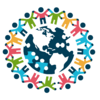

Breaking News

Crafting The Future: An Inside Look at Marshalls High School in Los Angeles

Inclusive Relationship Meaning: Understanding the Concept

How to Get Out of School Excuses

Best Homeschool Curriculum for Autism: A Comprehensive Guide for Parents and Educators

Exciting Research Topics for Middle Schoolers to Fuel Curiosity

Working on the phonological skills by teaching phonemic awareness to the advanced level

What is the goal when de escalating crisis behavior at school ?

Middle school is a time of burgeoning curiosity and the perfect opportunity for students to engage in research that not only educates them academically but also cultivates skills for the future. By encouraging young learners to explore topics they are passionate about, educators and parents play a pivotal role in their intellectual development and the growth of their intrinsic motivation. This blog post outlines a diverse range of research topics suited to the inquiring minds of middle school students, giving them the freedom to deepen their understanding of various subjects while honing critical thinking and independent study skills.
Uncovering the Mysteries of History
Middle schoolers often find history fascinating, particularly when learning about the past from distinct perspectives. Here are some intriguing historical research topics to consider:
- The Unsung Heroes of the Civil Rights Movement: Apart from the well-known leaders, students can explore the contributions of lesser-known figures who played a significant role in the struggle for equality.
- The Impact of Ancient Civilizations on Modern Society: Researching the ways in which the Greeks, Romans, Egyptians, or other ancient societies have influenced contemporary culture, politics, and technology offers a broad canvas for exploration.
- Everyday Life in Different Historical Periods: Focusing on the routines, customs, and technologies that shaped people’s daily lives in times gone by can provide valuable insights into societal norms and individual experiences.
Science and the Natural World
The sciences are a playground of wonder, with an infinity of topics waiting to be explored. Here are some research ideas that can nurture a love for discovery and experimentation:
- Climate Change: Effects and Solutions: Investigating the causes and potential solutions to this global challenge can make students aware of their role in protecting the planet.
- The Wonders of the Solar System: Encouraging a study of the planets, their moons, and the vast expanse of space they inhabit can ignite dreams of interstellar exploration.
- Biodiversity and Ecosystem Conservation: Researching the variety of life on Earth and strategies to protect and sustain ecosystems can foster a sense of environmental stewardship.
Literature, Language, and Creative Expression
Language and literature are potent forms of human expression, allowing students to explore complex ideas and emotions. Here are some topics that bridge the gap between art and academia:
- Interpreting Classic Literature for Modern Relevance: Encouraging the study of timeless works can lead to discussions on their contemporary significance and the evolution of societal values.
- The Structure and Evolution of Language: Investigating the origins and changes in language over time can be a rich area of study, especially when paired with the examination of cultural shifts.
- The Intersection of Art and Literature: Exploring how visual arts and writing intersect to convey messages and emotions can be a fertile ground for interdisciplinary research.
Mathematics and Logic Puzzles
The precision and patterns found in mathematics can be both satisfying and thought-provoking. Middle school students often enjoy the thrill of solving problems and unraveling puzzles. Here are some mathematical research topics that can engage students’ analytical minds:
- Famous Mathematical Conjectures: Researching unsolved problems, such as the Goldbach conjecture or the Riemann hypothesis, can introduce students to the excitement of open questions in mathematics.
- The Application of Math in Various Industries: Investigating how mathematical principles underpin fields like music, art, sports, and technology can illuminate the subject’s real-world utility.
- The History of Mathematical Discoveries: Tracing the lineage of mathematical concepts through different cultures and periods can showcase the universality and timelessness of mathematics.
Social Sciences and Human Interaction
Studying human behavior and society can help students develop empathy and a deeper understanding of the world around them. Here are some social science research ideas to explore:
- The Impact of Social Media on Friendships and Relationships: Research could focus on positive and negative effects, trends, and the future of social interaction.
- Cultural Traditions and Their Meanings: Investigating the origins and contemporary significance of customs from various cultures can foster respect for diversity and a global perspective.
- The Psychology of Decision Making: Exploring the factors that influence human choices, from cognitive biases to social pressures, can provide insights into individual and collective behavior.
Technology and Innovation

Middle schoolers are often tech-savvy and interested in the latest gadgets and advancements. Here are some technology and innovation research topics to tap into that curiosity:
- The Impact of Gaming on Society: Research could examine how video games influence education, social issues, or even career choices.
- Emerging Technologies and Their Ethical Implications: Encouraging students to study technologies like artificial intelligence, gene editing, or wearable tech can lead to discussions on the ethical considerations of their use and development.
- Inventions That Changed the World: Chronicling the history and influence of significant inventions, from the wheel to the internet, can provide a lens through which to view human progress.
By providing middle schoolers with the opportunity to conduct meaningful research in a topic of their choosing, we not only deepen their education but also equip them with the skills and passion for a lifetime of learning. This list is just the beginning; the key is to foster curiosity and guide young minds toward engaging, challenging, and diverse research experiences. Through such explorations, we empower the next generation to think critically, communicate effectively, and, most importantly, to nurture their innate curiosity about the world.
Implementing Research Projects in the Classroom
Encouraging middle school students to undertake research projects requires a strategic approach to ensure sustained interest and meaningful outcomes. Here are some methods educators can employ:
- Mentorship and Support: Pairing students with teacher mentors who can guide them through the research process, provide feedback, and encourage critical thinking is essential for a fruitful research experience.
- Cross-Curricular Integration: Linking research topics to content from different subjects helps students appreciate the interconnectedness of knowledge and develop versatile learning skills.
- Use of Technology and Media: Incorporating digital tools for research, presentation, and collaboration can enhance engagement and teach essential 21st-century skills.
- Presentation and Reflection: Allocating time for students to present their findings nurtures communication skills and confidence, while self-reflection activities help them internalize their learning journey.
These strategies can create a robust framework within which students can pursue their curiosities, leading to a more personalized and impactful educational experience.
What is a good topic to research for middle school?
A good topic for middle school research could delve into the Role of Robotics in the Future of Society . Students can explore how robotics may transform jobs, healthcare, and everyday life. They can examine the balance between automation and human work, predict how robots could augment human abilities, and discuss the ethical dimensions of a robotic future. This inquiry not only captivates the imagination but also encourages critical thinking about technology’s impact on tomorrow’s world.
What are the 10 research titles examples?
- The Evolution of Renewable Energy and Its Future Prospects
- Investigating the Effects of Microplastics on Marine Ecosystems
- The Influence of Ancient Civilizations on Modern Democracy
- Understanding Black Holes: Unveiling the Mysteries of the Cosmos
- The Impact of Augmented Reality on Education and Training
- Climate Change and Its Consequences on Coastal Cities
- The Psychological Effects of Social Media on Teenagers
- Genetic Engineering: The Possibilities and Pitfalls
- Smart Cities: How Technology is Shaping Urban Living
- The Role of Nanotechnology in Medicine: Current Applications and Future Potential
Fascinating Facts About Middle School Research Topics
- Interdisciplinary Impact : Research projects in middle school often blend subjects, such as the integration of art and mathematics when exploring patterns and symmetry, which helps students discover the interconnectivity of different fields of knowledge.
- Skill Building : Engaging in research equips middle schoolers with advanced skills in critical thinking, problem-solving, and time management, which are beneficial across their academic journey and beyond.
- Diversity in Content : Middle school research topics are notably diverse, ranging from examining the role of robotics in society to exploring the psychological effects of social media, catering to a wide array of student interests and strengths.
- Tech Savvy Learning : Technology-based research topics, such as the influence of smart cities or the impact of augmented reality in education, are deeply relevant to tech-savvy middle school students, making learning more engaging and relatable.
- Cultural Relevance : Researching topics like cultural traditions and their meanings encourages middle schoolers to develop a global perspective and fosters a deeper understanding and appreciation for the diversity within their own school community and the world at large.
You May Also Like

More From Author

+ There are no comments
Cancel reply.
Save my name, email, and website in this browser for the next time I comment.

You May Also Like:


- Services Paper editing services Paper proofreading Business papers Philosophy papers Write my paper Term papers for sale Term paper help Academic term papers Buy research papers College writing services Paper writing help Student papers Original term papers Research paper help Nursing papers for sale Psychology papers Economics papers Medical papers Blog

206 Middle School Research Topics: Original Ideas List
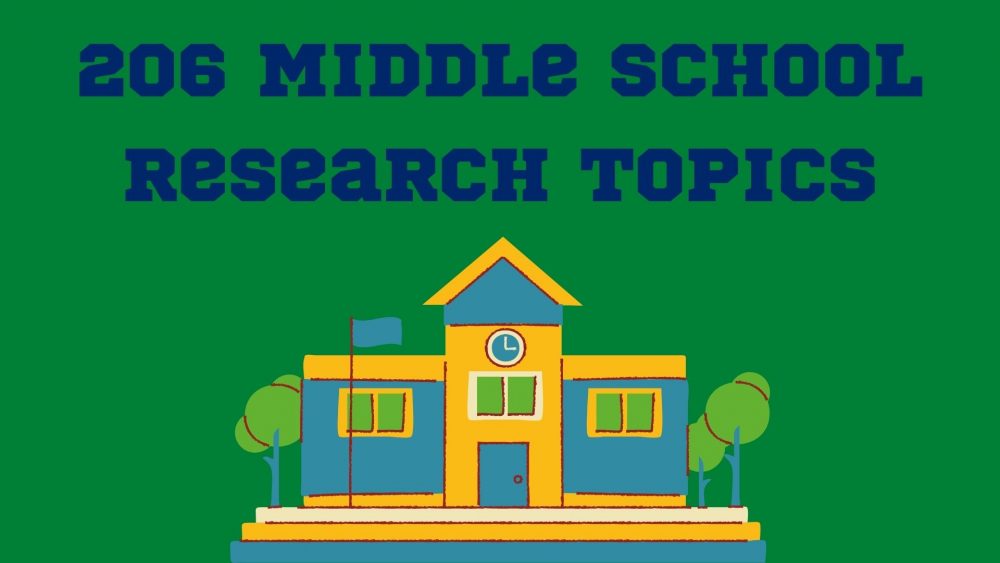
As middle schoolers prepare to go to high school, they are introduced slowly to essay and research writing. They are sometimes given homework that involves picking suitable topics and writing on them. However, it should be noted that i t is not easy to write a research paper for a high grade. Middle schoolers in their preteen age are taught how to be creative, air out their opinions and conduct little research. It helps make them critical thinkers and prepares them for more writing tasks as they advance in their education. This article will help middle schoolers understand what is expected of them when asked to write an essay or research on a topic. It will also expose them to different areas where they can write and many research topics for middle school they can pick from.
What Should Be In A Middle School Research Paper?
Middle school research papers are often not required to be extended. They are in a unique position where they move from writing simple pieces to more detailed essays and research papers. This is the foundation where they learn to write excellent papers as they transcend to high school and eventually college. Writing an essay in middle school is not very different from writing in other stages. Some steps to get you started are
- Understanding the Assignment :Before you begin, you should understand your teacher’s expectations when turning in your finished work.There will be rules and procedures to follow. Know the format the essay is supposed to be written in, and keep the due dates in mind. If you do not understand any aspect of the assignment, please ask for clarification, as this will help you deliver a clear and concise essay at the end.
- Do Your Pre-Writing :Start with brainstorming on middle school research topics to determine what you would like your essay to be about. There are many options to pick from and several general subjects to break down into topics you want.
Pick up to three topics when you first brainstorm. From there, you can select the best one to write on. When you find a topic, start writing all you know about it. Create a rough paper where you jot down information from your research that will be useful in your essay. Feel free to write freely, as this will be your first draft, and you have the chance to edit it as you go.
- Edit Your Work : Editing is essential. It helps give your paper structure. From your rough work, take out parts that are not necessary and add details you think you missed. This is where you should be detailed and try to make your work as neat and correct as possible. You are almost at the end of writing the paper.When you are sure your paper is good, it is time to proofread. Check for spelling and punctuation errors. One expert way to do this is to read the report from the bottom up, and this can help you spot any spelling errors.
- Citations and References : Your teacher would have given you a format to write references for your work. Ensure that you are following the prescribed format.References will highlight the sources of the information gathered to make your essay.
What Can Middle Schoolers Write About?
There are many general subjects that middle schoolers can write about in their assignments. Streaming from what they have been taught in the classroom or their experiences outside class. Some issues that can create good middle school research paper topics include:
Science : This broad aspect covers earth science, geology, physical science, life science, and genetics. Science research paper topics for middle school will encourage the students to be interested in growth and learning how things work. Social Studies : This will involve learning about their history, other people’s cultures, human interaction, family, etc. This will create fun research topics for 6th graders, learning about life and how relationships work. Literature : This is the best time to learn about books and works of art. The literature will provide many topics to research for middle school students.
There are many more aspects that middle school students can research and write papers on. Discover more than 200 interesting research topics for middle school students below. However don’t worry if the assignment seems too difficult for you. You are only at the beginning of the path and our cheap research writing service will be happy to get you through with your paper.
Good Research Topics For Middle School
Students who have no experience writing papers and are looking for good research topics to work on are in luck. The topics below are suitable for all middle schoolers and can create detailed essays.
- Should students be compelled to wear a specific uniform?
- Textbooks or tablets: which is better to read from?
- Obesity in American youth: Causes and solutions.
- Should boys and girls be allowed to play on the same athletics team?
- Should young people be allowed to play violent video games?
- Impact of continuously playing violent video games.
- When can we say someone is spending too much time in front of the screen?
- Listening to music during class: Does it disturb concentration?
- How to recognize harmful content on the internet?
- Should all businesses be compelled to recycle?
- What is the appropriate punishment for students who engage in cyberbullying?
- Should school hours be adjusted to later in the morning?
- Should our scientists be allowed to test drugs on animals?
- Why do people’s behavior change in different settings?
- Is sex education important?
- Different types of poetry and how they came about.
- What to do if you are being bullied on the internet.
- How to have healthy self-esteem.
- Why does the human body need sleep?
- Insect repellents, are they helpful?
- Why did dinosaurs go extinct?
- What is skateboarding?
- The effects of tobacco on the body.
- Artificial tanning: Risks and benefits.
- What is spam email? Where does it come from, and how can we stop it?
- What is a desert mirage? How does it affect people?
- What are penguins? Where do they stay, and what do they eat?
- When and how was America created?
- Who are some well know and inspirational women?
- Who are some famous inventors?
- What famous inventions helped in shaping human existence?
- Steps you can take to protect yourself from scammers online.
- What is a cryptocurrency, and why is it so popular?
- What did the invention of the mobile phone do to change the world?
- How to handle stress from school.
- How can issues in the family affect a child?
- Is your school working hard enough to prevent bullying?
- Should we use mobile phones and tablets in class?
- Does technology make you smarter?
- What is an unhealthy life, and what are the effects?
- Is there any benefit of doing homework?
- What is video game addiction, and how to stop it?
- What is a museum, and what can be found in it?
- What can we do to reduce climate change?
- Is soda suitable for children?
- Does everyone have to go to college?
- Comparing homework and class assignments.
- What is physical education?
- How the internet has changed our life
- What is peer pressure?
- What effect has global warming had on the environment?
- What is racism?
- What is a healthy diet?
- Should students be able to pick what they learn?
- Do movies depict what happens in real life?
- Is arts a vital part of the school curriculum?
- What are the challenges students face?
- How do we conserve energy in our homes?
- What is pop culture?
- Should parents monitor their children’s social media?
Fun Research Topics for Middle School
Writing an essay shouldn’t always be stressful or tedious. These topics will make writing papers fun. The topics below can hold the researcher’s attention for a long time as they work on completing their project.
- How should celebrities who break the law be punished?
- What is bulletproof clothing made of?
- All there is to know about hip-hop.
- What do we know about ninjas?
- Do lie detector tests work?
- What are the ingredients contained in a hotdog?
- Sharks, how do they hunt, and what do they eat?
- How do search engines work?
- Some fascinating extinct animals, and what happened to them?
- How to manage time effectively.
- How does insufficient sleep affect the brain?
- How to let go of bad habits?
- How do parents help us grow?
- How to become a better writer.
- Are dogs and cats enemies?
- Why do parents punish children for bad behavior?
- What is the best punishment for naughty kids?
- Is magic real?
- How to save money effectively?
- What is self-development?
- How to motivate yourself to be a better student?
- When should you begin to earn money?
- What’s the secret of having a successful life?
- How not to become a game addict.
Middle School Research Project Ideas
Research shouldn’t always end as essay writing. Sometimes, you need hands-on projects to keep the middle schooler busy. The list below can serve as an ideal hub for research ideas for middle school students and work as interesting essay topics.
- Investigating what life is like inside a beehive.
- Steps in creating a movie.
- How do our brains store memories and retrieve them when we need them?
- What is a landform?
- What are some important holidays around the world, and who celebrates them?
- What are some significant symbols used in world holidays?
- Creating an ecosystem: what’s the process involved?
- Research on some exotic underwater creatures.
- What is a meteor?
- How to build a crossword puzzle.
- What is advertising: create a short advertisement campaign.
- Write the story of your life.
- Create a calendar highlighting critical events in your life.
- Create your family tree.
Science Research Topics for Middle School
Science is an exciting part of our lives. Because of science, the quality of our lives has increased, and there are many more inventions to come. These topics can engage the curious mind of the youngster and introduce them to science-related subjects to work on.
- Earthquakes: Its causes and effects.
- Computer viruses. What are they, and how do they spread?
- Evolution of human beings.
- Are human beings still evolving?
- What is alchemy?
- What is a black hole? How is it formed?
- What is a submarine? Who uses them, and how do they work?
- What is the cause of tornadoes?
- What is a sinkhole, and how do they form?
- Research on one of the planets in the solar system.
- Understanding glaciers and icebergs.
- What are volcanoes, and how do they form?
- The different types of volcanoes and what causes them.
- Who are the most famous scientists, and what are they famous for?
- What are the components of airplanes that make them fly?
- What are fossils, and what do they teach us?
- How do genetics and DNA affect how we look?
- Why does the moon change color and shape sometimes?
- What is a Lunar eclipse?
- What is pollution?
- The different types of pollution and what can be done to curb them?
- Can fruits play a part in medicine?
- What is flooding?
- What is an ecosystem?
- What measures do butterflies take to defend themselves?
- Different types of butterflies.
- What is a skeleton, and why is it an essential part of the body?
- How many bones are in a skeleton? Which are the most important?
- Who is a marine biologist?
- What is the connection between a marine biologist and the weather?
- What are the risks marine biologists face when they dive?
- Different types of fossils?
- Are whales still hunted?
- What is scientific research, and who conducts it?
- What is the job of the nervous system?
- Understanding the concept of hibernation?
- What are the necessities plants need to grow?
- Who are the people who study dinosaurs?
- Mammals and reptiles: Similarities and differences.
- Why don’t human beings float?
- What is a prism, and what does it do?
- What gives humans the ability to lift heavy things?
- What factors can cause earthquakes?
- How is wind measured?
- What differentiates a planet from a star?
- What is a galaxy? What galaxy is the earth?
- Who is an astronaut, and what is their job?
- What is a waterfall?
- Do plants drink water?
- Why do oil and water not mix?
- What is microbiology?
- How can we preserve our natural resources?
- Discuss the advantages and disadvantages of exploring space.
- What are bacteria, and how useful is it to humans?
- The similarities between temperature and heat.
Other Topics to Research for Middle School
We cannot run out of topics for middle schoolers, as several aspects are available to look at. Here are some other topics that can jump-start your essay writing process.
- Is it advisable for students to be with their cell phones all day?
- Should the minimum age for getting a driving license be raised?
- The differences between homeschooling and standard schooling: which is better?
- Does social media have a positive or negative impact on teenagers?
- Going vegan, is it good for your health?
- Who is a Monk, and what is his lifestyle/routine?
- How did humans domesticate cats and dogs, and why?
- How is America helping endangered animals?
- How is climate change affecting us?
- What are the effects of video games on teenagers and children?
- Do Athletes make good models?
- Who is to blame for the number of homeless people in America?
- Should we have shorter school weeks?
- Should parents monitor websites visited by their children?
- What is cybercrime?
- What can we don’t protect our environment?
- Instant messaging, do they affect literacy?
- What are the most effective ways of achieving academic excellence?
- What is a good movie that influenced us in 2023?
- Are tests a good way of judging a student’s intelligence?
- How does music help us feel better?
- How to choose the best research project ideas for middle school students.
- Why is it important to learn multiple languages?
- Do learning techniques affect behavior?
- Bullying and its effects on mental health.
- All you need to know about distant learning
- Should prayer be part of school activities?
- Do we need math formulas in real scenarios?
- When should students start undergoing leadership training?
- How to write a good essay.
- How does night vision work?
- What is the solar system?
- What is Nasa, and what do they do?
- What is a natural disaster, and what can cause one to happen?
- What is the process of becoming a president of the United States?
- How many presidents has the United States had?
- What are some of the responsibilities and privileges of the president?
- Learning about Vice Presidents and First Ladies of the United States.
- Is social media dangerous for children?
- Does the location where you grow up affect who you become?
- What is a participation trophy? Is it necessary?
- Should there be a screen time limit for children?
- What are the responsibilities of a government to its citizens?
- What is a curfew, and why do kids have them?
- Is grounding an effective punishment?
- Should physical education be necessary for everyone?
- What are some advantages of knowing how to read?
- How can cell phones be used productively while in class?
- What are the qualities of a good leader?
- What are hobbies, and what do they do for us?
- Should less homework be given to students?
- What is summer school? Does it help students?
- What age is appropriate for children to be left alone at home?
If You Need Paper Writing Help
There are many ways to brainstorm ideas for your middle school homework. The research project ideas for middle school and the topics listed above will make it easier to begin. After picking a suitable topic, the next step is writing the entire paper. This will involve a lot of research and fact-finding to get accurate information for your paper. It doesn’t end at research, as you still have to write a great essay to score high marks. This could be a daunting task for many students. Don’t be afraid to get research paper help from our professional writers. After attending class, you may not have adequate time to write your essay yourself, if this is your situation, it’s okay to search for help on the internet. A quick google search for “write my paper” will result in several websites promising to write the best essay for you. However, you need to make your research before hiring an online writer for your assignment. If you need someone to write your assignment, we can be of help. We provide fast, reliable, custom paper writing services that can be completed online. Our services are available to every student, including university, middle school, high school, and college students. Our team of writers consists of professionals and teachers who are always available to ensure that you meet your deadlines. Contact us with a message “ do my research paper for me ” and enjoy the perfect result!

Leave a Reply Cancel reply
Your email address will not be published. Required fields are marked *
Save my name, email, and website in this browser for the next time I comment.
Terms & Conditions Loyalty Program Privacy Policy Money-Back Policy
Copyright © 2013-2024 MyPaperDone.com

Exploring Exciting Research Topics for Middle School Students
Are you searching for the best research topics for middle school? If yes, then your search ends here with the best ever research topics for middle school.
Research is an essential aspect of learning, and it is never too early to introduce it to students. Middle school is an excellent time for students to start learning how to conduct research and develop critical thinking skills. By engaging in research projects, students can explore various topics in-depth and develop a deeper understanding of them.
Additionally, research projects can help students develop crucial skills such as time management, organization, and communication. This guide will provide examples of research topics for middle school students and offer tips on how to identify research topics and access scholarly sources. With this guide, students can discover the exciting world of research and the many benefits it offers.
Importance of research topics for middle school students
Table of Contents
Have a close look at the importance of research topics for middle school students.
Develop critical thinking skills
Research topics encourage students to analyze information, think critically about issues and topics, and make informed decisions. This helps them develop their ability to assess evidence and draw conclusions.
Enhance academic skills
Research projects help students develop essential academic skills such as reading, writing, and critical thinking. These skills are critical for success in high school, college, and beyond.
Prepare for high school and beyond
Research projects prepare students for the more in-depth research assignments they will encounter in high school and beyond. It also prepares them for the rigors of college-level research.
Foster creativity
Research projects can provide students with opportunities to explore creative ways of presenting information and engaging with their topic. This can include using technology, art, or multimedia presentations to showcase their findings.
Encourage curiosity
Research projects can encourage students to ask questions, investigate, and discover new information about topics that interest them. This helps them develop a love of learning and become lifelong learners.
Develop time management skills
Research projects require planning and organization, and can help students develop time management skills. This prepares them for managing their time and workload in high school, college, and beyond.
Promote collaboration
Research projects can be done individually or in groups, allowing students to collaborate, share ideas, and learn from one another. This helps them develop teamwork skills and learn to appreciate diverse perspectives.
Increase engagement
Research topics that are relevant and interesting to students can increase engagement and motivation in learning. This can help students become more invested in their education and develop a deeper understanding of the topic.
Improve communication skills
Research projects can help students develop communication skills, such as presenting findings and participating in discussions. This helps them become better communicators and prepares them for future academic and professional pursuits.
Encourage lifelong learning
Research projects can foster a love of learning and encourage students to continue exploring new topics throughout their lives. It helps them develop a sense of intellectual curiosity and a desire for continued personal growth.
Benefits of engaging in research projects
Have a close look at the benefits of engaging in research projects.
Enhances critical thinking skills
Research projects not only require students to gather information but also to analyze, synthesize, and evaluate it from various sources. These skills are essential for developing critical thinking skills, which are crucial for academic and real-life situations.
Promotes problem-solving skills
By engaging in research projects, students learn to identify problems, develop hypotheses, and test them. Through this process, they acquire problem-solving skills, which are essential for academic success and life beyond school.
Develops creativity
Research projects often require students to think outside the box and come up with innovative solutions. This encourages creativity, which is a valuable skill for success in many areas of life, from science to the arts.
Improves communication skills
Research projects often require students to present their findings in written or oral form, which helps improve their communication skills. The ability to communicate effectively is crucial for academic and professional success.
Boosts confidence
Successfully completing a research project can give students a sense of accomplishment and boost their confidence in their abilities. This, in turn, can lead to greater motivation and engagement in learning.
Provides hands-on learning experiences
Research projects allow students to apply what they have learned in the classroom to real-world situations, providing hands-on learning experiences. This can help students connect what they learn in school to the world around them.
Encourages independent learning
Research projects require students to work independently and take ownership of their learning, which encourages self-directed learning. This is a valuable skill that can help students become lifelong learners.
Builds research skills
Engaging in research projects helps students build research skills, such as conducting literature reviews, designing research studies, and analyzing data. These skills are essential for success in college and many careers.
Prepares for college and career
Research projects provide valuable experience that can prepare students for college and careers that require research and critical thinking skills. These skills are highly valued by colleges and employers.
Fosters a love of learning
Engaging in research projects can foster a love of learning and curiosity about the world around us. This can lead to a lifelong passion for learning and exploration.
Research Topics for Middle School
Have a close look at research topics for middle school.
STEM Research Topics
Here are some STEM research topics that middle school students can explore:
- Renewable energy sources and their impact on the environment
- The effects of pollution on local ecosystems
- Investigating the properties of different types of soils
- Building and testing a simple machine or robot
- The effects of different types of fertilizers on plant growth
- The relationship between exercise and heart rate
- The chemistry of food preservation
- The physics of roller coasters and amusement park rides
- Investigating the efficiency of different types of insulation materials
- The effects of music on the brain and body
How to Identify a STEM Research Topic
Have a close look at how to identify a stem research topic.
Identify your interests
Think about what subjects interest you in STEM, such as biology, chemistry, physics, engineering, or computer science.
Explore current events
Look at recent news articles or scientific journals to see what topics are currently being researched and discussed in STEM fields.
Consider problems and challenges
Think about problems or challenges in the world that could be addressed with STEM research, such as climate change, renewable energy, or medical advancements.
Brainstorm ideas
Write down any ideas that come to mind based on your interests and the topics you have explored. Consider how you could approach these topics from a STEM perspective.
Research existing studies
Look at existing research studies in your area of interest to see what has already been done and what gaps still exist that you could explore.
Consult with experts
Seek guidance from teachers, professors, or professionals in STEM fields to help you identify potential research topics and provide resources.
By following these steps, you can identify a STEM research topic that aligns with your interests and has the potential to contribute to the field.
Benefits of STEM Research Projects
Engaging in STEM research projects can offer a variety of benefits for middle school students, including:
Development of critical thinking skills
STEM research projects require students to analyze data, identify patterns, and draw conclusions, which enhances their critical thinking abilities.
Hands-on learning experiences
STEM research projects provide opportunities for students to apply what they have learned in the classroom to real-world situations, which offers hands-on learning experiences.
Preparation for future careers
STEM research projects can prepare students for careers in science, technology, engineering, and math, as they develop skills relevant to these fields.
Fostering creativity
STEM research projects often require students to think outside the box and come up with innovative solutions, which fosters creativity.
Development of research skills
Engaging in STEM research projects helps students build research skills, such as designing experiments, collecting and analyzing data, and drawing conclusions.
Collaboration
STEM research projects can be done individually or in groups, allowing students to collaborate, share ideas, and learn from one another.
Improvement of communication skills
STEM research projects often require students to present their findings in written or oral form, which helps improve their communication skills.
Boosting self-confidence
Successfully completing a STEM research project can give students a sense of accomplishment and boost their self-confidence in their abilities.
Encouragement of lifelong learning
STEM research projects can foster a love of learning and encourage students to continue exploring new topics throughout their lives.
Social Science Research Topics
Examples of social science research topics for middle school students:
- The impact of social media on mental health.
- Gender inequality in education and the workplace.
- The effects of poverty on child development.
- The relationship between stress and physical health.
- The role of parenting styles in child behavior.
- The effects of bullying on mental health and social relationships.
- The impact of immigration policies on families.
- The influence of media on body image and self-esteem.
- The relationship between personality and academic achievement.
- The effects of technology on social relationships.
How to identify a social science research topic:
To identify a social science research topic, you can follow these steps:
Identify a broad area of interest
Begin by thinking about the general field of social science that interests you the most. This could be psychology, sociology, anthropology, economics, political science, or any other related field.
Narrow down the focus
Once you have identified a broad area of interest, narrow down your focus to a specific topic or issue within that field. For example, if you are interested in psychology, you might focus on a specific mental health condition or treatment.
Consider current events
Look at current events or issues that are receiving a lot of attention in the news or media. Consider how you can apply social science research methods to study these topics in more depth.
Talk to your teachers, professors, or other experts in the field to get ideas for research topics. They may be able to provide you with valuable insights and suggestions.
Conduct a literature review
Conducting a literature review involves reading published research studies, articles, and books related to your topic. This will help you understand what research has already been done in the field and identify any gaps or areas that need further exploration.
Refine your research question
Once you have identified a topic of interest, refine your research question by making it more specific and focused. This will help you to develop a clear research plan and stay on track during your project.
Benefits of social science research projects
Have a close look the benefits of social science research topics.
Improved critical thinking skills
Social science research projects require students to analyze and evaluate information from various sources, which helps develop their critical thinking skills.
Enhance problem-solving skills
Through research, students can identify problems and find solutions by gathering and analyzing data, developing hypotheses, and testing them.
Develop empathy
Social science research projects often require students to explore topics related to human behavior and interactions, which can help them develop empathy and understanding for others.
Foster a love of learning
Engaging in social science research projects can foster a love of learning and curiosity about the world around us.
Develop research skills
Social science research projects allow students to develop important research skills such as conducting literature reviews, designing research studies, and analyzing data.
Enhance communication skills
Social science research projects often require students to present their findings in written or oral form, which can help improve their communication skills.
Promote civic engagement
Social science research projects can encourage students to become active and engaged citizens by exploring issues related to society and government.
Expand cultural awareness
Social science research projects can help students understand and appreciate different cultures, beliefs , and perspectives.
Prepare for college and career
Social science research projects provide valuable experience that can prepare students for college and careers that require research, critical thinking, and communication skills.
Humanities Research Topics
Examples of humanities research topics for middle school students:
- The impact of art and music on society
- The history and cultural significance of traditional dress
- The role of religion in shaping world events
- The influence of ancient civilizations on modern society
- The significance of oral history in preserving cultural traditions
- The portrayal of gender roles in literature and media
- The impact of social media on interpersonal communication
- The role of government in promoting human rights
- The significance of historical landmarks in shaping national identity
- The portrayal of mental health in literature and media.
How to identify a humanities research topic
Have a close look at how to identify a humanities research topics.
Brainstorm topics
Begin by brainstorming ideas that interest you or your students. This can include topics related to literature, history, art, philosophy, or culture.
Narrow down the ideas
Once you have a list of potential topics, start narrowing them down by considering the available resources, the level of complexity, and the relevance to current events or personal interests.
Conduct preliminary research on the narrowed-down topics to ensure that there is enough information available and that the topic is suitable for a research project.
Consider different perspectives
Humanities topics often involve multiple perspectives and interpretations, so it’s essential to consider different viewpoints and debates related to the topic.
Consult with teachers or librarians
Ask for input from teachers or librarians who specialize in humanities subjects. They may have ideas for topics, recommended resources, or can help guide students towards a suitable topic.
Refine the topic
Once a suitable topic has been identified, refine it further by clarifying the research question, determining the scope of the project, and outlining the research methodology.
Benefits of humanities research projects
Have a close look at the benefits of humanities research projects.
Developing critical thinking skills
Humanities research projects require students to analyze information, form opinions, and develop arguments, which helps them to think critically.
Enhancing creativity
Humanities research projects often require students to think creatively about how they present their findings and engage with their topic.
Improving communication skills
Humanities research projects often involve written or oral presentations, which help students to develop their communication skills.
Encouraging curiosity
Humanities research projects can encourage students to ask questions and explore new topics, fostering their curiosity.
Developing empathy
Humanities research projects often involve examining different perspectives and cultures, which can help students to develop empathy and understanding for others.
Preparing for higher education
Humanities research projects provide students with valuable research skills and a foundation for more advanced research projects in high school and college.
Increasing engagement
Research topics that are relevant and interesting to students can increase engagement and motivation in learning.
Encouraging lifelong learning
Humanities research projects can foster a love of learning and encourage students to continue exploring new topics throughout their lives.
Interdisciplinary Research Topics
Examples of interdisciplinary research topics for middle school students:
- How does climate change affect biodiversity?
- The impact of technology on society and culture.
- The role of music in mental health.
- How do food and nutrition affect brain development and academic performance?
- The history and science of flight.
- How does social media influence body image and self-esteem?
- The connection between art and science in creating visual illusions.
- The impact of sports on physical and mental health.
- The psychology and biology of addiction.
- The history and science of ancient civilizations.
How to identify an interdisciplinary research topic
Have a close look at how to identify an interdisciplinary research topic.
Look for common themes or issues
Think about topics that overlap between different subjects. For example, climate change is a topic that can be explored in science, social studies, and literature.
Identify the questions
Once you have identified a common theme or issue, think about the questions that arise from it. What do you want to learn or investigate about this topic?
When exploring interdisciplinary topics, it’s important to consider different perspectives from different subjects. For example, if you’re researching climate change, you might want to explore the scientific causes and effects, the social and economic impacts, and the ethical and moral considerations.
Brainstorm possible connections
Consider how the different subjects you’re interested in can connect to the topic you want to explore. For example, if you’re interested in exploring the history of music, you might look at how different historical events influenced music and how music, in turn, influenced history.
Refine your topic
Once you have some possible connections, refine your topic by focusing on a specific aspect or question. This will help you narrow your focus and make your research more manageable.
If you’re having trouble identifying an interdisciplinary research topic, consider consulting with your teachers or librarians. They may be able to offer guidance or suggest resources that can help you identify a topic.
Benefits of interdisciplinary research projects
Have a close look at the benefits of interdisciplinary research projects.
Encouraging creativity and innovation
Interdisciplinary research topics often require students to approach problems from different angles and find creative solutions by combining knowledge from different fields.
Enhancing critical thinking and problem-solving skills
Interdisciplinary research requires students to analyze and synthesize information from various sources, think critically, and solve complex problems.
Promoting collaboration and teamwork
Interdisciplinary research often involves working in teams, which fosters collaboration, communication, and teamwork skills.
Providing a broader perspective
Interdisciplinary research allows students to gain a more comprehensive understanding of a topic by examining it from multiple perspectives.
Developing research skills
Interdisciplinary research projects help students develop research skills, such as conducting literature reviews, collecting and analyzing data, and presenting findings.
Preparing for future academic and career opportunities
Interdisciplinary research projects provide students with valuable experience and skills that can prepare them for future academic and career opportunities that require interdisciplinary approaches.
Resources for Conducting Research
There are various resources available for middle school students to conduct research. Here are some examples:
School Library
The school library is a great resource for finding books, academic journals, and other resources on a wide range of topics. Librarians can also provide guidance on how to find and evaluate sources.
Online Databases
There are several online databases that provide access to academic journals, magazines, and other scholarly sources. Examples include JSTOR, Project MUSE, and Academic Search Premier.
Google Scholar
Google Scholar is a search engine that allows you to find scholarly articles, books, and conference papers. It can be a useful tool for finding academic sources on specific topics.
Public Library
Public libraries also offer access to a wide range of resources, including books, databases, and other materials. They may also offer research assistance and guidance.
Government Websites
Government websites can be a great resource for research on topics such as history, social studies, and science. Examples include the Library of Congress, the National Archives, and the National Science Foundation.
Online Archives
Many organizations and institutions maintain online archives of historical documents, images, and other resources. Examples include the Smithsonian Institution, the National Archives, and the Digital Public Library of America.
Interviews and Surveys
Conducting interviews and surveys can be a valuable way to gather information for research projects. This can involve reaching out to experts in a particular field or surveying individuals to gather data.
Online Learning Platforms
Online learning platforms, such as Coursera and edX, offer courses on a wide range of topics. These courses often provide access to readings, videos, and other resources that can be useful for research projects.
How to access scholarly sources
Accessing scholarly sources can be done through various means, including:
Using academic search engines
There are several academic search engines available that provide access to scholarly sources. Some popular examples include Google Scholar, JSTOR, and PubMed. These search engines allow users to search for academic articles, journals, and other research papers.
Using academic databases
Many universities and libraries offer access to academic databases, such as EBSCO and ProQuest, which contain a vast collection of scholarly sources. Students can check with their school or local library to see if they have access to such databases.
Checking library catalogs
Most libraries have a catalog that contains information about the books and other materials they have available. Students can use these catalogs to search for scholarly sources, such as books, journals, and other publications.
Contacting experts
Students can contact experts in their field of study or a related field to ask for recommendations for scholarly sources. Experts may be able to suggest relevant academic articles, books, or other resources.
Using interlibrary loan services
If a student cannot find a specific scholarly source at their own library, they can use interlibrary loan services to request the material from another library. This service allows libraries to share materials with one another, giving students access to a wider range of scholarly sources.
It is important to note that some scholarly sources may require payment or subscription access. However, many sources are available for free or can be accessed through a library’s subscription.
In conclusion, research projects provide middle school students with an opportunity to explore various subjects in depth, develop their critical thinking skills, and gain a better understanding of the world around them.
STEM, social sciences, humanities, and interdisciplinary research topics offer a broad range of options for students to choose from, and there are various resources available for conducting research, including online databases and access to scholarly sources.
By engaging in research projects, students can improve their academic performance, enhance their problem-solving abilities, and gain valuable experience that will benefit them in the future.
Therefore, we encourage all middle school students to take advantage of these opportunities and engage in research projects that interest them.
Frequently Asked Questions
What is the purpose of research topics for middle school students.
The purpose of research topics for middle school students is to encourage students to explore their interests, develop critical thinking skills, and learn how to conduct research. It also helps them to understand the importance of research in various fields and how it can contribute to solving real-world problems.
How do I choose a research topic for middle school?
Choosing a research topic for middle school involves identifying your interests, brainstorming ideas, and considering the resources available to you. You can start by thinking about a subject that you are curious about or passionate about, and then narrowing down your focus to a specific aspect or question you want to investigate.
What are some tips for conducting research as a middle school student?
Some tips for conducting research as a middle school student include developing a research question, finding reliable sources, taking thorough notes, organizing your information, and citing your sources properly. It’s also important to plan your time wisely and seek help from teachers or librarians if you need assistance.
Can middle school students access scholarly sources online?
Yes, many scholarly sources are available online and can be accessed by middle school students through databases provided by their school or public libraries. Some popular databases for middle school students include JSTOR, ProQuest, and EBSCOhost.
How can research projects benefit middle school students in the long term?
Research projects can benefit middle school students in the long term by developing important skills such as critical thinking, problem-solving, communication, and time management. It also prepares them for future academic endeavors, and exposes them to potential career paths or fields of interest.
Similar Articles

How To Do Homework Fast – 11 Tips To Do Homework Fast
Homework is one of the most important parts that have to be done by students. It has been around for…

How to Write an Assignment Introduction – 6 Best Tips
In essence, the writing tasks in academic tenure students are an integral part of any curriculum. Whether in high school,…
Leave a Comment Cancel Reply
Your email address will not be published. Required fields are marked *
This site uses Akismet to reduce spam. Learn how your comment data is processed .
- Chess (Gr. 1-4)
- TV (Gr. 1-4)
- Metal Detectors (Gr. 2-6)
- Tetris (Gr. 2-6)
- Seat Belts (Gr. 2-6)
- The Coliseum (Gr. 2-6)
- The Pony Express (Gr. 2-6)
- Wintertime (Gr. 2-6)
- Reading (Gr. 3-7)
- Black Friday (Gr. 3-7)
- Hummingbirds (Gr. 3-7)
- Worst Game Ever? (Gr. 4-8)
- Carnivorous Plants (Gr. 4-8)
- Google (Gr. 4-8)
- Honey Badgers (Gr. 4-8)
- Hyperinflation (Gr. 4-8)
- Koko (Gr. 4-8)
- Mongooses (Gr. 5-9)
- Trampolines (Gr. 5-9)
- Garbage (Gr. 5-9)
- Maginot Line (Gr. 5-9)
- Asian Carp (Gr. 5-9)
- Tale of Two Countries (Gr. 6-10)
- Kevlar (Gr. 7-10)
- Tigers (Gr. 7-11)
- Statue of Liberty (Gr. 8-10)
- Submarines (Gr. 8-12)
- Castles (Gr. 9-13)
- Gutenberg (Gr. 9-13)
- Author's Purpose Practice 1
- Author's Purpose Practice 2
- Author's Purpose Practice 3
- Fact and Opinion Practice 1
- Fact and Opinion Practice 2
- Fact and Opinion Practice 3
- Idioms Practice Test 1
- Idioms Practice Test 2
- Figurative Language Practice 1
- Figurative Language Practice 2
- Figurative Language Practice 3
- Figurative Language Practice 4
- Figurative Language Practice 5
- Figurative Language Practice 6
- Figurative Language Practice 7
- Figurative Language Practice 8
- Figurative Language Practice 9
- Figurative Language of Edgar Allan Poe
- Figurative Language of O. Henry
- Figurative Language of Shakespeare
- Genre Practice 1
- Genre Practice 2
- Genre Practice 3
- Genre Practice 4
- Genre Practice 5
- Genre Practice 6
- Genre Practice 7
- Genre Practice 8
- Genre Practice 9
- Genre Practice 10
- Irony Practice 1
- Irony Practice 2
- Irony Practice 3
- Making Inferences Practice 1
- Making Inferences Practice 2
- Making Inferences Practice 3
- Making Inferences Practice 4
- Making Inferences Practice 5
- Main Idea Practice 1
- Main Idea Practice 2
- Point of View Practice 1
- Point of View Practice 2
- Text Structure Practice 1
- Text Structure Practice 2
- Text Structure Practice 3
- Text Structure Practice 4
- Text Structure Practice 5
- Story Structure Practice 1
- Story Structure Practice 2
- Story Structure Practice 3
- Author's Purpose
- Characterizations
- Context Clues
- Fact and Opinion
- Figurative Language
- Grammar and Language Arts
- Poetic Devices
- Point of View
- Predictions
- Reading Comprehension
- Story Structure
- Summarizing
- Text Structure
- Character Traits
- Common Core Aligned Unit Plans
- Teacher Point of View
- Teaching Theme
- Patterns of Organization
- Project Ideas
- Reading Activities
- How to Write Narrative Essays
- How to Write Persuasive Essays
- Narrative Essay Assignments
- Narrative Essay Topics
- Persuasive Essay Topics
- Research Paper Topics
- Rubrics for Writing Assignments
- Learn About Sentence Structure
- Grammar Worksheets
- Noun Worksheets
- Parts of Speech Worksheets
- Punctuation Worksheets
- Sentence Structure Worksheets
- Verbs and Gerunds
- Examples of Allitertion
- Examples of Hyperbole
- Examples of Onomatopoeia
- Examples of Metaphor
- Examples of Personification
- Examples of Simile
- Figurative Language Activities
- Figurative Language Examples
- Figurative Language Poems
- Figurative Language Worksheets
- Learn About Figurative Language
- Learn About Poetic Devices
- Idiom Worksheets
- Online Figurative Language Tests
- Onomatopoeia Worksheets
- Personification Worksheets
- Poetic Devices Activities
- Poetic Devices Worksheets
- About This Site
- Privacy Policy
- Terms of Use
- Understanding CCSS Standards
- What's New?
Ereading Worksheets
Free reading worksheets, activities, and lesson plans., site navigation.
- Learn About Author’s Purpose
- Author’s Purpose Quizzes
- Character Types Worksheets and Lessons
- List of Character Traits
- Differentiated Reading Instruction Worksheets and Activities
- Fact and Opinion Worksheets
- Irony Worksheets
- Animal Farm Worksheets
- Literary Conflicts Lesson and Review
- New Home Page Test
- Lord of the Flies Chapter 2 Worksheet
- Lord of the Flies Chapter 5 Worksheet
- Lord of the Flies Chapter 6 Worksheet
- Lord of the Flies Chapter 10 Worksheet
- Narrative of the Life of Frederick Douglass
- Sister Carrie
- The Count of Monte Cristo
- The Odyssey
- The War of the Worlds
- The Wizard of Oz
- Mood Worksheets
- Context Clues Worksheets
- Inferences Worksheets
- Main Idea Worksheets
- Making Predictions Worksheets
- Nonfiction Passages and Functional Texts
- Setting Worksheets
- Summarizing Worksheets and Activities
- Short Stories with Questions
- Story Structure Activities
- Story Structure Worksheets
- Tone Worksheets
- Types of Conflict Worksheets
- Reading Games
- Figurative Language Poems with Questions
- Hyperbole and Understatement Worksheets
- Simile and Metaphor Worksheets
- Simile Worksheets
- Hyperbole Examples
- Metaphor Examples
- Personification Examples
- Simile Examples
- Understatement Examples
- Idiom Worksheets and Tests
- Poetic Devices Worksheets & Activities
- Alliteration Examples
- Allusion Examples
- Onomatopoeia Examples
- Onomatopoeia Worksheets and Activities
- Genre Worksheets
- Genre Activities
- Capitalization Worksheets, Lessons, and Tests
- Contractions Worksheets and Activities
- Double Negative Worksheets
- Homophones & Word Choice Worksheets
- ‘Was’ or ‘Were’
- Simple Subjects & Predicates Worksheets
- Subjects, Predicates, and Objects
- Clauses and Phrases
- Type of Sentences Worksheets
- Sentence Structure Activities
- Comma Worksheets and Activities
- Semicolon Worksheets
- End Mark Worksheets
- Noun Worksheets, Lessons, and Tests
- Verb Worksheets and Activities
- Pronoun Worksheets, Lessons, and Tests
- Adverbs & Adjectives Worksheets, Lessons, & Tests
- Preposition Worksheets and Activities
- Conjunctions Worksheets and Activities
- Interjections Worksheets
- Parts of Speech Activities
- Verb Tense Activities
- Past Tense Worksheets
- Present Tense Worksheets
- Future Tense Worksheets
- Point of View Activities
- Point of View Worksheets
- Teaching Point of View
- Cause and Effect Example Paragraphs
- Chronological Order
- Compare and Contrast
- Order of Importance
- Problem and Solution
- Text Structure Worksheets
- Text Structure Activities
- Essay Writing Rubrics
- Narrative Essay Topics and Story Ideas
- Narrative Essay Worksheets & Writing Assignments
- Persuasive Essay and Speech Topics
- Persuasive Essay Worksheets & Activities
- Writing Narrative Essays and Short Stories
- Writing Persuasive Essays
- All Reading Worksheets
- Understanding Common Core State Standards
- Remote Learning Resources for Covid-19 School Closures
- What’s New?
- Ereading Worksheets | Legacy Versions
- Online Figurative Language Practice
- Online Genre Practice Tests
- Online Point of View Practice Tests
- 62 School Project Ideas
- 2nd Grade Reading Worksheets
- 3rd Grade Reading Worksheets
- 4th Grade Reading Worksheets
- 5th Grade Reading Worksheets
- 6th Grade Reading Worksheets
- 7th Grade Reading Worksheets
- 8th Grade Reading Worksheets
- 9th Grade Reading Worksheets
- 10th Grade Reading Worksheets
- Membership Billing
- Membership Cancel
- Membership Checkout
- Membership Confirmation
- Membership Invoice
- Membership Levels
- Your Profile
Want Updates?
101 research paper topics.
- Why do we sleep ?
- How do GPS systems work?
- Who was the first person to reach the North Pole ?
- Did anybody ever escape Alcatraz ?
- What was life like for a gladiator ?
- What are the effects of prolonged steroid use on the human body?
- What happened during the Salem witch trials ?
- Are there any effective means of repelling insects ?
- How did trains and railroads change life in America?
- What may have occurred during the Roswell UFO incident of 1947?
- How is bulletproof clothing made?
- What Olympic events were practiced in ancient Greece?
- What are the major theories explaining the disappearance of the dinosaurs ?
- How was the skateboard invented and how has it changed over the years?
- How did the long bow contribute to English military dominance?
- What caused the stock market crash of 2008?
- How did Cleopatra come to power in Egypt what did she do during her reign?
- How has airport security intensified since September 11 th , 2001?
- What is life like inside of a beehive ?
- Where did hip hop originate and who were its founders?
- What makes the platypus a unique and interesting mammal?
- How does tobacco use affect the human body?
- How do computer viruses spread and in what ways do they affect computers?
- What is daily life like for a Buddhist monk ?
- What are the origins of the conflict in Darfur ?
- How did gunpowder change warfare?
- In what ways do Wal-Mart stores affect local economies?
- How were cats and dogs domesticated and for what purposes?
- What do historians know about ninjas ?
- How has the music industry been affected by the internet and digital downloading?
- What were the circumstances surrounding the death of Osama Bin Laden ?
- What was the women’s suffrage movement and how did it change America?
- What efforts are being taken to protect endangered wildlife ?
- How much does the war on drugs cost Americans each year?
- How is text messaging affecting teen literacy?
- Are humans still evolving ?
- What technologies are available to home owners to help them conserve energy ?
- How have oil spills affected the planet and what steps are being taken to prevent them?
- What was the Magna Carta and how did it change England?
- What is the curse of the pharaohs?
- Why was Socrates executed?
- What nonlethal weapons are used by police to subdue rioters?
- How does the prison population in America compare to other nations?
- How did ancient sailors navigate the globe?
- Can gamblers ever acquire a statistical advantage over the house in casino games?
- What is alchemy and how has it been attempted?
- How are black holes formed?
- How was the assassination of Abraham Lincoln plotted and executed?
- Do the benefits of vaccination outweigh the risks?
- How do submarines work?
- Do lie detector tests accurately determine truthful statements?
- How did Cold War tension affect the US and the world?
- What happened to the lost settlers at Roanoke ?
- How does a hybrid car save energy?
- What ingredients can be found inside of a hotdog ?
- How did Julius Caesar affect Rome?
- What are some common sleep disorders and how are they treated?
- How did the Freedom Riders change society?
- How is internet censorship used in China and around the world?
- What was the code of the Bushido and how did it affect samurai warriors ?
- What are the risks of artificial tanning or prolonged exposure to the sun?
- What programs are available to help war veterans get back into society?
- What steps are involved in creating a movie or television show?
- How have the film and music industries dealt with piracy ?
- How did Joan of Arc change history?
- What responsibilities do secret service agents have?
- How does a shark hunt?
- What dangers and hardships did Lewis and Clark face when exploring the Midwest?
- Has the Patriot Act prevented or stopped terrorist acts in America?
- Do states that allow citizens to carry guns have higher or lower crime rates?
- How are the Great Depression and the Great Recession similar and different?
- What are the dangers of scuba diving and underwater exploration?
- How does the human brain store and retrieve memories ?
- What was the Manhattan Project and what impact did it have on the world?
- How does stealth technology shield aircraft from radar?
- What causes tornadoes ?
- Why did Martin Luther protest against the Catholic Church?
- How does a search engine work?
- What are the current capabilities and future goals of genetic engineers ?
- How did the Roman Empire fall?
- What obstacles faced scientists in breaking the sound barrier ?
- How did the black plague affect Europe?
- What happened to Amelia Earhart ?
- What are the dangers and hazards of using nuclear power ?
- How did Genghis Khan conquer Persia?
- What architectural marvels were found in Tenochtitlan, capital of the Aztec Empire ?
- From where does spam email come and can we stop it?
- How does night vision work?
- How did journalists influence US war efforts in Vietnam ?
- What are the benefits and hazards of medical marijuana ?
- What causes desert mirages and how do they affect wanderers?
- What was the cultural significance of the first moon landing ?
- What are sinkholes and how are they formed?
- Have any psychics ever solved crimes or prevented them from occurring?
- Who is Vlad the Impaler and what is his connection to Count Dracula ?
- What are the risks of climate change and global warming ?
- What treatments are available to people infected with HIV and are they effective?
- Who was a greater inventor, Leonardo di Vinci or Thomas Edison ?
- How are the Chinese and American economies similar and different?
- Why was communism unsuccessful in so many countries?
- In what ways do video games affect children and teenagers?

923 Comments
I like using this website when I assist kids with learning as a lot of these topics are quickly covered in the school systems. Thankyou
Mackenah Nicole Molina
Wow! I always have trouble deiciding what to do a research project on but this list has totally solved that. Now my only problem is choosing what idea on this list I should do first!
Most of these my teacher rejected because apparently ‘these aren’t grade level topics, and I doubt they interest you”
I’m sorry to hear that. Sounds like you will have a potentially valuable character-building experience in the short-term.
Edwin Augusto Galindo Cuba
THIS SITE IS AWESOME, THERE ARE LOTS OF TOPICS TO LEARN AND MASTER OUR SKILLS!
research kid
I need one about animals, please. I have been challenged to a animal research project, Due Friday. I have no clue what to research! somebody help, thanks for reading!
You can do one on bats
For international studies you can do Defense and Security.
This was very helpful.
Research on Ben Franklin? I think THAT will get a real charge out of everyone (hehehehegetit)
Mandy Maher
“Is it possible to colonize Mars?”
maddy burney
these are silly topics
thx for making this real.
more gaming questions!!!!!!
Is it still considered stealing if you don’t get caught?
Yes, yes it is still considered stealing.
I need topics on memes
Mary Nnamani
Please I need project topics on Language Literature
Marcella Vallarino
I would appreciate a list of survey questions for middle school grades 6-8
I need a research topics about public sector management
I NEED FIVE EXAMPLES EACH ON QUALITATIVE AND QUANTITATIVE RESEARCH (EDUCATION, HEALTH, TECHNOLOGY, ECONOMY AND ENGINEERING)
publish research that are interesting please……
hey can you do one on the burmiueda triangle
Anybody know video games effect kids,and,teens. There Fun!!
they’re
I need a topic about woman history if any of u can find 1 please that would be great!
You could research about the history of the astronauts, and of human past (WWI, WWII, etc.)
so about women? Manitoba Women Win the Right to Vote in Municipal Elections, The First Women, January 23, 1849: Elizabeth Blackwell becomes the first woman to graduate from medical school and become a doctor in the United States, Rosa Parks Civil Rights Equal Pay. I have way more. so if you need more just ask.
communism is good
what are you a communist?!?!
Did FDR know about the upcoming attack on Pearl Harbor on 07 DEC 1941.
do you know how babies are born
Christine Singu
kindly assist with a research topic in the field of accounting or auditing
need more about US army
Please can yiu give me a topic in education
I think one should be how can music/Video games can affect the life for people
or How Do Video Games Affect Teenagers?
zimbabwe leader
I think a good topic is supporting the confederate flag!
Need a research topic within the context of students union government and dues payments
do more weird ones plz
joyce alcantara
Hi pls po can you give me a topic relate for humanities pls thank u.
Leave a Reply Cancel reply
Your email address will not be published. Required fields are marked *
Subscribe Now
Popular content.
- Author's Purpose Worksheets
- Characterization Worksheets
- Common Core Lesson and Unit Plans
- Online Reading Practice Tests
- Plot Worksheets
- Reading Comprehension Worksheets
- Summary Worksheets
- Theme Worksheets
New and Updated Pages
- Capitalization Worksheets
- Contractions Worksheets
- Double Negatives Worksheets
- Homophones & Word Choice Worksheets
BECOME A MEMBER!
Final Summer I 2024 Application Deadline is June 2, 2024.
Click here to apply.

Featured Posts

10 AI Project Ideas for High School Students

The Warner Bros. Reach Honorship Program — Should You Apply?

10 Free Summer Programs for High School Students in NYC (New York City)

Is Applying to Tech Flex Leaders Worth It?

8 Awesome Biology Articles for High School Students

8 Medical Camps for Middle School Students

10 Graphic Design Internships for High School Students

10 Art History Summer Programs for High School Students

Everything You Need To Know About College Tours as a High School Student

MITE at UT Austin- Is it Worth it?
10 Research Opportunities for Middle School Students
If you're aiming to lay a strong foundation for your academic journey, starting early can make all the difference. Engaging in research-based programs during these formative years can ignite a passion for learning, shape future interests, and set the stage for success in high school and beyond.
That's why we've curated a list of ten research opportunities for middle school students which offer a chance to delve into diverse fields of study, from science and technology to mathematics and beyond. Many of them provide financial aid and scholarships as well.
1. Lumiere Junior Explorer Program
The Lumiere Junior Explorer Program is an 8-week program for middle school students to work one-on-one with a mentor to explore their academic interests and build a project they are passionate about . Our mentors are scholars from top research universities such as Harvard, MIT, Stanford, Yale, Duke and LSE .
During this program, spanning weeks 1 to 4, participants will delve into four distinct topics within their selected track. In weeks 5 to 6, the focus intensifies as participants embark on a deep dive into one specific topic area and finally, weeks 7 to 8 are dedicated to project implementation, with participants receiving guidance and support from their mentors as they bring their projects to life.
You can find the application form here.
Location: Fully Virtual
Dates: Multiple cohorts throughout the year
Cost: $1990
Age requirements: Grade 6 - 8
Deadline: Multiple rolling deadlines for JEP cohorts across the year, you can apply using this application link ! If you'd like to take a look at the cohorts + deadlines for 2024, you can refer to this page!
2. Junior Scientist Training Program at Scripps Research
Throughout the process of designing and executing a research project, students will acquire invaluable practical skills. They will have the opportunity to participate in laboratory tours and engage in various STEM activities . By the end of the week, students will showcase their findings to their peers through presentations. Additionally, participants will receive a certificate of completion from Scripps Research, recognizing their successful participation in the program.
To begin the application process for the Junior Scientist Training Program for your middle school child or children, the first step is to create a login using your personal information. After completing the login process, you'll have the opportunity to register your child and any additional middle school children through the provided link .
Location : La Jolla, California
Dates : TBD
Cost : $300
Age requirements : Rising 6-8th graders
Deadline : Rolling, registration ends on May 13th.
3. Summer Teen Research Program
The Lawrence program at UC Berkeley is a unique research opportunity for middle school students to explore the wonders of science firsthand!
This one-week research program offers immersive experiences, hands-on experiments, and exciting campus tours designed to spark curiosity and ignite a passion for STEM . With engaging lab sessions, interactions with faculty and students, and exposure to diverse STEM career paths, The Lawrence program provides a dynamic learning environment where students can thrive and grow.
There are four programs available for middle school students. All these programs have a research component in them.
Body Systems and Biomedical Innovations
Coding and Engineering Nano-Satellites
Solar Energy and Electrical Engineering
Designing and Engineering Bridges
Note: Optional Residential Add-on can only be purchased in conjunction with a daytime Teen Research Program offered during the same week. Additionally financial aid is available for this program.
Find the registration link here.
Location : UC Berkeley Campus
Dates : Sunday, June 23, at 4:00 p.m. and ends Friday, June 28, at 5:00 p.m.
Age requirements : Rising 7th-9th graders
Deadline : May 15th, 2024.
4. Sounds of New York City (SONYC)
The SONYC program is an innovative platform designed to ignite and enrich students' passion for science, technology, engineering, and mathematics (STEM). Through a dynamic curriculum crafted to delve deep into the realms of engineering, physical and computer sciences, as well as natural phenomena such as waves and sound, SONYC fosters a profound understanding and appreciation for these disciplines.
This program is about active engagement and exploration where students delve into the research work of intricate workings of microcontrollers, sensors, and various hardware components, unravel the mysteries of circuitry, electronics, and coding, and gain invaluable insights into how scientists and engineers apply fundamental principles to tackle real-world challenges.
To apply, submit the online application which includes questions about your personal and academic history and two short essay responses. Find the application link here.
Note : Students who live in New York City are only eligible. Students should also have a strong academic record and demonstrated interest in science.
Location : New York University
Dates : July 8 - August 4 Orientation: June 28 (via Zoom 1:00 - 4:00 PM ET)
Cost : Full Scholarship
Age requirements : 12- 14 years.
Deadline : April, 14th.
5. Science of Smart Cities (SoSC)
The School of Sustainable Cities (SoSC) is a three-week education program where students get invaluable opportunities to research about the developments in energy, engineering, computer science, and urban/environmental science.
The program's focus on research extends across various disciplines, from understanding the intricacies of energy systems to analyzing the impact of urbanization on the environment. Students have access to state-of-the-art facilities and resources, enabling them to conduct experiments, gather data, and draw informed conclusions.
Students are encouraged to ask questions, challenge assumptions, and pursue their interests through independent research projects. SoSC also emphasizes the importance of community-engaged research, where students collaborate with local organizations and stakeholders to address pressing issues facing their communities.
To apply, submit the online application which includes questions about your personal and academic history and two short essay responses.
Dates : July 8 - August 2 Orientation: June 28 (via Zoom 1:00 PM - 4:00 PM ET)
6. Science and Technology Entry Program(STEP)
NYU's Science and Technology Entry Program (STEP), where students embark on a journey of research and discovery. L ed by NYU faculty and students, STEP offers immersive STEM courses, research opportunities, and mentorship, preparing students for academic and career success. Through STEP, students increase their college readiness and diversity in STEM fields, all while fostering a passion for research and innovation.
Students are afforded the chance to engage in STEM research within an NYU facility, where they receive guidance from faculty and researchers . Subsequently, these students showcase their research outcomes at the yearly STEP State Conference held in Albany, NY.
To apply, complete the online application, which requires you to provide basic information about yourself, your academic history, a transcript or report card, and a 500-word essay that describes your interest in STEM.
Dates : July 5-August 4
Cost : $350
Age requirements : 6th -8th
Deadline : March 24th.
7. Everyday Engineering
Everyday Engineering is a unique program tailored by Carnegie Mellon University College of Engineering for students in grades 6th through 8th, with a distinct focus on fostering a research-oriented perspective towards engineering. Unlike traditional approaches, this program transcends the boundaries of mere observation by encouraging middle school students to delve deeper into the intricacies of their everyday environments through a research perspective.
Everyday Engineering aims to instill in students a heightened sense of curiosity and a research-driven mindset. Through exploration of recognizable examples, exposure to online exhibits, and interaction with CMU engineering students, participants not only gain insight into various engineering disciplines but also learn to approach everyday phenomena through a rigorous research framework.
Please find the registration link here.
Location : Virtual
Dates : February 24th from 10 a.m. - 12 p.m.
Deadline : TBA
8. North Carolina State University's Summer Ventures
North Carolina State University's Summer Ventures in Science and Mathematics is a four-week immersive summer program designed to provide exceptional middle and high school students with advanced learning opportunities in STEM fields.
While primarily targeted at high school students, Summer Ventures also offers research opportunities for outstanding middle school students who demonstrate a strong interest and aptitude in science and mathematics.
The program typically runs for four to five weeks during the summer and takes place on NC State University's campus. Students have the opportunity to work alongside older peers and university professors on research projects in various STEM disciplines, including biology, chemistry, physics, mathematics, computer science, and engineering . These projects may involve conducting experiments, analyzing data, and presenting findings, allowing middle schoolers to gain hands-on experience in scientific inquiry and exploration.
Location : North Carolina State University
Dates : TBA
Cost : None
Age requirements : Middle and high school students
9. Northwestern University's Center for Talent Development's Summer Camp
Northwestern University's Center for Talent Development's Summer Camp is an esteemed initiative designed to provide students with immersive research experiences under the guidance of university faculty mentors.
It engages students in research-oriented learning experiences. Tailored for high-achieving and motivated individuals, these camps offer opportunities to delve into high school, college-level, and pre-professional instruction under the guidance of master teachers and industry leaders .
Participants are exposed to fast-paced, intensive courses that delve into advanced concepts across various disciplines, including math, science, writing, technology, leadership, and service learning. Through rigorous coursework, students are encouraged to grapple with complex problems and develop critical thinking and creative problem-solving skills.
Note: Financial aid is available for the qualified students.
Location : Northwestern University
Dates : June 23 - July 12, 2024 (Other sessions available as well)
Cost : $4650 (Residential camp)
Deadline : June 5th for session 1.
10. California State Summer School for Mathematics and Science (COSMOS)
COSMOS stands as an intensive four-week summer residential Pre-College Program tailored for high school students who showcase a proclivity for academic and professional pursuits within the realm of science, technology, engineering, and mathematics (STEM) subjects.
Catering to motivated and gifted students in grades 8 through 12, COSMOS provides an unparalleled opportunity to collaborate with esteemed faculty, researchers, and scientists within cutting-edge facilities, delving into advanced STEM topics that extend beyond the scope of typical high school courses in California. Through a blend of hands-on activities and laboratory-intensive curricula, COSMOS not only nurtures students' interests and skills but also broadens their awareness of educational and career pathways within STEM fields.
Note: Students apply to ONE of the five University of California’s COSMOS campuses — UC Davis, UC Irvine, UC Los Angeles, UC San Diego, and UC Santa Cruz. Each campus can only accommodate about 160-200 participants. The selection is competitive.
Location : University of California’s COSMOS campuses
Deadline : Feb 9th.
Stephen is one of the founders of Lumiere and a Harvard College graduate. He founded Lumiere as a Ph.D. student at Harvard Business School. Lumiere is a selective research program where students work 1-1 with a research mentor to develop an independent research paper.
- middle school students
Research Topics & Ideas: Education
170+ Research Ideas To Fast-Track Your Project

If you’re just starting out exploring education-related topics for your dissertation, thesis or research project, you’ve come to the right place. In this post, we’ll help kickstart your research topic ideation process by providing a hearty list of research topics and ideas , including examples from actual dissertations and theses..
PS – This is just the start…
We know it’s exciting to run through a list of research topics, but please keep in mind that this list is just a starting point . To develop a suitable education-related research topic, you’ll need to identify a clear and convincing research gap , and a viable plan of action to fill that gap.
If this sounds foreign to you, check out our free research topic webinar that explores how to find and refine a high-quality research topic, from scratch. Alternatively, if you’d like hands-on help, consider our 1-on-1 coaching service .
Overview: Education Research Topics
- How to find a research topic (video)
- List of 50+ education-related research topics/ideas
- List of 120+ level-specific research topics
- Examples of actual dissertation topics in education
- Tips to fast-track your topic ideation (video)
- Free Webinar : Topic Ideation 101
- Where to get extra help
Education-Related Research Topics & Ideas
Below you’ll find a list of education-related research topics and idea kickstarters. These are fairly broad and flexible to various contexts, so keep in mind that you will need to refine them a little. Nevertheless, they should inspire some ideas for your project.
- The impact of school funding on student achievement
- The effects of social and emotional learning on student well-being
- The effects of parental involvement on student behaviour
- The impact of teacher training on student learning
- The impact of classroom design on student learning
- The impact of poverty on education
- The use of student data to inform instruction
- The role of parental involvement in education
- The effects of mindfulness practices in the classroom
- The use of technology in the classroom
- The role of critical thinking in education
- The use of formative and summative assessments in the classroom
- The use of differentiated instruction in the classroom
- The use of gamification in education
- The effects of teacher burnout on student learning
- The impact of school leadership on student achievement
- The effects of teacher diversity on student outcomes
- The role of teacher collaboration in improving student outcomes
- The implementation of blended and online learning
- The effects of teacher accountability on student achievement
- The effects of standardized testing on student learning
- The effects of classroom management on student behaviour
- The effects of school culture on student achievement
- The use of student-centred learning in the classroom
- The impact of teacher-student relationships on student outcomes
- The achievement gap in minority and low-income students
- The use of culturally responsive teaching in the classroom
- The impact of teacher professional development on student learning
- The use of project-based learning in the classroom
- The effects of teacher expectations on student achievement
- The use of adaptive learning technology in the classroom
- The impact of teacher turnover on student learning
- The effects of teacher recruitment and retention on student learning
- The impact of early childhood education on later academic success
- The impact of parental involvement on student engagement
- The use of positive reinforcement in education
- The impact of school climate on student engagement
- The role of STEM education in preparing students for the workforce
- The effects of school choice on student achievement
- The use of technology in the form of online tutoring
Level-Specific Research Topics
Looking for research topics for a specific level of education? We’ve got you covered. Below you can find research topic ideas for primary, secondary and tertiary-level education contexts. Click the relevant level to view the respective list.
Research Topics: Pick An Education Level
Primary education.
- Investigating the effects of peer tutoring on academic achievement in primary school
- Exploring the benefits of mindfulness practices in primary school classrooms
- Examining the effects of different teaching strategies on primary school students’ problem-solving skills
- The use of storytelling as a teaching strategy in primary school literacy instruction
- The role of cultural diversity in promoting tolerance and understanding in primary schools
- The impact of character education programs on moral development in primary school students
- Investigating the use of technology in enhancing primary school mathematics education
- The impact of inclusive curriculum on promoting equity and diversity in primary schools
- The impact of outdoor education programs on environmental awareness in primary school students
- The influence of school climate on student motivation and engagement in primary schools
- Investigating the effects of early literacy interventions on reading comprehension in primary school students
- The impact of parental involvement in school decision-making processes on student achievement in primary schools
- Exploring the benefits of inclusive education for students with special needs in primary schools
- Investigating the effects of teacher-student feedback on academic motivation in primary schools
- The role of technology in developing digital literacy skills in primary school students
- Effective strategies for fostering a growth mindset in primary school students
- Investigating the role of parental support in reducing academic stress in primary school children
- The role of arts education in fostering creativity and self-expression in primary school students
- Examining the effects of early childhood education programs on primary school readiness
- Examining the effects of homework on primary school students’ academic performance
- The role of formative assessment in improving learning outcomes in primary school classrooms
- The impact of teacher-student relationships on academic outcomes in primary school
- Investigating the effects of classroom environment on student behavior and learning outcomes in primary schools
- Investigating the role of creativity and imagination in primary school curriculum
- The impact of nutrition and healthy eating programs on academic performance in primary schools
- The impact of social-emotional learning programs on primary school students’ well-being and academic performance
- The role of parental involvement in academic achievement of primary school children
- Examining the effects of classroom management strategies on student behavior in primary school
- The role of school leadership in creating a positive school climate Exploring the benefits of bilingual education in primary schools
- The effectiveness of project-based learning in developing critical thinking skills in primary school students
- The role of inquiry-based learning in fostering curiosity and critical thinking in primary school students
- The effects of class size on student engagement and achievement in primary schools
- Investigating the effects of recess and physical activity breaks on attention and learning in primary school
- Exploring the benefits of outdoor play in developing gross motor skills in primary school children
- The effects of educational field trips on knowledge retention in primary school students
- Examining the effects of inclusive classroom practices on students’ attitudes towards diversity in primary schools
- The impact of parental involvement in homework on primary school students’ academic achievement
- Investigating the effectiveness of different assessment methods in primary school classrooms
- The influence of physical activity and exercise on cognitive development in primary school children
- Exploring the benefits of cooperative learning in promoting social skills in primary school students
Secondary Education
- Investigating the effects of school discipline policies on student behavior and academic success in secondary education
- The role of social media in enhancing communication and collaboration among secondary school students
- The impact of school leadership on teacher effectiveness and student outcomes in secondary schools
- Investigating the effects of technology integration on teaching and learning in secondary education
- Exploring the benefits of interdisciplinary instruction in promoting critical thinking skills in secondary schools
- The impact of arts education on creativity and self-expression in secondary school students
- The effectiveness of flipped classrooms in promoting student learning in secondary education
- The role of career guidance programs in preparing secondary school students for future employment
- Investigating the effects of student-centered learning approaches on student autonomy and academic success in secondary schools
- The impact of socio-economic factors on educational attainment in secondary education
- Investigating the impact of project-based learning on student engagement and academic achievement in secondary schools
- Investigating the effects of multicultural education on cultural understanding and tolerance in secondary schools
- The influence of standardized testing on teaching practices and student learning in secondary education
- Investigating the effects of classroom management strategies on student behavior and academic engagement in secondary education
- The influence of teacher professional development on instructional practices and student outcomes in secondary schools
- The role of extracurricular activities in promoting holistic development and well-roundedness in secondary school students
- Investigating the effects of blended learning models on student engagement and achievement in secondary education
- The role of physical education in promoting physical health and well-being among secondary school students
- Investigating the effects of gender on academic achievement and career aspirations in secondary education
- Exploring the benefits of multicultural literature in promoting cultural awareness and empathy among secondary school students
- The impact of school counseling services on student mental health and well-being in secondary schools
- Exploring the benefits of vocational education and training in preparing secondary school students for the workforce
- The role of digital literacy in preparing secondary school students for the digital age
- The influence of parental involvement on academic success and well-being of secondary school students
- The impact of social-emotional learning programs on secondary school students’ well-being and academic success
- The role of character education in fostering ethical and responsible behavior in secondary school students
- Examining the effects of digital citizenship education on responsible and ethical technology use among secondary school students
- The impact of parental involvement in school decision-making processes on student outcomes in secondary schools
- The role of educational technology in promoting personalized learning experiences in secondary schools
- The impact of inclusive education on the social and academic outcomes of students with disabilities in secondary schools
- The influence of parental support on academic motivation and achievement in secondary education
- The role of school climate in promoting positive behavior and well-being among secondary school students
- Examining the effects of peer mentoring programs on academic achievement and social-emotional development in secondary schools
- Examining the effects of teacher-student relationships on student motivation and achievement in secondary schools
- Exploring the benefits of service-learning programs in promoting civic engagement among secondary school students
- The impact of educational policies on educational equity and access in secondary education
- Examining the effects of homework on academic achievement and student well-being in secondary education
- Investigating the effects of different assessment methods on student performance in secondary schools
- Examining the effects of single-sex education on academic performance and gender stereotypes in secondary schools
- The role of mentoring programs in supporting the transition from secondary to post-secondary education
Tertiary Education
- The role of student support services in promoting academic success and well-being in higher education
- The impact of internationalization initiatives on students’ intercultural competence and global perspectives in tertiary education
- Investigating the effects of active learning classrooms and learning spaces on student engagement and learning outcomes in tertiary education
- Exploring the benefits of service-learning experiences in fostering civic engagement and social responsibility in higher education
- The influence of learning communities and collaborative learning environments on student academic and social integration in higher education
- Exploring the benefits of undergraduate research experiences in fostering critical thinking and scientific inquiry skills
- Investigating the effects of academic advising and mentoring on student retention and degree completion in higher education
- The role of student engagement and involvement in co-curricular activities on holistic student development in higher education
- The impact of multicultural education on fostering cultural competence and diversity appreciation in higher education
- The role of internships and work-integrated learning experiences in enhancing students’ employability and career outcomes
- Examining the effects of assessment and feedback practices on student learning and academic achievement in tertiary education
- The influence of faculty professional development on instructional practices and student outcomes in tertiary education
- The influence of faculty-student relationships on student success and well-being in tertiary education
- The impact of college transition programs on students’ academic and social adjustment to higher education
- The impact of online learning platforms on student learning outcomes in higher education
- The impact of financial aid and scholarships on access and persistence in higher education
- The influence of student leadership and involvement in extracurricular activities on personal development and campus engagement
- Exploring the benefits of competency-based education in developing job-specific skills in tertiary students
- Examining the effects of flipped classroom models on student learning and retention in higher education
- Exploring the benefits of online collaboration and virtual team projects in developing teamwork skills in tertiary students
- Investigating the effects of diversity and inclusion initiatives on campus climate and student experiences in tertiary education
- The influence of study abroad programs on intercultural competence and global perspectives of college students
- Investigating the effects of peer mentoring and tutoring programs on student retention and academic performance in tertiary education
- Investigating the effectiveness of active learning strategies in promoting student engagement and achievement in tertiary education
- Investigating the effects of blended learning models and hybrid courses on student learning and satisfaction in higher education
- The role of digital literacy and information literacy skills in supporting student success in the digital age
- Investigating the effects of experiential learning opportunities on career readiness and employability of college students
- The impact of e-portfolios on student reflection, self-assessment, and showcasing of learning in higher education
- The role of technology in enhancing collaborative learning experiences in tertiary classrooms
- The impact of research opportunities on undergraduate student engagement and pursuit of advanced degrees
- Examining the effects of competency-based assessment on measuring student learning and achievement in tertiary education
- Examining the effects of interdisciplinary programs and courses on critical thinking and problem-solving skills in college students
- The role of inclusive education and accessibility in promoting equitable learning experiences for diverse student populations
- The role of career counseling and guidance in supporting students’ career decision-making in tertiary education
- The influence of faculty diversity and representation on student success and inclusive learning environments in higher education

Education-Related Dissertations & Theses
While the ideas we’ve presented above are a decent starting point for finding a research topic in education, they are fairly generic and non-specific. So, it helps to look at actual dissertations and theses in the education space to see how this all comes together in practice.
Below, we’ve included a selection of education-related research projects to help refine your thinking. These are actual dissertations and theses, written as part of Master’s and PhD-level programs, so they can provide some useful insight as to what a research topic looks like in practice.
- From Rural to Urban: Education Conditions of Migrant Children in China (Wang, 2019)
- Energy Renovation While Learning English: A Guidebook for Elementary ESL Teachers (Yang, 2019)
- A Reanalyses of Intercorrelational Matrices of Visual and Verbal Learners’ Abilities, Cognitive Styles, and Learning Preferences (Fox, 2020)
- A study of the elementary math program utilized by a mid-Missouri school district (Barabas, 2020)
- Instructor formative assessment practices in virtual learning environments : a posthumanist sociomaterial perspective (Burcks, 2019)
- Higher education students services: a qualitative study of two mid-size universities’ direct exchange programs (Kinde, 2020)
- Exploring editorial leadership : a qualitative study of scholastic journalism advisers teaching leadership in Missouri secondary schools (Lewis, 2020)
- Selling the virtual university: a multimodal discourse analysis of marketing for online learning (Ludwig, 2020)
- Advocacy and accountability in school counselling: assessing the use of data as related to professional self-efficacy (Matthews, 2020)
- The use of an application screening assessment as a predictor of teaching retention at a midwestern, K-12, public school district (Scarbrough, 2020)
- Core values driving sustained elite performance cultures (Beiner, 2020)
- Educative features of upper elementary Eureka math curriculum (Dwiggins, 2020)
- How female principals nurture adult learning opportunities in successful high schools with challenging student demographics (Woodward, 2020)
- The disproportionality of Black Males in Special Education: A Case Study Analysis of Educator Perceptions in a Southeastern Urban High School (McCrae, 2021)
As you can see, these research topics are a lot more focused than the generic topic ideas we presented earlier. So, in order for you to develop a high-quality research topic, you’ll need to get specific and laser-focused on a specific context with specific variables of interest. In the video below, we explore some other important things you’ll need to consider when crafting your research topic.
Get 1-On-1 Help
If you’re still unsure about how to find a quality research topic within education, check out our Research Topic Kickstarter service, which is the perfect starting point for developing a unique, well-justified research topic.

You Might Also Like:

64 Comments
This is an helpful tool 🙏
Special education
Really appreciated by this . It is the best platform for research related items
Research title related to school of students
I think this platform is actually good enough.
Research title related to students
My field is research measurement and evaluation. Need dissertation topics in the field
Assalam o Alaikum I’m a student Bs educational Resarch and evaluation I’m confused to choose My thesis title please help me in choose the thesis title
Good idea I’m going to teach my colleagues
You can find our list of nursing-related research topic ideas here: https://gradcoach.com/research-topics-nursing/
Write on action research topic, using guidance and counseling to address unwanted teenage pregnancy in school
Thanks a lot
I learned a lot from this site, thank you so much!
Thank you for the information.. I would like to request a topic based on school major in social studies
parental involvement and students academic performance
Science education topics?
plz tell me if you got some good topics, im here for finding research topic for masters degree
How about School management and supervision pls.?
Hi i am an Deputy Principal in a primary school. My wish is to srudy foe Master’s degree in Education.Please advice me on which topic can be relevant for me. Thanks.
Every topic proposed above on primary education is a starting point for me. I appreciate immensely the team that has sat down to make a detail of these selected topics just for beginners like us. Be blessed.
Kindly help me with the research questions on the topic” Effects of workplace conflict on the employees’ job performance”. The effects can be applicable in every institution,enterprise or organisation.
Greetings, I am a student majoring in Sociology and minoring in Public Administration. I’m considering any recommended research topic in the field of Sociology.
I’m a student pursuing Mphil in Basic education and I’m considering any recommended research proposal topic in my field of study
Research Defense for students in senior high
Kindly help me with a research topic in educational psychology. Ph.D level. Thank you.
Project-based learning is a teaching/learning type,if well applied in a classroom setting will yield serious positive impact. What can a teacher do to implement this in a disadvantaged zone like “North West Region of Cameroon ( hinterland) where war has brought about prolonged and untold sufferings on the indegins?
I wish to get help on topics of research on educational administration
I wish to get help on topics of research on educational administration PhD level
I am also looking for such type of title
I am a student of undergraduate, doing research on how to use guidance and counseling to address unwanted teenage pregnancy in school
the topics are very good regarding research & education .
Can i request your suggestion topic for my Thesis about Teachers as an OFW. thanx you
Would like to request for suggestions on a topic in Economics of education,PhD level
Would like to request for suggestions on a topic in Economics of education
Hi 👋 I request that you help me with a written research proposal about education the format
Am offering degree in education senior high School Accounting. I want a topic for my project work
l would like to request suggestions on a topic in managing teaching and learning, PhD level (educational leadership and management)
request suggestions on a topic in managing teaching and learning, PhD level (educational leadership and management)
I would to inquire on research topics on Educational psychology, Masters degree
I am PhD student, I am searching my Research topic, It should be innovative,my area of interest is online education,use of technology in education
request suggestion on topic in masters in medical education .
Look at British Library as they keep a copy of all PhDs in the UK Core.ac.uk to access Open University and 6 other university e-archives, pdf downloads mostly available, all free.
May I also ask for a topic based on mathematics education for college teaching, please?
Please I am a masters student of the department of Teacher Education, Faculty of Education Please I am in need of proposed project topics to help with my final year thesis
Am a PhD student in Educational Foundations would like a sociological topic. Thank
please i need a proposed thesis project regardging computer science
Greetings and Regards I am a doctoral student in the field of philosophy of education. I am looking for a new topic for my thesis. Because of my work in the elementary school, I am looking for a topic that is from the field of elementary education and is related to the philosophy of education.
Masters student in the field of curriculum, any ideas of a research topic on low achiever students
In the field of curriculum any ideas of a research topic on deconalization in contextualization of digital teaching and learning through in higher education
Amazing guidelines
I am a graduate with two masters. 1) Master of arts in religious studies and 2) Master in education in foundations of education. I intend to do a Ph.D. on my second master’s, however, I need to bring both masters together through my Ph.D. research. can I do something like, ” The contribution of Philosophy of education for a quality religion education in Kenya”? kindly, assist and be free to suggest a similar topic that will bring together the two masters. thanks in advance
Hi, I am an Early childhood trainer as well as a researcher, I need more support on this topic: The impact of early childhood education on later academic success.
I’m a student in upper level secondary school and I need your support in this research topics: “Impact of incorporating project -based learning in teaching English language skills in secondary schools”.
Although research activities and topics should stem from reflection on one’s practice, I found this site valuable as it effectively addressed many issues we have been experiencing as practitioners.
Submit a Comment Cancel reply
Your email address will not be published. Required fields are marked *
Save my name, email, and website in this browser for the next time I comment.
- Print Friendly
10 creative research topics for students (2024)
Last updated
25 November 2023
Reviewed by
Miroslav Damyanov
Research is a key part of student life, but deciding which topic to research can take time and effort. The right research topic typically aligns with your skills and interests, has current relevance, and can positively impact the world.
In this article, you’ll find some helpful examples to help you get started.
- What is a research topic, and what is it for?
Research topics enable students to drill down into a specific aspect of a subject to broaden their knowledge and share learnings with others. They are typically used to make discoveries or develop fresh viewpoints.
A research topic defines the specific theme that research will be conducted around. It’s essential for providing a key focus for the work to be completed. Ultimately, it defines a core problem or knowledge gap that needs to be solved.
A clear topic helps define what is being studied and how that information will be communicated to others.
- Research topic vs. research question
A research topic is a broad theme of focus that requires further investigation. It’s the project’s overall subject—an aspect of which will be studied.
A research topic example could be “The effects of meditation on stress reduction.”
A research question is a specific inquiry that researchers want to investigate and answer to broaden their knowledge and make new discoveries. Research questions are much more specific, focusing on a very small aspect of the overall topic.
The right research question will specifically set out what is being researched so there is no ambiguity.
Here’s an example of a research question within the topic: “How does meditation impact stress, anxiety, and burnout in the workplace?”
- What makes a good research paper topic?
Here are the characteristics that make some topics more favorable and useful than others:
Clarity: a helpful research topic should be clearly understood to ensure the integrity of the research. It should be clear to the student and mentor/professor what the topic is and how it will be explored.
Originality: answering questions that have already been researched and answered many times before could be a waste of resources. Answering original questions is key to getting the most out of research. This might involve researching topics that have already been covered from a different angle or exploring an entirely new topic.
Relevance: it’s helpful to ensure that a research topic is related to your expertise and your access to resources. This will ensure that the research topic is relevant to you.
Ethical : ethics should always be considered when conducting research. Your research shouldn’t cause physical or mental harm to any participants. You should also consider animal and environmental ethics.
- How can I choose a good topic for my research paper?
With so many topics to choose from, selecting a topic for your research paper can be overwhelming. That’s why it’s a good idea to consider these three points to make the best choice:
1. Lean into personal interest
Being interested and experienced in a particular field will make the research more interesting, relevant, and straightforward to conduct.
Your interest will mean you’re committed and motivated to discover the answer to your research question. Being personally engaged also makes the process more enjoyable.
One caveat to keep in mind is the potential for bias. If you are invested in the research having a particular result, you must ensure it’s accurate, double-checked, and reviewed by an impartial party.
2. Choose a topic with enough information
Your research project might fail if you don’t have access to sufficient information and resources. There needs to be enough information to gain deep insights into the research at hand.
Consider the resources you have within your project limits. If your research has funding, carefully work out what that funding could be used for. If not, you may need to consider research that you’ll be able to complete with access to public records and other free resources.
Timings, finances, access to participants, and publicly accessible information will all need to be considered before choosing the final topic to research.
3. Consider the guidelines
You’ll need to adhere to the specific guidelines that your school, mentor, or professor have laid out. They may request that the topic be related to public interest, a currently challenging topic for the environment, or another parameter.
When considering those guidelines, make ethical considerations. Your school or university is unlikely to permit unethical research.
- How to find research topics to write about
Even though there’s an endless range of topics to research, you might not know where to begin. Starting with background reading, mind mapping, and speaking with mentors can help mold general ideas into useful topics and questions.
Extensive reading: completing background reading of educational databases, journals, and scientific studies can help provide a good working knowledge of what is currently being researched and identify key gaps.
Social problems: current challenges on both a local and global scale can make excellent research questions. Whether it’s investigating climate change, human health, or the impact of pandemics, there’s likely to be large human interest if you research social problems and challenges. The research you conduct may even have a positive impact on the world around you.
Mind mapping: brainstorming different ideas inspired by your background reading and personal interests can lead to ideal research topics. Create a large mind map, whether in a notebook or on a whiteboard, to get all your ideas down on paper. You may be surprised at what unique ideas you come up with.
Speak to mentors: running topics over with your professor or mentor could prove very helpful. They may be able to help you refine your ideas, provide feedback on research questions, and offer useful suggestions to ensure the topic you pick is appropriate.
- The top 10 research topics for students
Here are some of the top 10 research topics and research areas for students. Whether in high school, senior high school, or college, these topics are important and relevant for students today.
You might use these ideas as starting points for your own original research topics and research questions.
1. High school research paper topic ideas
Research topics in high school can promote critical thinking , personal growth, and problem-solving skills.
Some of the most relevant research topics for high schoolers revolve around social and political issues, as those are often core topics within the school curriculum. Also, students are often interested in how they can positively impact the world around them, so topics within social change and social issues are particularly relevant.
The impacts of bullying
Bullying and its impacts are an interesting and relevant topic for high school students. Students may want to consider ways to mitigate bullying or explore whether bullying can affect people long-term.
Some specific research questions within the bullying topic are:
What is the evidence that parental support can alleviate the impact of bullying in schools?
What are the effects of bullying and victimization on short-term mental health?
How can we predict adolescents’ bullying participation and understand the participant roles of bullying in different grades?
Social media in high schools
With social media use prolific in the modern world, students may be particularly interested to learn about how it impacts humans. Students may want to research the effects of different social media types, ways to reduce social media use, or how social media is impacting people around the world.
Some topics within social media could be:
Is there a correlation between social media use and academic performance?
What are the effects of social media use on mental health in people aged 12–18?
How does social media use affect self-esteem in students?
2. Psychology research paper topics
Psychology is a broadly studied topic with many possible avenues for exploration. Whether you’d like to understand how the human brain works, ways to boost mental health, or treatment options in psychology, there are endless options.
Here are some of the top 10 research topics for college students in psychology:
Increasing happiness
Some specific research questions related to happiness include the following:
What are the factors driving the fear of leaning into happiness in American society?
How can practicing vulnerability reduce stress and boost happiness?
What impact does forest bathing have on overall mood scores?
Mitigating anxiety
With 37% of US adults more anxious in 2023 than in 2022, anxiety as a research topic is very relevant.
Below are some example research questions:
How does chronic anxiety impact people’s day-to-day lives?
What is the impact of meditation interventions on anxiety?
Is there data to support physical exercise interventions for anxiety disorders?
3. Science research paper topics
Scientific research covers many study fields. From biology and chemistry to physics and biochemistry, science helps researchers discover critical information about humans and our world.
Here are a few potential topics for exploration:
Reducing pandemic risk
Given the impact of COVID-19, mitigating the risk of a future pandemic is of significant human interest. A student may look at ways to improve pandemic responses, identify future pandemics, boost vaccine adoption, and reduce the spread of misinformation.
Specific research questions include the following:
How can AI help predict future pandemics?
How does animal breeding contribute to zoonotic disease risk?
What are the key ways to identify and control a potential future pandemic before it becomes widespread?
Renewable energy
With climate change and the planet’s health a major concern for many scientists, investigations into more environmentally friendly and renewable energy sources are of great social interest.
Here are some research questions about renewable energy to consider:
What is the economic feasibility of widespread renewable energy use across the US?
How could wind, water, and solar energy reduce global emissions?
What are the core factors preventing the widespread use of renewable energy?
4. Good environmental research topics
Climate change impacts every person on the planet, so it can make an excellent research topic. Particularly for the younger generation, climate change is an interesting and often concerning discussion topic. Gen Z, for example, speaks much more actively about climate change both on and offline.
Climate change on a global scale
Some specific research questions within the climate change topic are:
What is the impact of climate change on biodiversity in the Amazon rainforest?
What impact could the use of solar power have in the US in relation to carbon emissions?
How do carbon dioxide emissions affect ocean acidity levels?
5. Argumentative research paper topics
Setting out a specific argument and exploring the topic can make for interesting research. Argumentative research topics are typically related to human interest, issues that impact us on a global scale, or challenges that particular social groups face.
Affirmative action
With rising interest in equality, researching affirmative action—designed to prevent the impacts of discrimination—is a relevant research topic for high school and college students.
Some specific questions relating to affirmative action could be:
Does affirmative action promote equality in the workplace?
What is the evidence that affirmative action is helpful in university admissions?
How has the affirmative action ban impacted the tech industry?
The ethical use of AI
AI use is expanding rapidly across the globe, so there’s growing interest in its impacts and the need for ethical usage.
Some research questions relating to AI include the following:
Could AI lead to more global conflict?
Can ethical legislation reduce the risk of AI and its implementation?
How many jobs could be impacted by AI in 2025?
6. Human rights paper topics
Human rights impact everyone on the planet, so it’s a topic that’s of continual interest.
Research in this area could cover human rights in the workplace, privacy rights, gender equality, and much more.
International human rights
International human rights is a complex yet critical area of global interest. Human rights help protect people’s freedom and safety around the world.
What are ways to reduce human rights violations in conflict zones?
What is the impact of organizations such as Amnesty International on international human rights?
In what ways can governments enforce human rights globally?
LGBTQI+ rights
With LGBTQI+ issues gaining a brighter spotlight in mainstream media, research into this area can be very beneficial, not just for those impacted by discrimination but for society as a whole.
Here are some potential research questions:
How can gender dysphoria impact transgender and gender-diverse (TGD) adolescents’ mental health and quality of life?
What are ways to boost mental health for those who experience discrimination due to their sexual orientation or gender identity?
How could genderless bathrooms increase access and safety for LGBTQI+ people?
7. US history research paper topics
The US has a vast and interesting history, which forms part of the curriculum in many high schools and colleges. Different aspects of this history can make relevant fields of research, such as the following:
What factors that led to the abolishment of slavery in the US are relevant in politics today?
How did the Founding Fathers shape the US political system, and what can be learned?
Why did the Louisiana Purchase have such a significant impact on US history?
8. Law enforcement research topics
Maintaining law and order in society is highly complex. Exploring how law enforcement can benefit society as a whole can be a rewarding field of study.
Some possible law enforcement topics include the following:
How can data analysis and intelligence-led policing reduce crime?
What is the role of Crisis Intervention Training in policing?
How can data improve the enforcement of cybersecurity laws?
9. Business research paper topics
Business is a broad area of study with many possible directions for research papers. Business drives the economy, providing jobs and industry. It’s the cornerstone of society, so research in this area is always of social interest.
Here are some possible business research topics to consider:
How can data analysis impact consumer purchasing decisions?
What are some of the key dilemmas in ethical business practices?
How can diversity and inclusion be boosted in the workforce?
10. Economics research paper topics
Whether you choose to focus on microeconomics, macroeconomics, or applied fields, economics research can take you in many directions.
Below are some general economics paper topics:
What are the widespread impacts of the gig economy?
How can investing in female-founded businesses impact economies in developing countries?
How does progressive taxation impact income inequality?
It all starts with the right research question
Successful research starts with the right question, regardless of your chosen topic.
Taking time to pose a relevant and clear research question will help you discover new insights, learnings, and evidence.
Research is the very thing that drives human knowledge. Remember, your research might not just impact you but also the world and people around you.
How can I get research ideas?
To come up with research ideas, you might find it helpful to do some background reading, consider current social issues, lean into your skills and interests, and speak to a mentor or professor. Brainstorming and mind mapping can also help.

What is a good research question?
A good research question should be clear, relevant, original, and ethical. You should also have access to the necessary resources to perform the research thoroughly.
How do I create a title for my research topic?
The right title for a research topic is clear and relevant to your field of study. Ideally, it’s an original idea and refers to the specific question you’re posing.
What are some good qualitative research topics?
Qualitative research involves analyzing people’s attitudes, perceptions, and behaviors.
There are qualitative research topics across almost every field of study, including psychology, education, social sciences, human resources, technology, and healthcare.
What qualitative research topics can be good for STEM students?
For STEM (science, technology, engineering, and mathematics) students, qualitative research topics could revolve around social impacts and perceptions of science and technology.
Here are some examples:
How the general population views climate change
The potential social impacts of AI
How to use Big Data ethically
Should you be using a customer insights hub?
Do you want to discover previous research faster?
Do you share your research findings with others?
Do you analyze research data?
Start for free today, add your research, and get to key insights faster
Editor’s picks
Last updated: 13 April 2023
Last updated: 14 February 2024
Last updated: 27 January 2024
Last updated: 18 April 2023
Last updated: 8 February 2023
Last updated: 23 January 2024
Last updated: 30 January 2024
Last updated: 7 February 2023
Last updated: 7 March 2023
Last updated: 18 May 2023
Last updated: 13 May 2024
Latest articles
Related topics, .css-je19u9{-webkit-align-items:flex-end;-webkit-box-align:flex-end;-ms-flex-align:flex-end;align-items:flex-end;display:-webkit-box;display:-webkit-flex;display:-ms-flexbox;display:flex;-webkit-flex-direction:row;-ms-flex-direction:row;flex-direction:row;-webkit-box-flex-wrap:wrap;-webkit-flex-wrap:wrap;-ms-flex-wrap:wrap;flex-wrap:wrap;-webkit-box-pack:center;-ms-flex-pack:center;-webkit-justify-content:center;justify-content:center;row-gap:0;text-align:center;max-width:671px;}@media (max-width: 1079px){.css-je19u9{max-width:400px;}.css-je19u9>span{white-space:pre;}}@media (max-width: 799px){.css-je19u9{max-width:400px;}.css-je19u9>span{white-space:pre;}} decide what to .css-1kiodld{max-height:56px;display:-webkit-box;display:-webkit-flex;display:-ms-flexbox;display:flex;-webkit-align-items:center;-webkit-box-align:center;-ms-flex-align:center;align-items:center;}@media (max-width: 1079px){.css-1kiodld{display:none;}} build next, decide what to build next.

Users report unexpectedly high data usage, especially during streaming sessions.

Users find it hard to navigate from the home page to relevant playlists in the app.

It would be great to have a sleep timer feature, especially for bedtime listening.

I need better filters to find the songs or artists I’m looking for.
- It all starts with the right research question
Log in or sign up
Get started for free
- SAT BootCamp
- SAT MasterClass
- SAT Private Tutoring
- SAT Proctored Practice Test
- ACT Private Tutoring
- Academic Subjects
- College Essay Workshop
- Academic Writing Workshop
- AP English FRQ BootCamp
- 1:1 College Essay Help
- Online Instruction
- Free Resources
500 Good Research Paper Topics
Bonus Material: Essential essay checklist
Writing a research paper for a class and not sure how to start?
One of the most important steps to creating a great paper is finding a good topic!
Here’s a hand-drafted list from a Princeton grad who has helped professors at Harvard and Yale edit their papers for publication and taught college writing at the University of Notre Dame and .
What’s more, we give you some foolproof formulas for creating your own paper topic to fit the requirements of your class.
Using these simple formulas, we’ve helped hundreds of students turn a B- paper topic into an A+ paper topic.
Keep reading for our list of 500 vetted research paper topics and our magic formulas for creating your own topic!
Of course, if you want help learning to write research papers tailored to your individual needs, check out our one-on-one writing coaching or academic writing workshop . Set up a free consultation to see how we can help you learn to write A+ papers!
Jump to paper topics in:
European & Mediterranean History
African history, asian history, history of the pre-columbian americas.
- Latin American History
History of Science
Politics & public policy, education & education policy, political theory, science policy.
- Health Sciences & Psychology

What is a research paper?
In order to write a good research paper, it’s important to know what it is!
In general, we can divide academic writing into three broad categories:
- Analytical: analyze the tools an author uses to make their point
- Research: delve deeply into a research topic and share your findings
- Persuasive : argue a specific and nuanced position backed by evidence
What’s the difference between an analytical paper and a research paper? For an analytical paper, it’s okay to just use one or two sources (a book, poem, work of art, piece of music, etc.) and examine them in detail. For a research paper, however, the expectation is that you do, well . . . research .

The depth of research that you’re expected to do will depend on your age and the type of class you’re taking.
In elementary or middle school, a “research paper” might mean finding information from a few general books or encyclopedias in your school library.
In high school, your teachers might expect you to start using information from academic articles and more specific books. You might use encyclopedias and general works as a starting point, but you’ll be expected to go beyond them and do more work to synthesize information from different perspectives or different types of sources. You may also be expected to do “primary research,” where you study the source material yourself, instead of synthesizing what other people have written about the source material.
In college, you’ll be required to use academic journals and scholarly books, and your professors will now expect that you be more critical of these secondary sources, noticing the methodology and perspectives of whatever articles and books you’re using.
In more advanced college courses, you’ll be expected to do more exhaustive surveys of the existing literature on a topic. You’ll need to conduct primary research that makes an original contribution to the field—the kind that could be published in a journal article itself.
For a walkthrough of the 12 essential steps to writing a good paper, check out our step-by-step guide .

Working on a research paper? Grab our free checklist to make sure your essay has everything it needs to earn an A grade.
Get the essential essay checklist
What makes a good research paper topic?
One of the most important features of a research paper topic is that it has a clear, narrow focus.
For example, your teacher may assign you to write a research paper related to the US Revolutionary War. Does that mean that your topic should be “the US Revolutionary War”?
Definitely not! There’s no way to craft a good paper with in-depth research with such a broad topic. (Unless you’re in elementary or middle school, in which case it’s okay to have a more general topic for your research paper.)
Instead, you need to find a more specific topic within this broader one. There are endless ways that you can make this narrower! Some ideas generated from this one broader topic might be:
- Causes of the US Revolutionary War
- Changes in military strategy during the Revolutionary War
- The experiences of Loyalists to England who remained in the American colonies during the Revolutionary War
- How the Revolutionary War was pivotal for the career of Alexander Hamilton
- The role of alliances with France during the US Revolutionary War
- The experiences of people of color during the Revolutionary War
- How George Washington’s previous military career paved the way for his leadership in the Revolutionary War
- The main types of weaponry during the Revolutionary War
- Changes in clothing and fashion over the courses of the Revolutionary War
- How Valley Forge was a key moment in the Revolutionary War
- How women contributed to the Revolutionary War
- What happened in Amherst, Massachusetts during the Revolutionary War
- Field medicine during the Revolutionary War
- How the Battle of Saratoga was a turning point in the Revolutionary War
- How different opinions about the Revolutionary War were reflected in poetry written during that time
- Debates over abolition during the Revolutionary War
- The importance of supply chains during the Revolutionary War
- Reactions to the US Revolutionary war in Europe
- How the US Revolutionary war impacted political theory in England and France
- Similarities and differences between the US Revolutionary War and the French Revolution
- Famous paintings inspired by the US Revolutionary War
- Different ways that the US Revolutionary War has been depicted in modern contemporary culture
- The appropriation of the “Boston Tea Party” by US politicians in the 2010s
This list could go on forever!

In fact, any of these topics could become even more specific. For example, check out the evolution of this topic:
- Economic causes of the Revolutionary war
- The way that tax policies helped lead to the Revolutionary War
- How tax laws enacted 1763–1775 helped lead to the Revolutionary War
- How the tax-free status of the British East India Company helped lead to the Revolutionary War
- How the 1773 tax-free status of the British East India Company helped lead to the Revolutionary War, as reflected in letters written 1767–1775
- How the 1773 tax-free status of the British East India Company helped lead to the Revolutionary War, as reflected in letters written by members of the Sons of Liberty 1767–1775
As you advance in your educational career, you’ll need to make your topic more and more specific. Steps 1–3 of this topic might be okay in high school, but for a college research paper steps 4–7 would be more appropriate!
As you craft your research paper topic, you should also keep in mind the availability of research materials on your subject. There are millions of topics that would make interesting research papers, but for which you yourself might not be able to investigate with the primary and secondary sources to which you have access.
Access to research materials might look like:
- To the best of our knowledge, the sources exist somewhere
- The source isn’t behind a paywall (or you or your school can pay for it)
- Your school or local library has a copy of the source
- Your school or local library can order a copy of the source for you
- The source is in a language that you speak
- The source has been published already (there’s tons of amazing research that hasn’t been published yet, a frustrating problem!)
- You can access the archive, museum, or database where the primary source is held—this might mean online access or travel! To access a source in an archive or museum you’ll often need permission, which often requires a letter of support from your school.
If you’re not sure about access to source materials, talk to a librarian! They’re professionals for this question.
Finally, pick a research topic that interests you! Given that there are unlimited research topics in the world and many ways to adapt a broad topic, there should absolutely be a way to modify a research topic to fit your interests.

Want help learning to write an amazing research paper? Work one-on-one with an experienced Ivy-League tutor to improve your writing skills or sign up for our bestselling academic writing workshop .
Insider tips to generate your own research paper topic
Use these formulas to generate your own research paper topics:
- How did X change over a period of time (year, decade, century)?
- What is the impact (or consequences) of X?
- What led to X?
- What is the role of X in Y?
- How did X influence Y?
- How did X become Y?
- How was X different from Y?
- How is X an example of Y?
- How did X affect Y?
- What were some reactions to X?
- What are the most effective policies to produce X result?
- What are some risks of X?
- How is our current understanding of X incorrect? (advanced)
- What happens if we look at X through the lens of Y theory or perspective? (advanced)
A good research paper topic often starts with the question words—why, how, what, who, and where. Remember to make it as specific as possible!

Good research paper topics
These research paper topics have been vetted by a Princeton grad and academic book editor!
- How did European rivalries (British vs French) impact North American history?
- What was the role of British and French alliances with indigneous tribes during the Seven Years’ War?
- Reactions to the 1754 Albany Congress among North American intellectual figures
- How the Albany Plan served as a model for future attempts at union among the North American colonies
- How did different religious identities (Calvinist, Catholic, etc.) play a role in the aftermath of the Seven Years’ War?
- What were the consequences of the 1763 Treaty of Paris?
- How did the Seven Years’ War impact British debt and colonial economics?
- What were some causes of the US Revolutionary War?
- How did military strategy change during the Revolutionary War?
- What were the experiences of Loyalists to England who remained in the American colonies during the Revolutionary War?
- How was the Revolutionary War pivotal for the career of Alexander Hamilton?
- What was the role of alliances with France during the US Revolutionary War?
- What were the experiences of people of color during the Revolutionary War?
- How did George Washington’s previous military career pave the way for his leadership in the Revolutionary War?
- What were the main types of weaponry during the Revolutionary War? How did that affect the options for military strategies?
- How did clothing and fashion change over the courses of the Revolutionary War?
- How was Valley Forge a key moment in the Revolutionary War?
- How did women contribute to the Revolutionary War?
- What happened in Amherst, Massachusetts (or any other specific location) during the Revolutionary War?
- What was field medicine like during the Revolutionary War?
- How was the Battle of Saratoga a turning point in the Revolutionary War?
- How were different opinions about the Revolutionary War reflected in poetry written during that time?
- What were the debates over abolition during the Revolutionary War?
- What was the role of supply chains during the Revolutionary War?
- What were reactions to the US Revolutionary war like in Europe? What does that tell us about politics in England, France, the Netherlands, etc?
- How did the US Revolutionary war impact political theory in England and France?
- What are similarities and differences between the US Revolutionary War and the French Revolution?
- What are some famous paintings inspired by the US Revolutionary War? What do differences between these paintings tell us about how the artists who created them saw the war?
- What are some different ways that the US Revolutionary War has been depicted in modern contemporary culture? What does that tell us?
- How was the story of the “Boston Tea Party” appropriated by US politicians in the 2010s, and why?
- What was the difference between the Federalists and the Jeffersonians?
- How did the 1797 XYZ Affair lead to the Quasi-War with France?
- How were loans from European countries and companies (France, Spain, Dutch bankers) key to the early US?
- What were reactions to the Constitutional Convention of 1787?
- Why did the US remain neutral during the French Revolution?
- How did the Alien and Sedition acts contribute to the election of Thomas Jefferson as president?
- What was the US’s reaction to the Haitian revolution? Why did the US not recognize Haitian independence until 1862?
- What were the reactions to John Jay’s Treaty of 1794?
- How have the remarks made by George Washington in his Farewell Address inspired isolationist policies?
- How did interpretations of the Monroe Doctrine change over the decades since its creation?
- How did the Roosevelt Corollary and Lodge Corollary change and expand the Monroe Doctrine?
- How did the presence of US companies like the United Fruit Company affect US military interventions in Latin America?
- How was the Monroe Doctrine invoked in the Cuban Missile Crisis of 1962?
- How was US culture shaped by the Cold War?
- How did ecology play a role in the rise of Ancient Egypt?
- How did water management technologies impact Ancient Egypt?
- How did bureaucracies function in Ancient Egypt?
- How did Egyptian art influence Ancient Greek art?
- Who could be a citizen in Athens in the 5th century BCE? What does this tell us about classical Athenian society?
- What was the impact of the Peloponnesian War?
- What was the impact of Alexander the Great’s attempt to create an empire?
- How does the way that Alexander the Great is represented in art demonstrate conceptions about the relationship between the human and the divine?
- Was there a conception of race in the ancient world? How were these ideas different from our own modern conceptions of race?
- What was the role of debt slavery in the Roman republic? How were these policies ended, and what is the significance of the end of debt slavery? What kinds of slavery remained?
- To what degree does the movie Gladiator accurately the Roman Empire in 176–192 CE?
- What was the role of slavery in managing the large latifundia ?
- How and why did the emperor Constantine I adopt Christianity?
- How did patterns of urbanism in the latter Roman empire change? What does this tell us about challenges being faced at that time?
- What do reactions to the Byzantine empress Theodora tell us about ideas of gender in 6th-century Byzantium?
- How did scientific advancements in Islamic Spain influence the rest of Europe?
- What was the relationship between Muslim, Christian, and Jewish populations in Islamic Spain? How does this compare to the experience of Muslim and Jewish populations in Christian Spain?
- How did medieval troubadour poetry represent a new idea of romantic relationships?
- What are similarities and differences between medieval troubadour poetry and lyric poetry in Ancient Greece?
- What do letters between women and popes tell us about gender, power, and religion in medieval Europe?
- In what ways was Hildegard of Bingen groundbreaking for her time?
- Who produced beer in medieval England, and what does this tell us about society?
- How did the adoption of hops affect the production and distribution of beer?
- How did beer production allow some women a way to be financially independent?
- How was clothing used to mark religious and cultural identities in 15th- and 16th-century Spain?
- How did print culture change relationships and courting in Georgian England?
- How did churches function as social gathering spaces in Georgian England?
- To what degree is Netflix’s Bridgerton series historically accurate?
- How did ideas of love change in the 18th century? How did philosophy play a role in this?
- When were Valentine cards first commercially available? What does that show us about cultural ideas of love and courtship?
- What were the consequences of the desertification of the Sahara?
- How did trade links on the Red Sea influence Nubian culture?
- How did Carthage build power in Northern Africa around 600–500 BCE?
- What was the impact of the Mercenary War (241–238 BCE) in Carthage?
- How did the Roman province of Africa play a key role in financing the Roman Empire?
- What were the consequences of the Donatist division in the 300s in Northern Africa?
- What was the impact of the large-scale movement of Bedouins from the Arabian peninsula into the Maghreb?
- How was Mande society organized in the Mali Empire?
- What was the role of the book trade in Timbuktu? What does this tell us about culture and learning in the Mali Empire?
- How did Aksum use trade to build wealth and power?
- What do Nok terracotta sculptures tell us about Nok culture?
- How did the Luba Empire create a centralized political system? How did the idea of spiritual kins ( balopwe ) play a role in this system?
- How did tax collection work in the Lunda empire?
- What does it mean to say that the Ajuran Empire was a hydraulic empire? How did control over water resources allow the Ajuran Empire to build and consolidate power?
- What is the significance of diplomatic ties between the Somai Ajuran Empire and Ming dynasty China?
- How did the tribute system in the Kingdom of Kongo help to stimulate interregional trade?
- What was the impact of the introduction of maize and cassava to the Kingdom of Kongo?
- How did women wield influence in the Kingdom of Benin?
- How did the Industrial Revolution in Europe help lead to the Scramble for Africa 1878–1898?
- What were the consequences of the Second Boer War?
- What happened in the Year of Africa (1960)?
- How did the Han dynasty consolidate power in frontier regions?
- How and why did the Han dynasty nationalize the private salt and iron industries in 117 BCE?
- What are the earliest records of papermaking, and what is the significance of this invention?
- What was the role of Daoist religious societies in rebellions at the end of the Han dynasty (Yellow Turban Rebellion, Five Pecks of Rice Rebellion)?
- What do tomb paintings tell us about ancient Chinese society?
- What was the impact of the Sui dynasty’s standardization and re-unification of the coinage?
- What was the role of standardized testing in Sui dynasty and Tang dynasty China?
- Why is the Tang dynasty often regarded as a golden age of cosmopolitan culture in Chinese history?
- What was the role of slavery in imperial China?
- How did the rise of jiedushi (regional military governments) undermine the civil-service system? What were the consequences of this?
- How did Tang dynasty China exert power over Japan and Korea?
- What was the Three Departments and Six Ministries system in imperial China and how did it work?
- What does the appearance of Inca, Maya, and Aztec goods in North America (Utah, Canada) and the appearance of goods from the Great Lakes region in Maya and Aztec ruins tell us about trade in the Pre-Columbian Americas?
- How did celebration of maize play a central role in Mesoamerican cultures?
- How did the Aztec empire use relationships with client city-states to establish power? How did the Aztec empire use taxation to exert power?
- How did the luxury good trade impact Aztec political power?
- How did the building of roads play a key role in the Aztec empire?
- How and why has archaeology played a pivotal role in expanding our understanding of the pre-Columbian Americas?
- What are some common misconceptions about the Americas in the year 1491? Why do these misconceptions exist?
Latin American History (post-1492)
- How and why did the Spanish appropriate Aztec sites of significance (e.g. Mexico City at the site of Tenochtitlan)?
- What were reactions among Latin American intellectuals (e.g. Luis María Drago, Alejandro Álvarez and Baltasar Brum) to the Monroe Doctrine?
- How was the US’s involvement in the Venezuela Crisis of 1902–1903 a pivotal turning point in the relationship between the US and Latin American countries?
- What were the effects of the US’s involvement in the Cuban War for Independence?
- How did the Roosevelt Corollary of 1904 benefit the US?
- How did Simon Bolivar’s time in Europe affect his ideas about Latin American independence?
- How did 19th century academic societies play a role in the advancement of scientific discoveries? Who was excluded from these societies?
- How was music connected to the sciences in medieval thinking?
- When was the concept of zero first used, and how was it instrumental for advancements in math?
- What role did Islamic Spain play in the spread of scientific advancements in medieval Europe?
- What role has translation between languages played in the development of sciences?
- Why were Galileo’s ideas about astronomy controversial at the time?
- What was the connection between art and advancements in human anatomy?
- Why were Darwin’s ideas about natural selection controversial at the time?
- To what degree does the film Master and Commander accurately depict the voyages of Charles Darwin?
- How did the discovery of quinine and other medical innovations help to facilitate the European colonization of Africa?
- How and why was the internet invented?
- Does Virgil’s Aeneid celebrate the new Roman Empire or subvert it?
- Why was the poet Ovid exiled from Rome?
- What are the pagan influences in Beowulf ? What are the Christian elements in Beowulf ? What does that tell us about late Anglo-Saxon England?
- How does Chaucer’s Canterbury Tales reflect gender roles in late medieval England?
- How does Dante’s Inferno draw on book IV of Virgil’s Aeneid ?
- How are gender roles presented and subverted in Shakespeare’s plays?
- To what degree did Henry David Thoreau live out the ideals he described in Walden in his own life?
- How did the serialized publication of novels affect the way that they were written?
- Does Dickens’ novel A Tale of Two Cities accurately portray the French Revolution?
- How did 18th-century novels propagate the idea of marrying for love?
- What did contemporary readers think about Jane Austen and her novels?
- To what degree do Jane Austen’s novels reflect economic realities for women in Regency England? What do they leave out?
- How did Lord Byron’s personal life affect his poetry?
- What do we know about the romantic life of Emily Dickinson?
- What were the religious movements that influenced the writer George Eliot, and how do those influences appear in her novels?
- In what ways were Walt Whitman’s writings new or different?
- How did British poets react to the horrors of Word War I?
- What do Tolkien’s letters reveal about the ways in which the two world wars influenced his writings?
- How did the friendship between CS Lewis and Tolkien affect their respective writings?
- What are the arguments for and against Catalonian independence from Spain?
- What are the arguments for and against Scottish independence from the United Kingdom?
- What are some risks of contact sports, especially for children?
- What are the most effective policies for combating childhood obesity?
- What are the most effective policies for reducing gun violence?
- Which countries have the longest life expectancy and why?
- What are some differences between the healthcare system in the US and in European countries? Which country has the most similar system to the US?
- What policies for parental leave exist in different countries? What are some effects of these policies?
- Has the drinking age in the US always been 21? What have been some different policies, and what were some consequences of them?
- What is the debate around museum artifacts like the Elgin Marbles in London or the Benin Bronzes in Berlin?
- How have politicians attempted to control population growth in different countries, either directly or indirectly? What have been some effects of these policies?
- Which countries have the most gender parity reflected in national governments? How have they accomplished this?
- How has public funding of K-12 education changed since the 1930s in the US?
- How has public funding of higher education changed in the US?
- What is early childhood education like in different countries?
- What are some effects of free or reduced-cost meals in schools?
- How does access to menstrual products affect education outcomes for girls in different countries?
- What was the impact of Rousseau’s writings on education?
- How did Plato’s ideal forms of government reflect contemporary Athenian concerns about the unruly masses ( demos )?
- How did Aristotle justify slavery?
- How has wealth inequality increased in recent decades?
- How is inflation calculated, and what are the implications of this methodology?
- How have genetically-engineered crops changed the way that the planet feeds itself?
- How has animal testing changed since 2000?
- How is animal testing regulated differently in different countries?
Health Sciences and Psychology
- How do different societies reflect the natural circadian rhythms of the human body?
- How does secondhand smoke affect the human body?
- How does lack of sleep affect the body?
- How does stress affect the body?
- What are some ways to reduce stress?
- How have cancer treatments changed in the past 30 years?
- Why is it hard to find a “cure” for cancer?
- How has the Human Genome Project changed medical science?
- How were the Covid vaccines developed so quickly? What is the difference between the various Covid vaccines that have been developed?
Ready to start working on your research paper?
Our Ivy-League tutors can provide one-on-one writing coaching . Get expert help in selecting a topic that fits your assignment, finding research sources, creating an outline, drafting your paper, and revising for clarity.
Our writing coaches have helped students turn B- papers to A+ papers with just a few sessions together. We have experience working with students of all ages and writing abilities, from middle school students to college students at the nation’s top universities. What’s more, we’ll teach you how to write so that it’s easier the next time around!
A few times per year we also offer our bestselling academic writing workshop . Save your spot here !
Related posts
99 Great Handpicked Ideas for Argumentative Essays 12 Essential Steps for Writing an Argumentative Essay The 13 SAT and ACT Grammar Rules to Know 16 Essential Literary Devices to Know

Emily graduated summa cum laude from Princeton University and holds an MA from the University of Notre Dame. She was a National Merit Scholar and has won numerous academic prizes and fellowships. A veteran of the publishing industry, she has helped professors at Harvard, Yale, and Princeton revise their books and articles. Over the last decade, Emily has successfully mentored hundreds of students in all aspects of the college admissions process, including the SAT, ACT, and college application essay.
CHECK OUT THESE RELATED POSTS

15 College Essays That Worked
May 13, 2024
In this regularly updated post, we share the college essays that helped students get into their dream schools -- including Ivy Leagues.

SSAT Score Release Dates – When You’ll Get That Score Report
May 2, 2024
You've studied hard. You've taken the SSAT. Now when will you get that score report? Find SSAT score release dates and more in this regularly updated post.

SSAT Prep Resources: Your Guide
Preparing to take the SSAT? What SSAT prep resources should you be utilizing? We weigh in on the best SSAT test prep tools in this post.

Scoring on the SSAT: Your 2024 Guide
Understanding your SSAT score report can be challenging. With this detailed breakdown of SSAT scores, you'll have a firm grasp on what to expect in no time!

What is a Good SSAT Score for 2024?
What is a good SSAT score? What percentile ranking do you need to get into the school of your dreams? Find out more in this comprehensive post.

Princeton Review vs Kaplan: Which SAT Prep Service is Better?
April 29, 2024
Princeton Review and Kaplan are two of the biggest test prep services, but which one is better? Detailed review of pricing, course materials, instructor qualifications, and customer service. Choose the best SAT prep to help you raise your score…
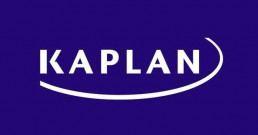
Kaplan SAT Prep Review: Rating All of Kaplan’s SAT Prep Options
Comprehensive review of Kaplan's SAT prep services: pricing, instructor qualifications, online platform, customer service, and educational quality.

Princeton Review vs Kaplan: Which ACT Prep Service is Better?
Princeton Review and Kaplan are two of the biggest test prep services, but which one is better? Detailed review of pricing, course materials, instructor qualifications, and customer service. Choose the best ACT prep to help you raise your score…
Kaplan ACT Prep Review: Rating All of Kaplan’s ACT Prep Options
Comprehensive review of Kaplan's ACT prep services: pricing, instructor qualifications, online platform, customer service, and educational quality.

15 Best Online Writing Tutoring Services for 2024 (50 Tutoring Services Reviewed)
A list of the 15 best online writing tutoring services, reviewed and ranked. Compare prices & writing tutor qualifications. Best overall: PrepMaven’s writing tutoring ($66–349/hr). Best on a budget: Wyzant ($20–600/hr). Best…
Privacy Preference Center
Privacy preferences.
👀 Turn any prompt into captivating visuals in seconds with our AI-powered design generator ✨ Try Piktochart AI!
- Piktochart Visual
- Video Editor
- AI Design Generator
- Infographic Maker
- Banner Maker
- Brochure Maker
- Diagram Maker
- Flowchart Maker
- Flyer Maker
- Graph Maker
- Invitation Maker
- Pitch Deck Creator
- Poster Maker
- Presentation Maker
- Report Maker
- Resume Maker
- Social Media Graphic Maker
- Timeline Maker
- Venn Diagram Maker
- Screen Recorder
- Social Media Video Maker
- Video Cropper
- Video to Text Converter
- Video Views Calculator
- AI Brochure Maker
- AI Document Generator
- AI Flyer Generator
- AI Image Generator
- AI Infographic
- AI Instagram Post Generator
- AI Newsletter Generator
- AI Report Generator
- AI Timeline Generator
- For Communications
- For Education
- For eLearning
- For Financial Services
- For Healthcare
- For Human Resources
- For Marketing
- For Nonprofits
- Brochure Templates
- Flyer Templates
- Infographic Templates
- Newsletter Templates
- Presentation Templates
- Resume Templates
- Business Infographics
- Business Proposals
- Education Templates
- Health Posters
- HR Templates
- Sales Presentations
- Community Template
- Explore all free templates on Piktochart
- Course: What is Visual Storytelling?
- The Business Storyteller Podcast
- User Stories
- Video Tutorials
- Need help? Check out our Help Center
- Earn money as a Piktochart Affiliate Partner
- Compare prices and features across Free, Pro, and Enterprise plans.
- For professionals and small teams looking for better brand management.
- For organizations seeking enterprise-grade onboarding, support, and SSO.
- Discounted plan for students, teachers, and education staff.
- Great causes deserve great pricing. Registered nonprofits pay less.
75 Unique School Presentation Ideas and Topics Plus Templates
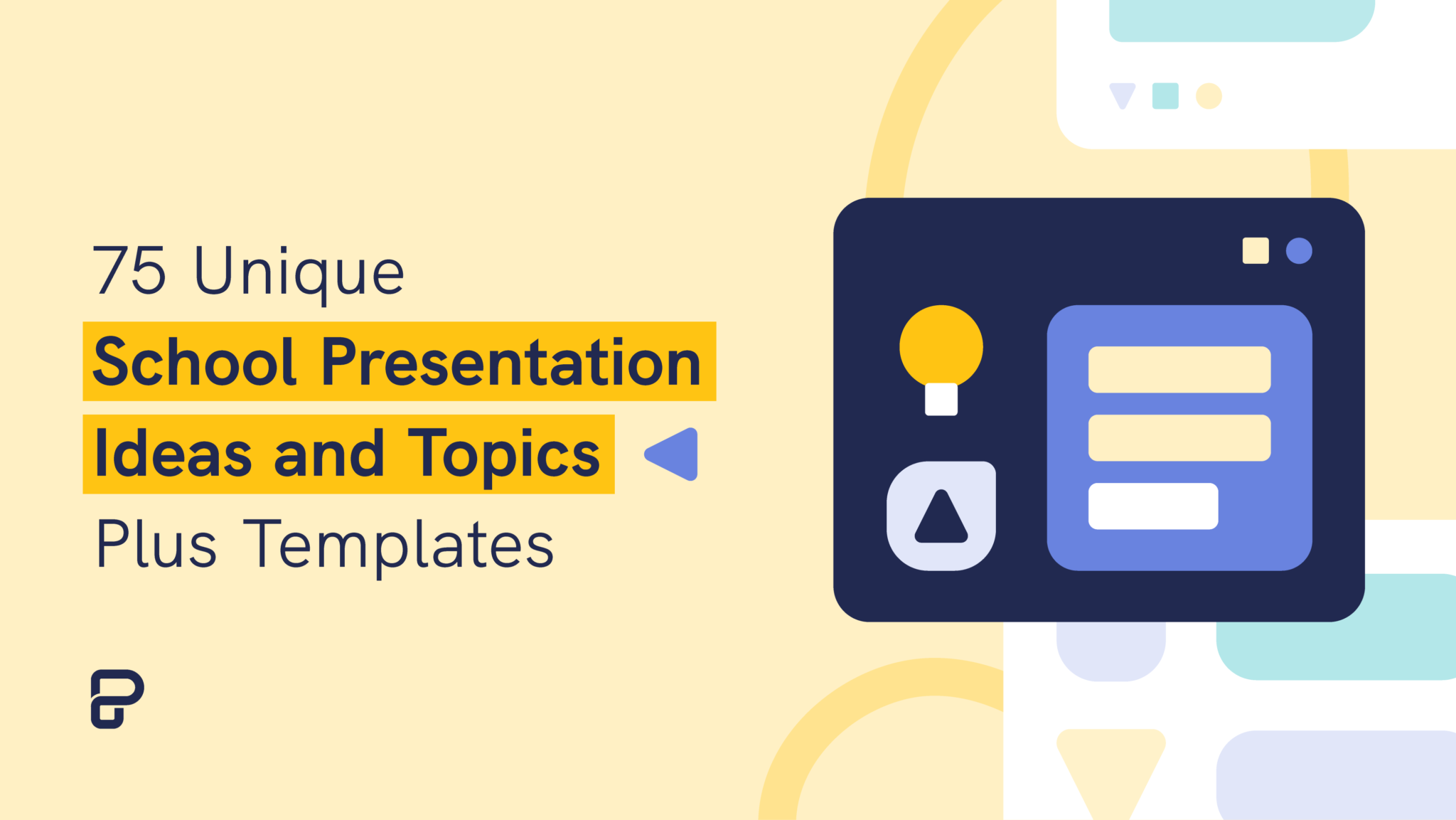
Are you tired of seeing the same PowerPoints repeating overused and unoriginal school presentation ideas covering repeated topics in your classes?
You know what I’m talking about; we’ve all been there, and sat through yawn-worthy demonstrations, slides, or presentation videos covering everything from the solar system, someone’s favorite pet, past presidents of a country, to why E=mC squared.
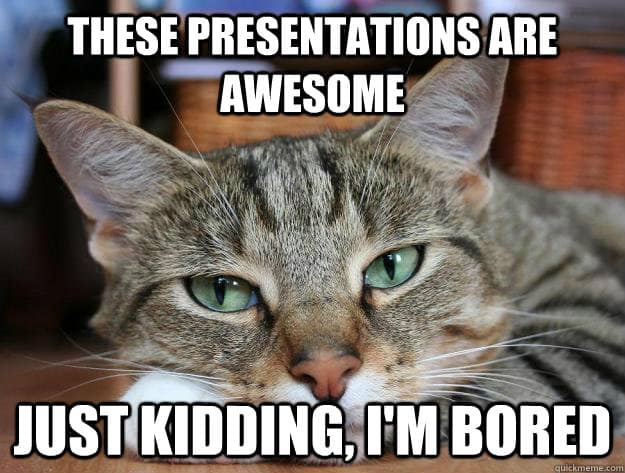
From grade school to university, first graders to college students, we are obligated to create, perform, and observe academic presentations across a plethora of curriculums and classes, and not all of these public speaking opportunities fall into the category of an ‘interesting topic’.
Yet, have no fear! Here at Piktochart, we are here to help you and your classmates. From giving examples of creative and even interactive presentation ideas, providing presentation videos , and suggesting interactive activities to give your five minutes of fame the ‘wow’ factor that it deserves, this article is your guide!
Our massive collection of unique school and college presentation ideas and templates applies if you’re:
- A teacher looking to make your class more engaging and fun with student presentations.
- A student who wants to impress your teacher and the rest of the class with a thought-provoking, interesting topic.
A Curated List of Interesting Topics for School Presentations
Did you know that when it comes to presentations , the more students involved improves retention? The more you know! Yet sometimes, you need a little help to get the wheels moving in your head for your next school presentation .
The great thing about these ideas and topics is you can present them either in face-to-face classes or virtual learning sessions.
Each school presentation idea or topic below also comes with a template that you can use. Create a free Piktochart account to try our presentation maker and get access to the high-quality version of the templates. You can also check out our Piktochart for Education plan .
Want to watch this blog post in video format? The video below is for you!
The templates are further divided into the following categories covering the most popular and best presentation topics. Click the links below to skip to a specific section.
- Unique science presentation topics to cultivate curiosity in class
- Engaging culture and history presentation ideas to draw inspiration from
- Health class presentation topics to help students make healthy lifestyle decisions
- Data visualization ideas to help students present an overwhelming amount of data and information into clear, engaging visuals
- First day of school activity ideas to foster classroom camaraderie
- Communication and media topics to teach students the importance of effective communication
- Topics to help students prepare for life after school
We hope this list will inspire you and help you nail your next school presentation activity.
Unique Science Presentation Topics to Cultivate Curiosity in Class
Science is a broad field and it’s easy to feel overwhelmed with too many topics to choose for your next presentation.
Cultivate curiosity in the science classroom with the following unique and creative presentation ideas and topics:
1. Can life survive in space?
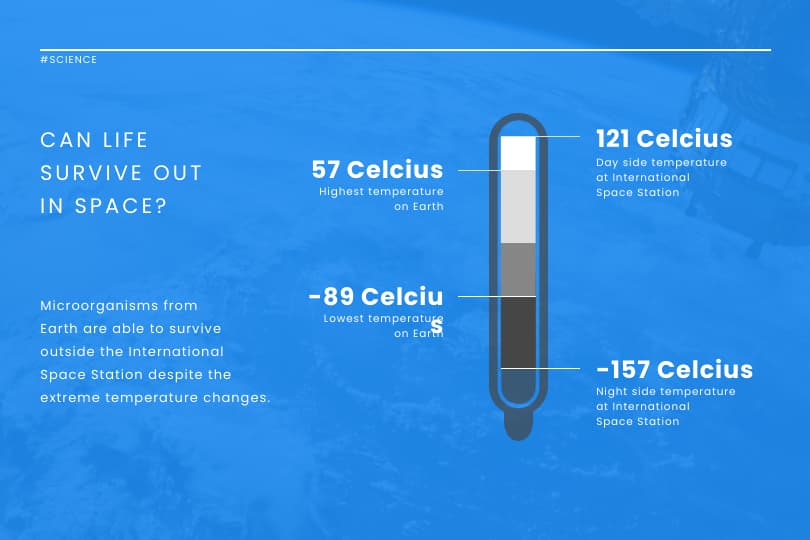
2. Do plants scream when they’re in pain?
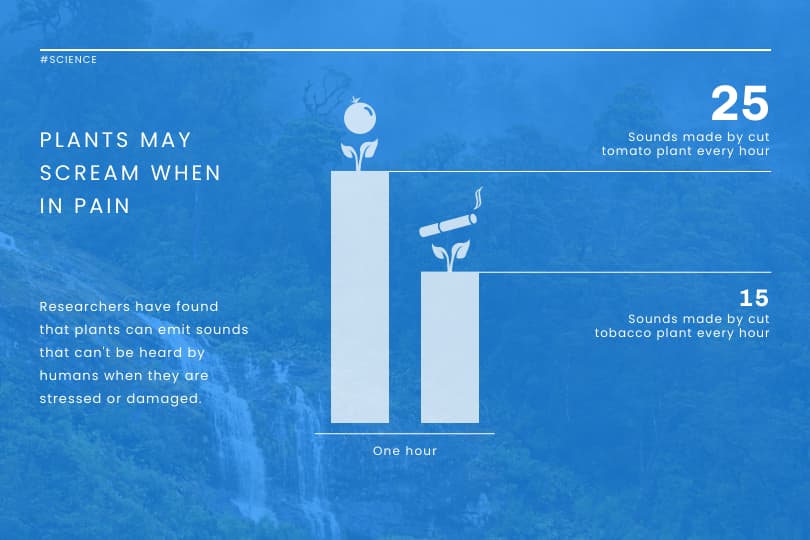
3. What are the traits of successful inventors?
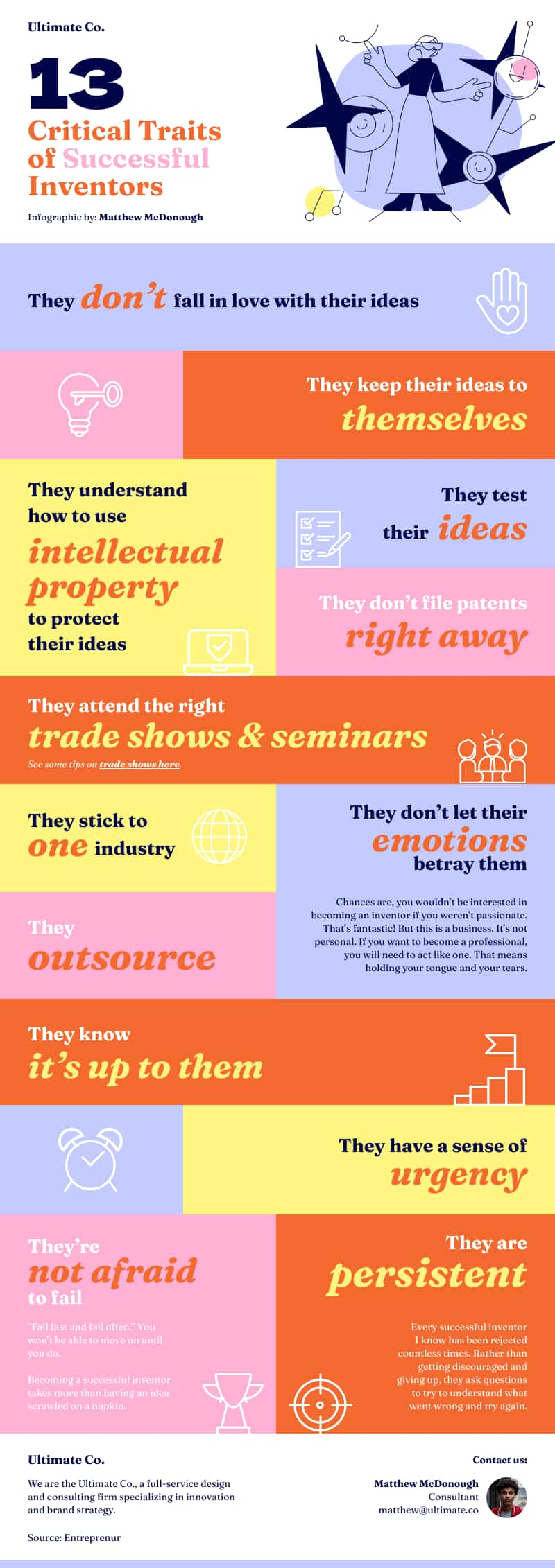
4. How vaccines work
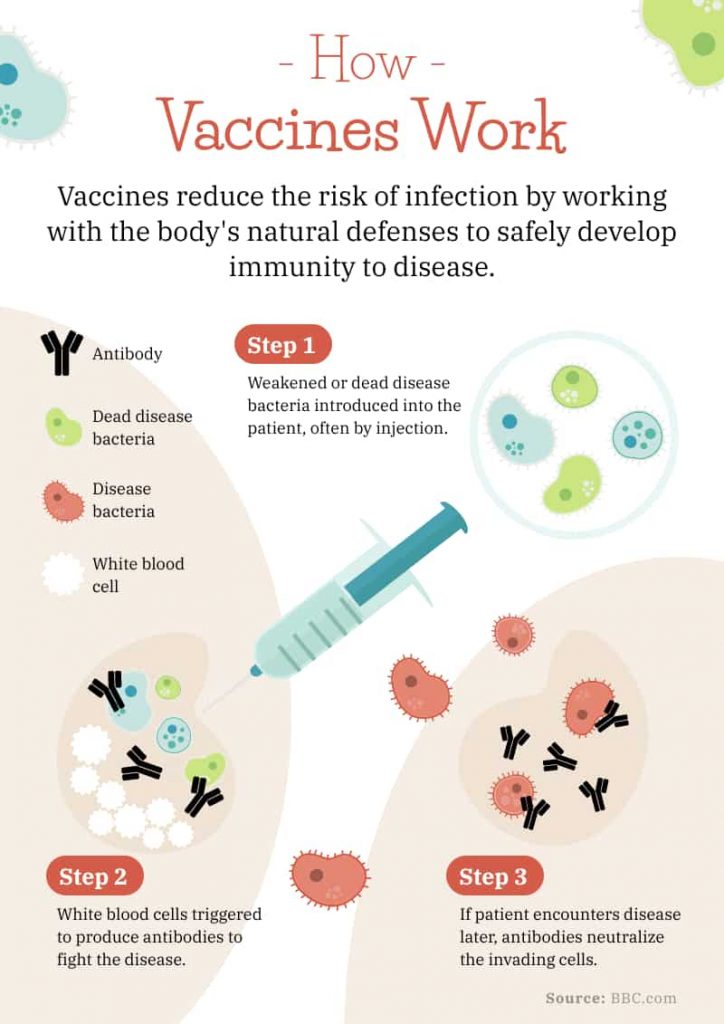
5. Massive destruction of the Koala’s habitat in Australia
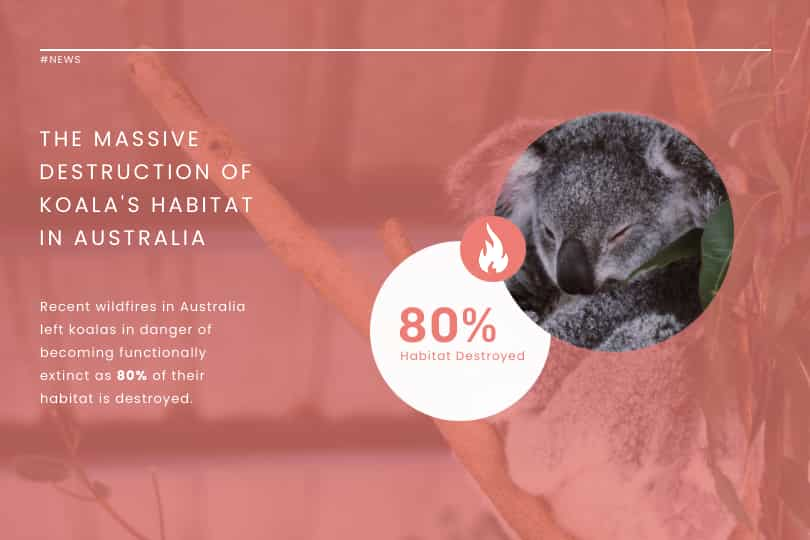
6. Left brain versus right brain

7. What are great sources of calcium?
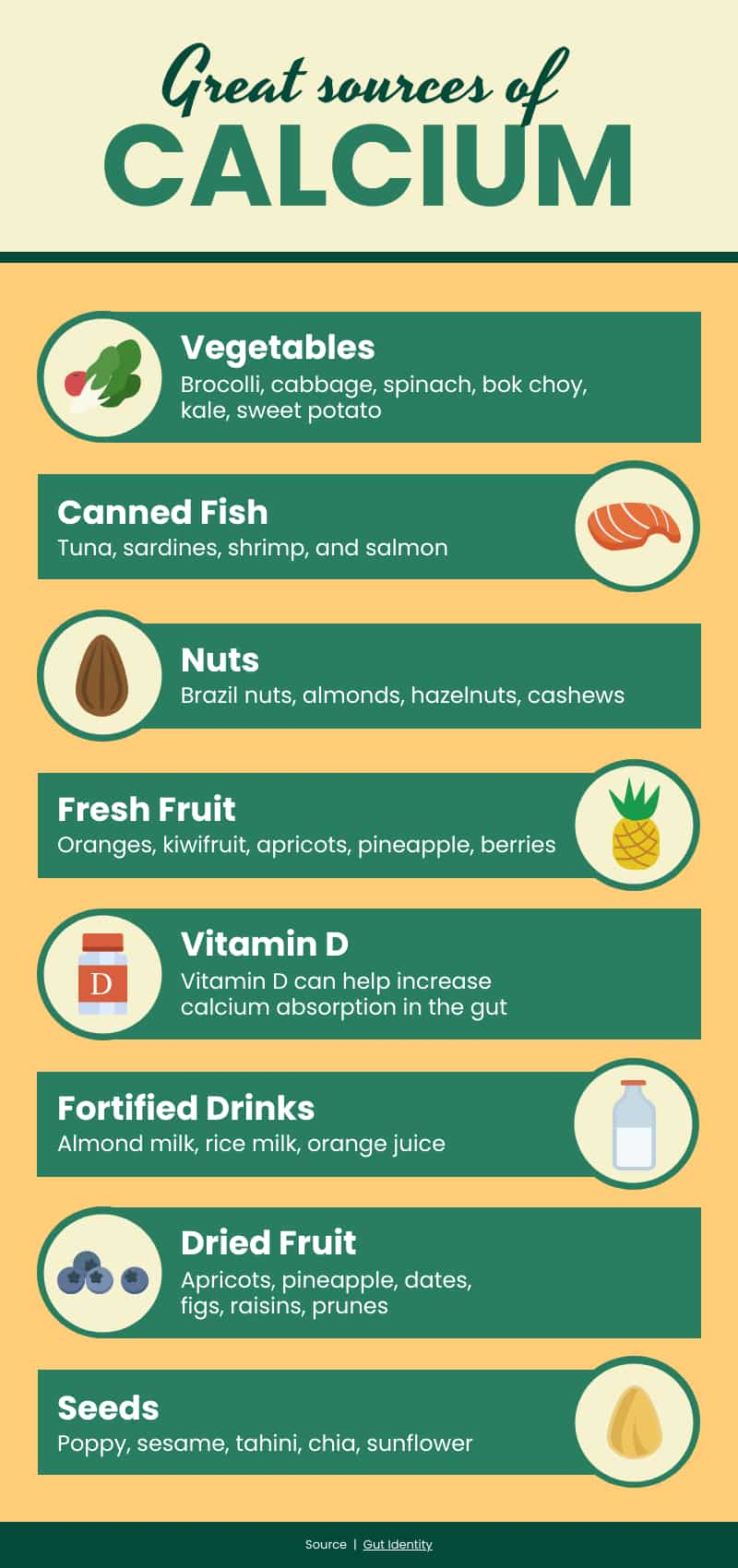
8. Recycling facts you need to know
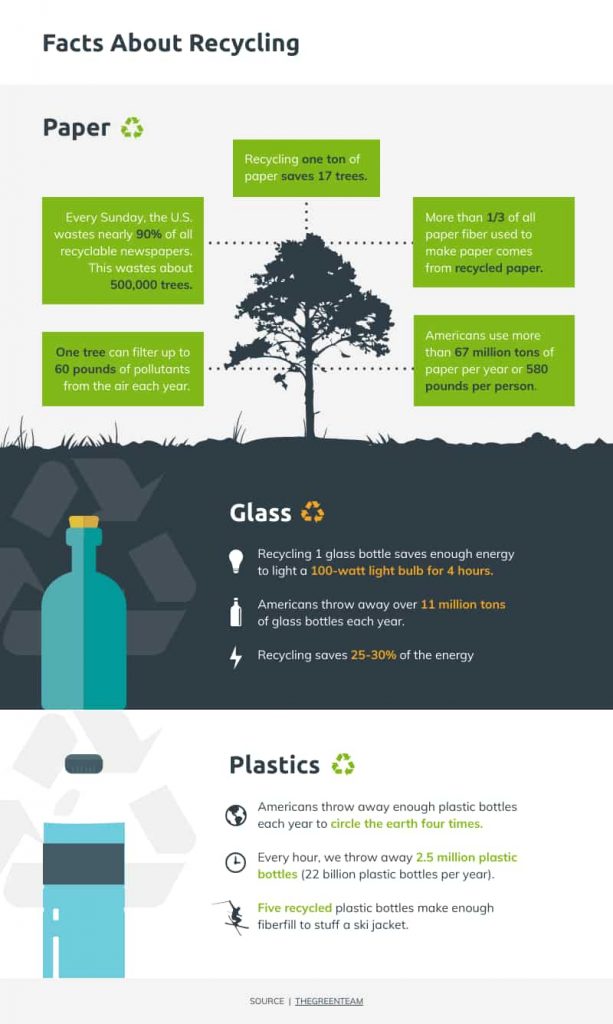
9. Do you have what it takes to be a NASA astronaut?
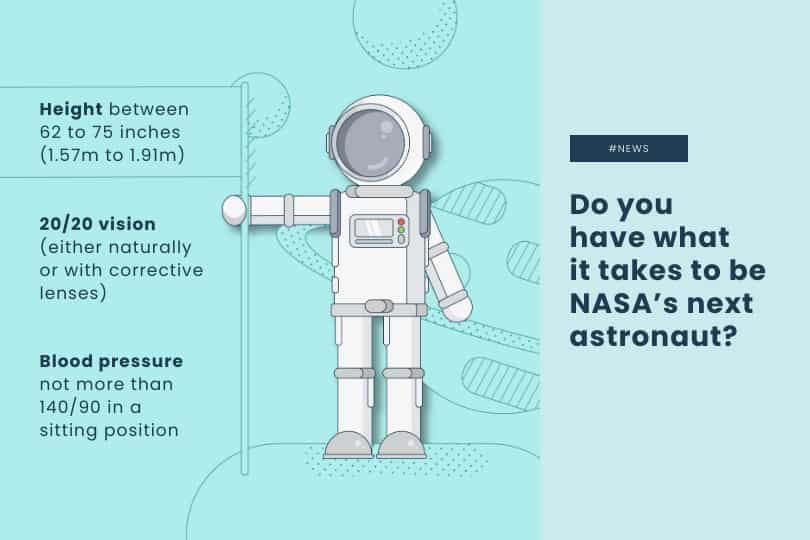
10. The rise of robots and AI: Should we be afraid of them?
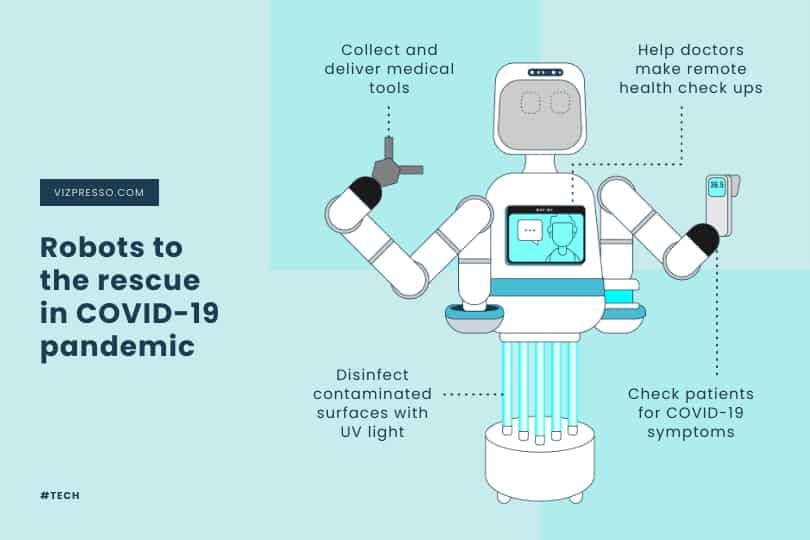
11. How far down does the sea go?
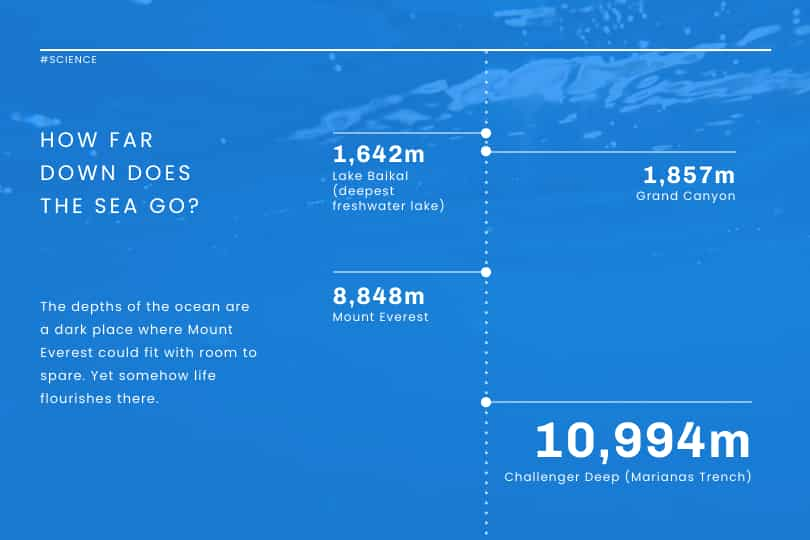
12. The stages of sleep
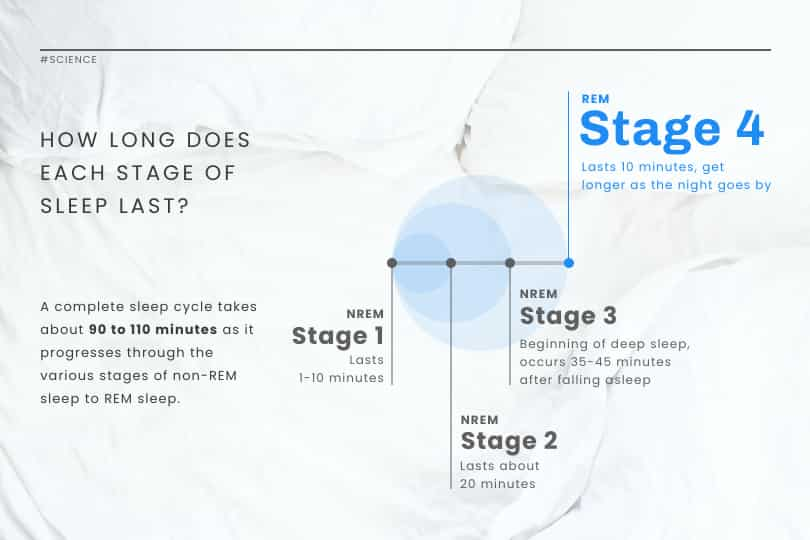
13. Will Mars be our home in 2028?
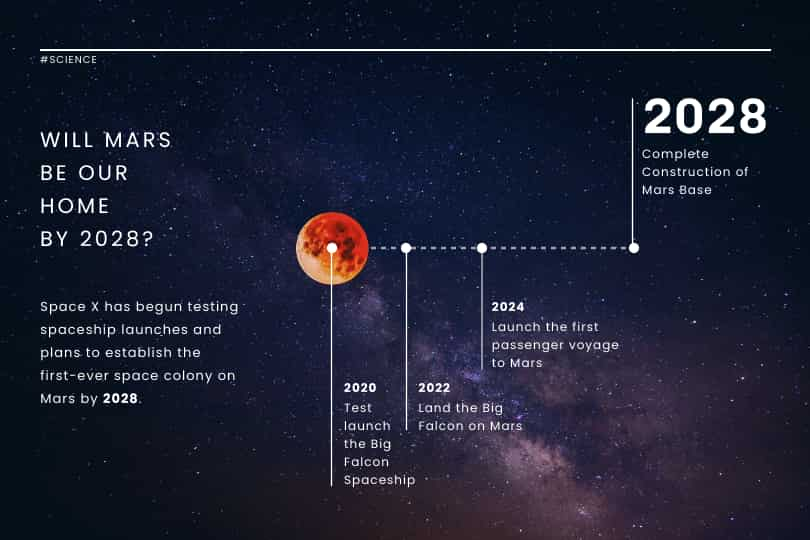
14. A quick look at laboratory safety rules
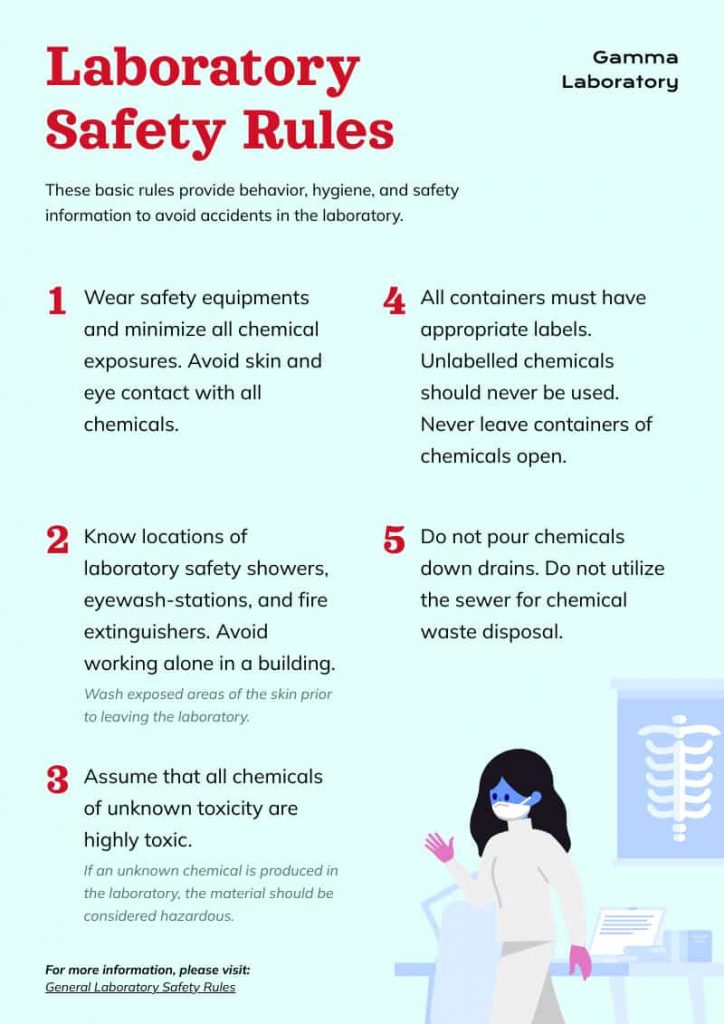
15. The first person in history to break the sound barrier
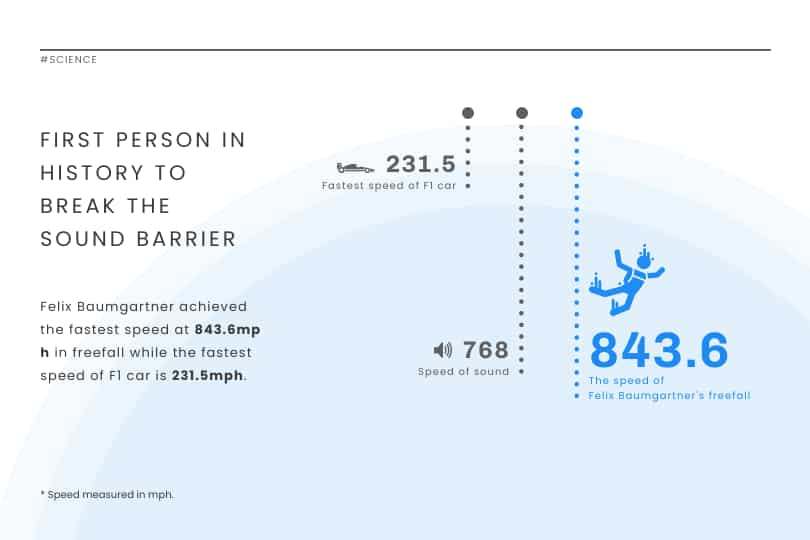
Engaging Culture and History Presentation Ideas to Draw Inspiration From
History is filled with equally inspiring and terrifying stories, and there are lessons that students can learn from the events of the past. Meanwhile, interactive presentations about culture help students learn and embrace diversity.
16. Women in history: A conversation through time

17. The sweet story of chocolate
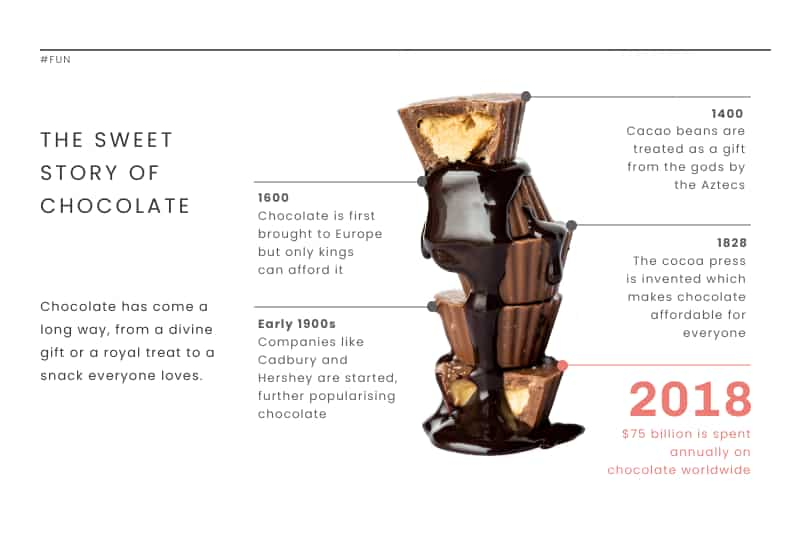
18. A history lesson with a twist
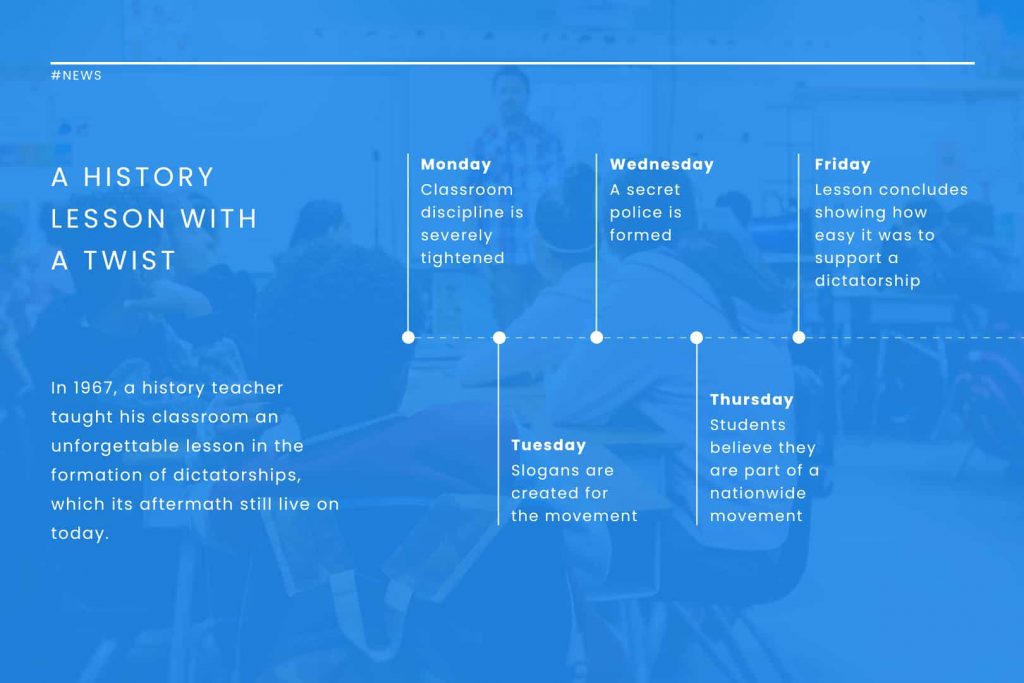
19. The history of basketball
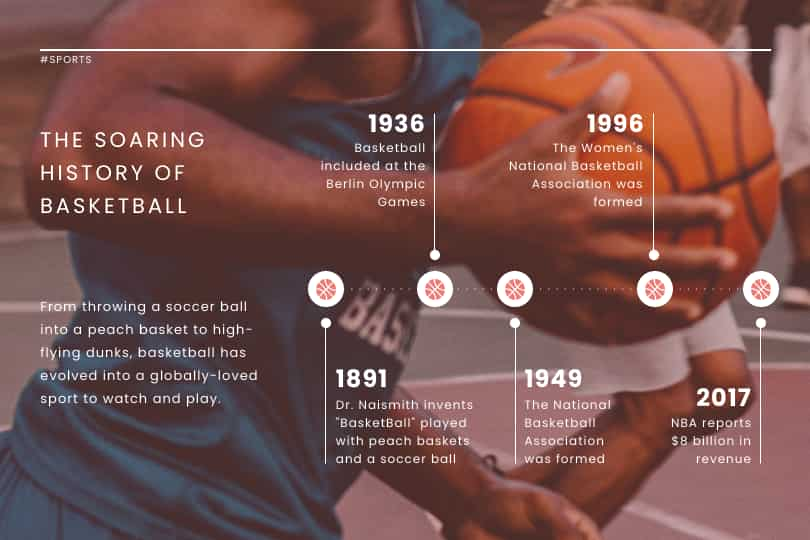
20. The origin of the Halloween celebration
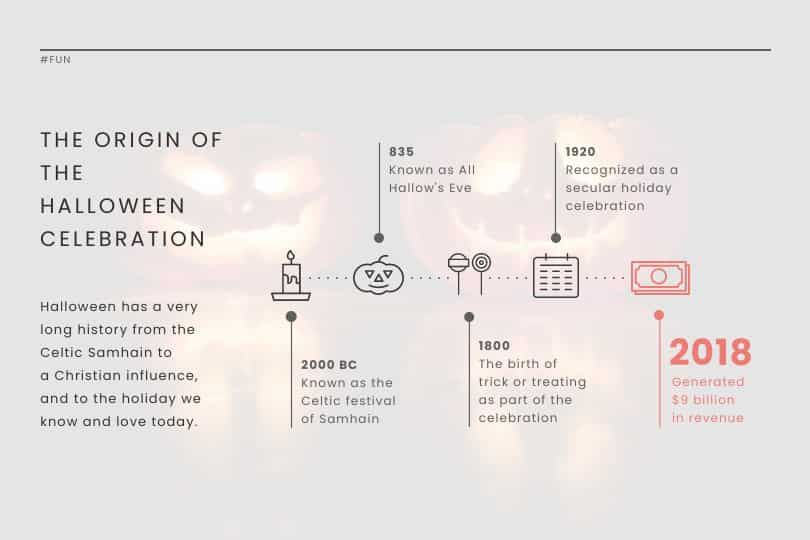
21. AI History
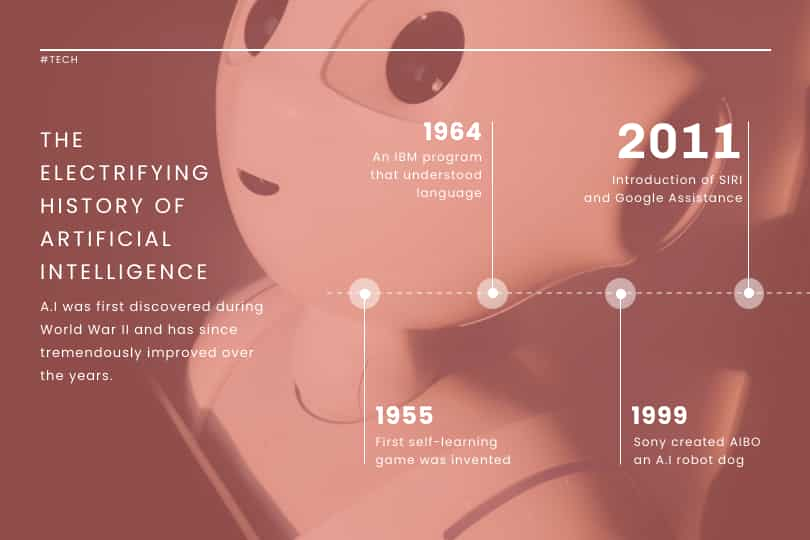
22. What you need to know about New Zealand
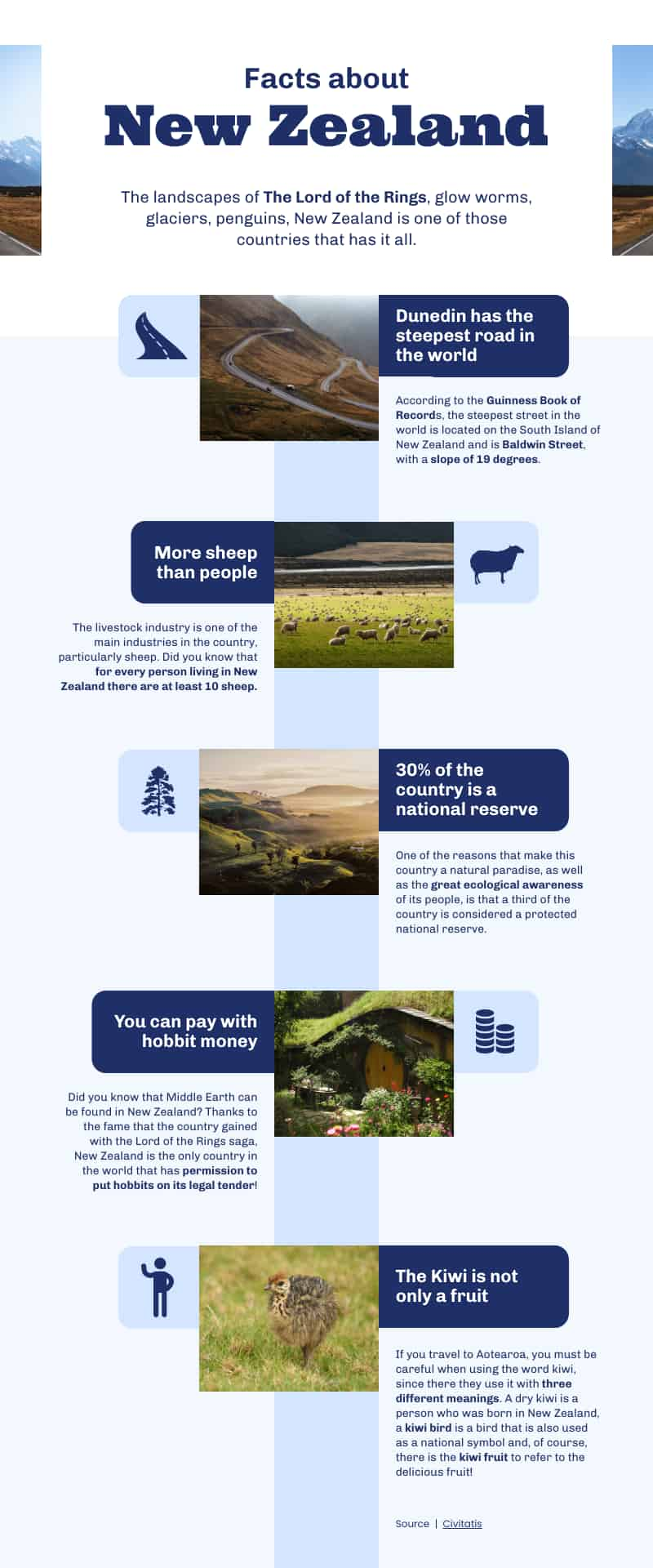
23. 1883 volcanic eruption of Krakatoa
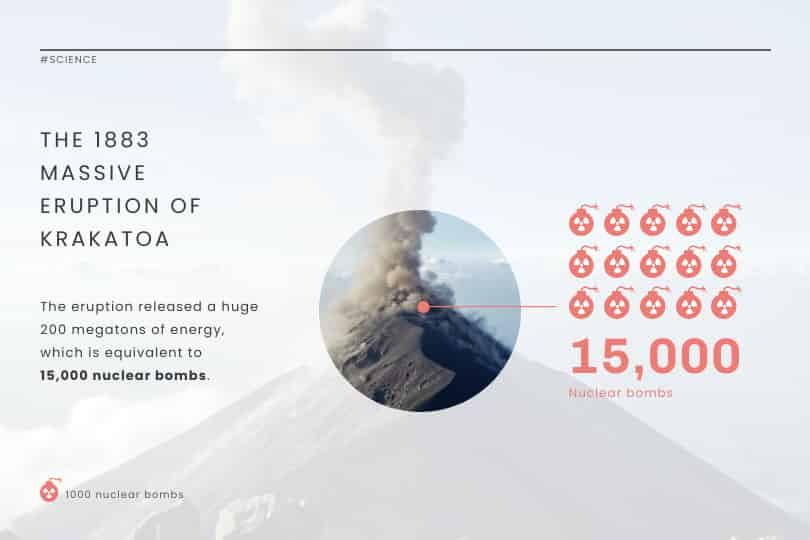
24. Roman structures: 2000 years of strength
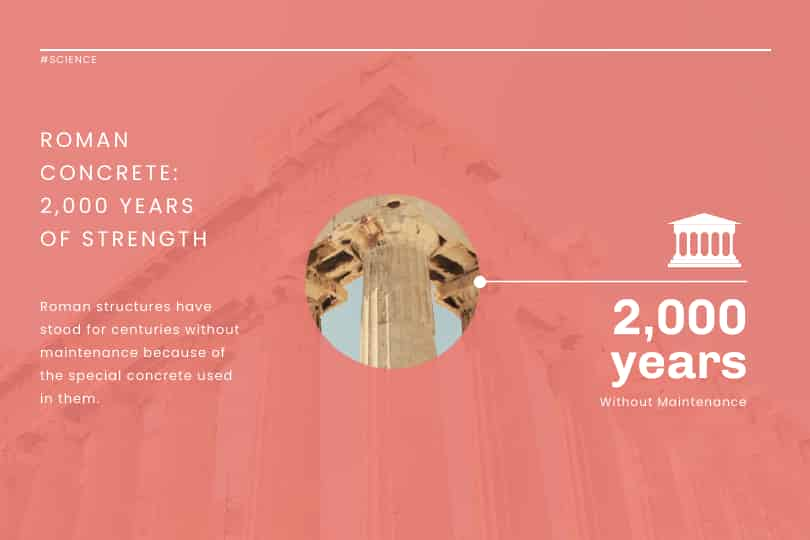
25. The most famous art heists in history
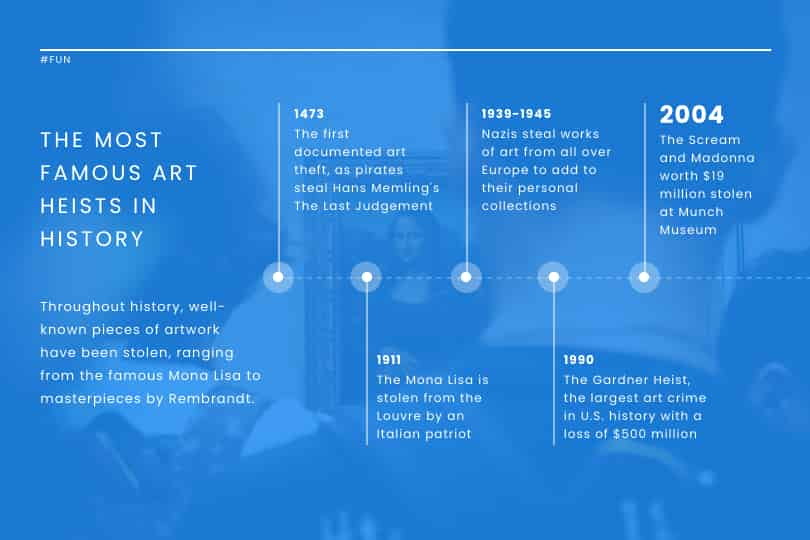
26. Elmo: The story behind a child icon
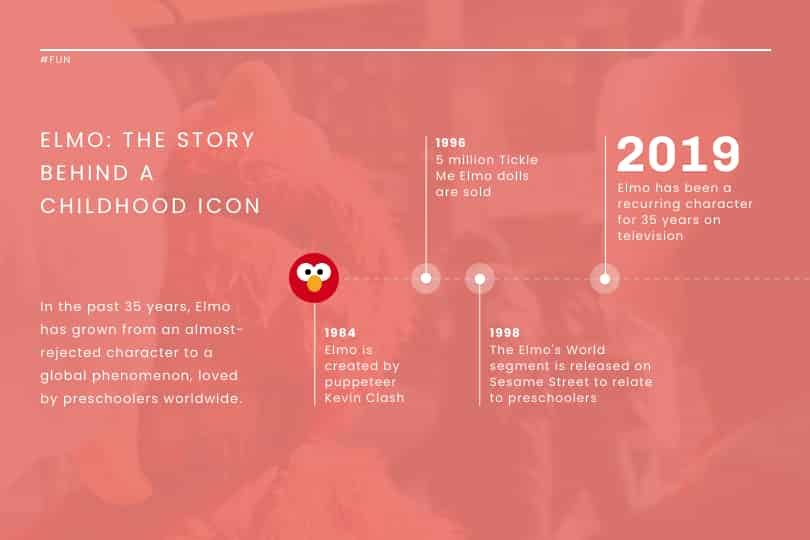
27. 10 things you should know before you visit South Korea
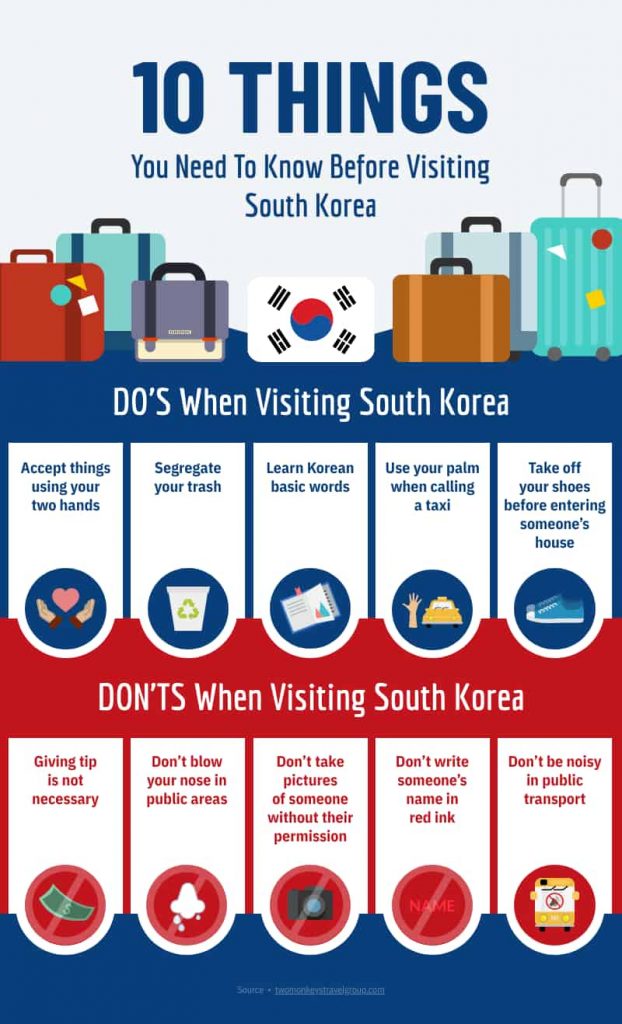
28. 8 things you didn’t know about these 8 countries
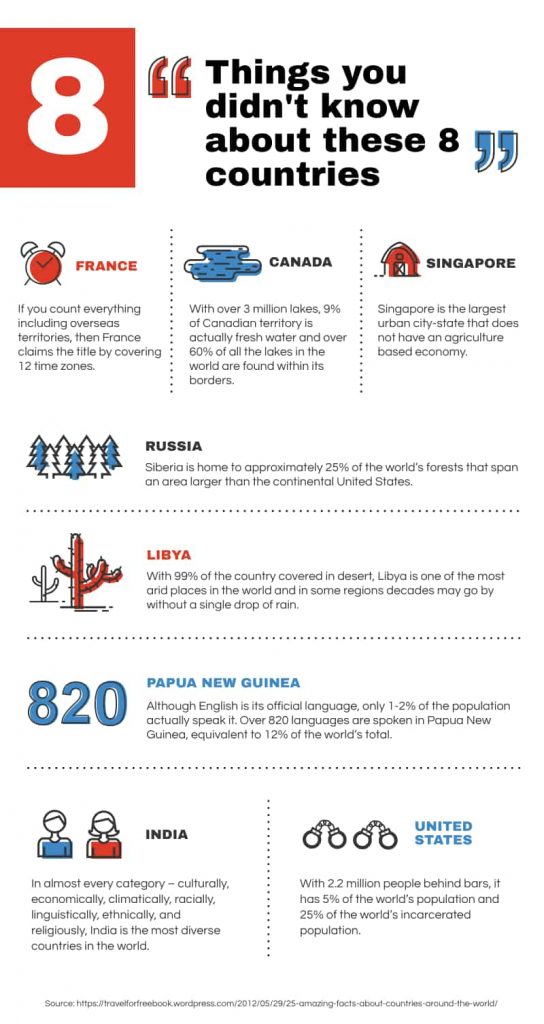
Health Class Presentation Topics to Help Students Make Healthy Lifestyle Decisions
Want to learn how to engage students with healthcare topic ideas? Then consider using these templates for your next interactive presentation.
According to the CDC , school-based health education contributes to the development of functional health knowledge among students. It also helps them adapt and maintain health-promoting behaviors throughout their lives.
Not only will your presentation help with keeping students engaged, but you’ll also increase class involvement with the right slides.
The following examples of health and wellness interactive presentations include fun ideas and topics that are a good start.
29. How to look after your mental health?

30. The eradication of Polio
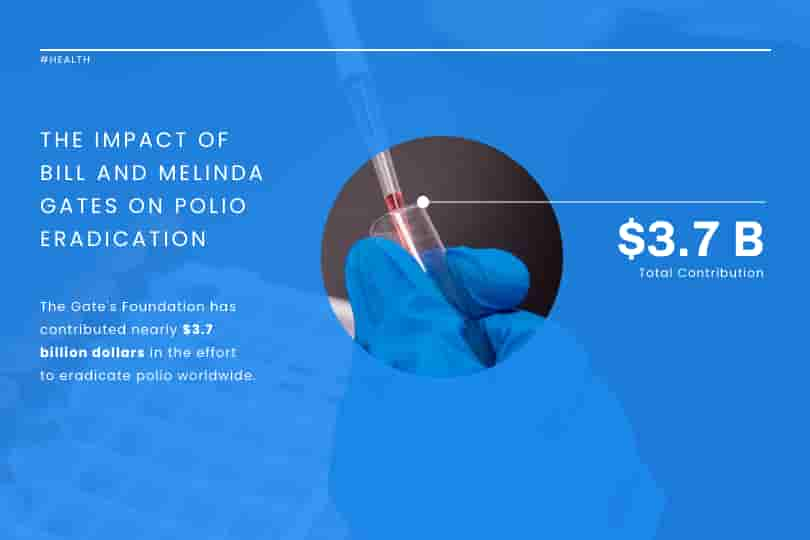
31. How to have a healthy lifestyle

32. 10 handwashing facts
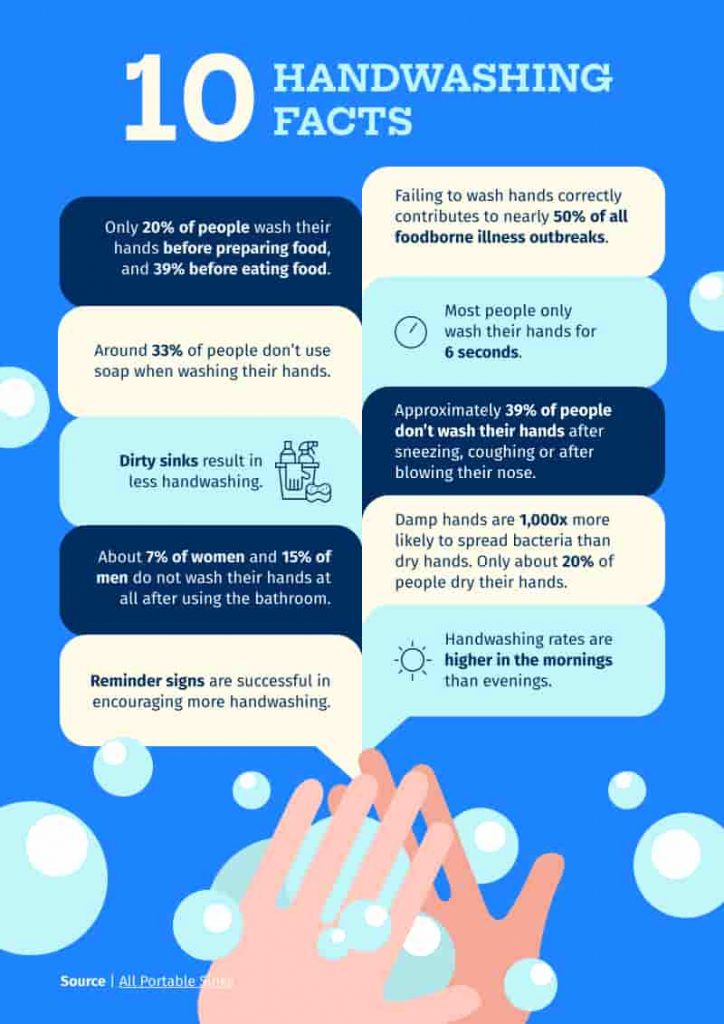
33. Myths and facts about depression
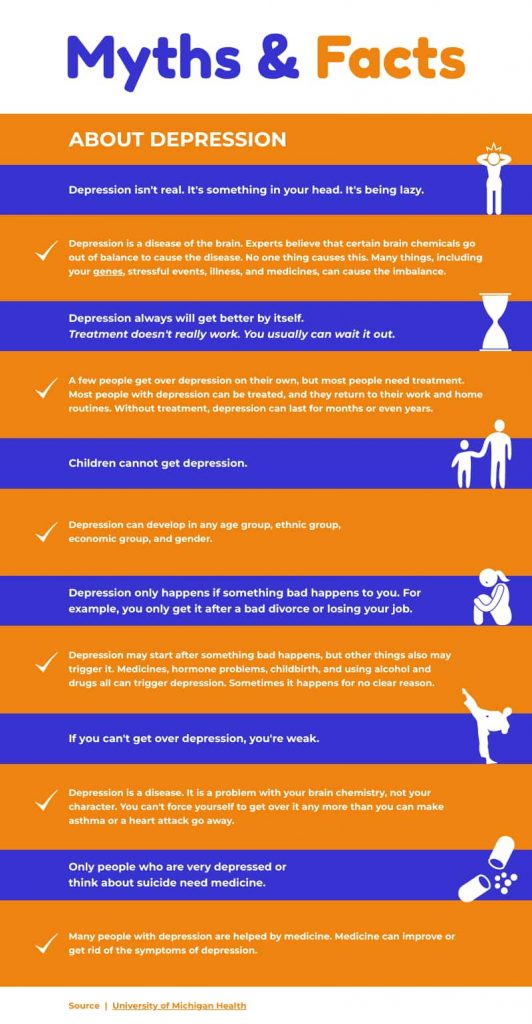
34. Hacks for making fresh food last longer

35. Ways to avoid spreading the coronavirus
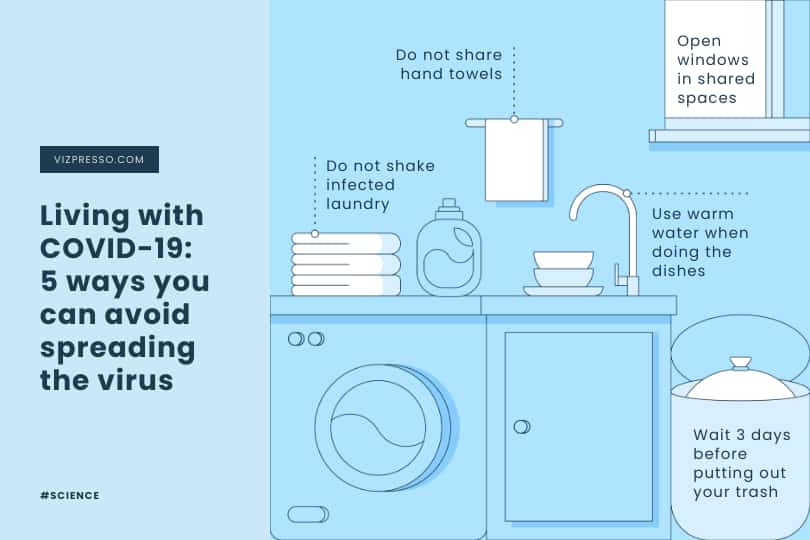
36. Mask protection in 5 simple steps
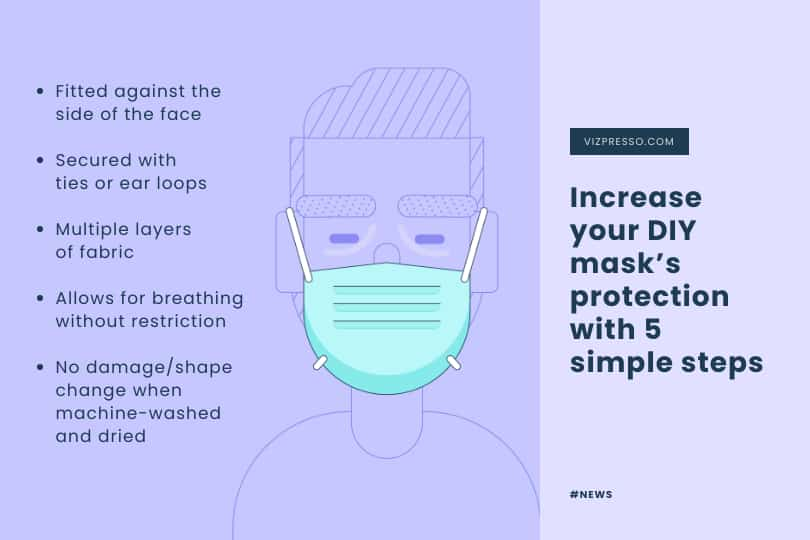
37. Everything you need to know about the flu
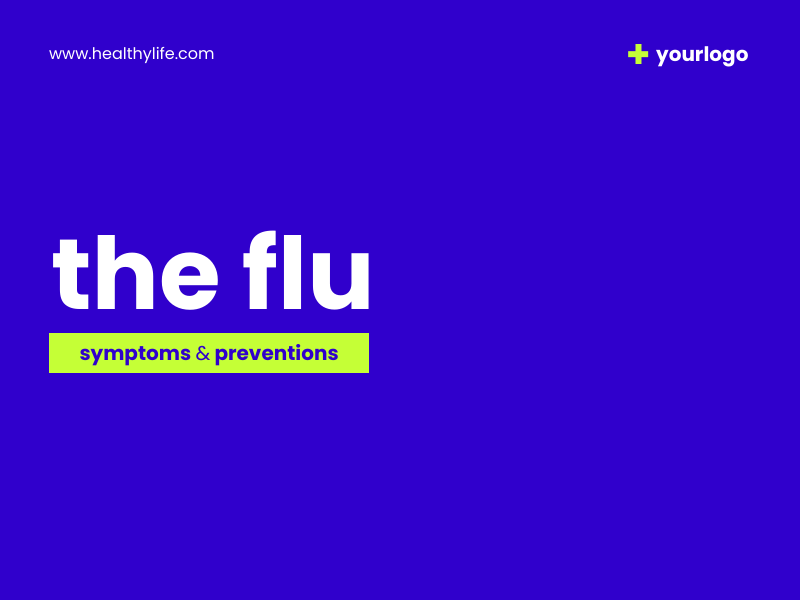
38. All about stress: Prevention, tips, and how to cope
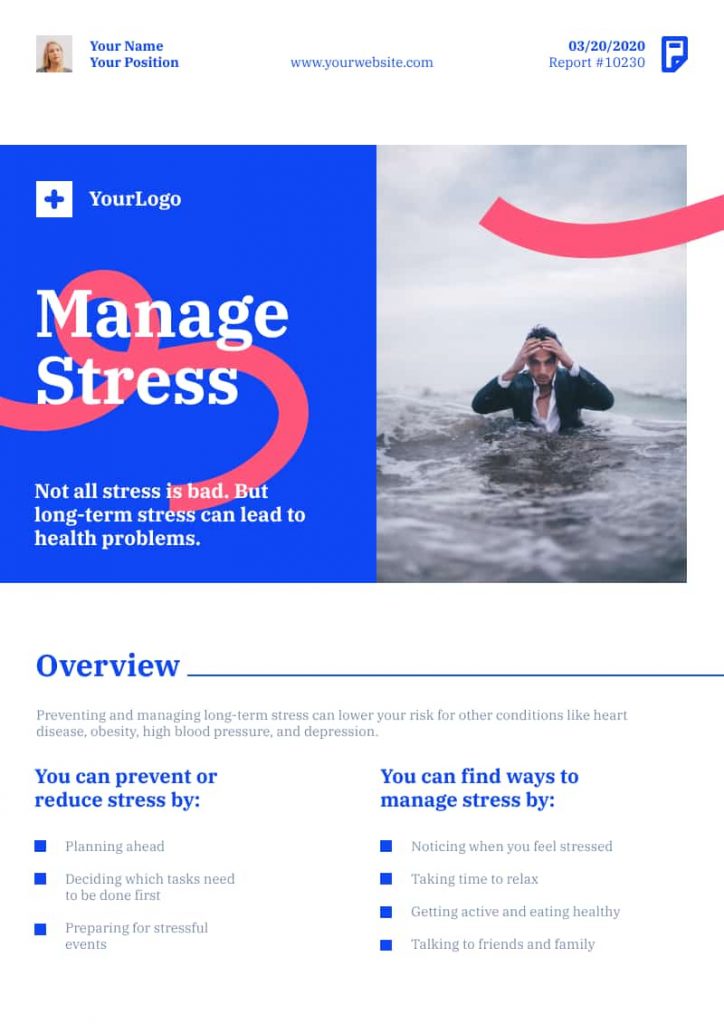
39. The importance of sleep
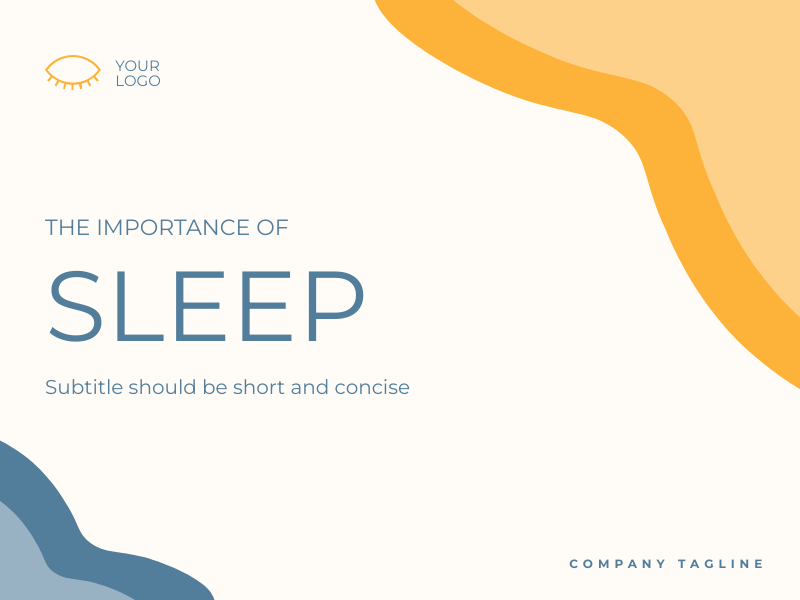
40. Is milk tea bad for you?
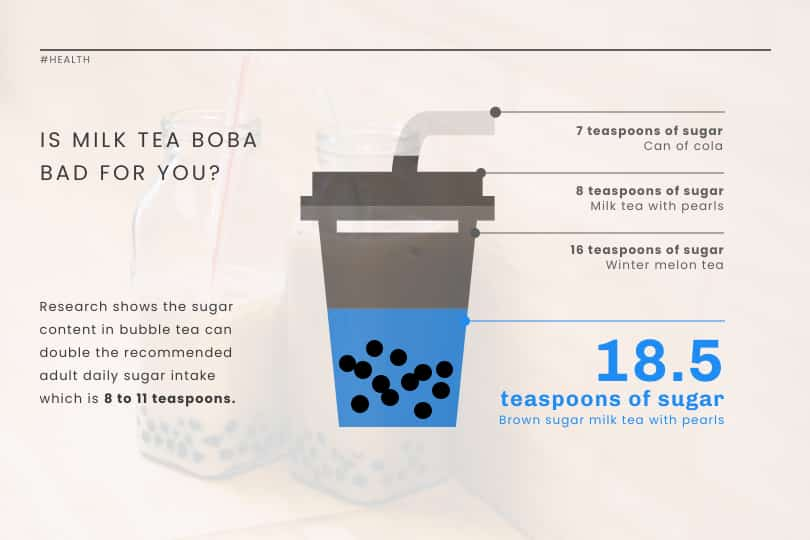
41. How to boost happiness in 10 minutes
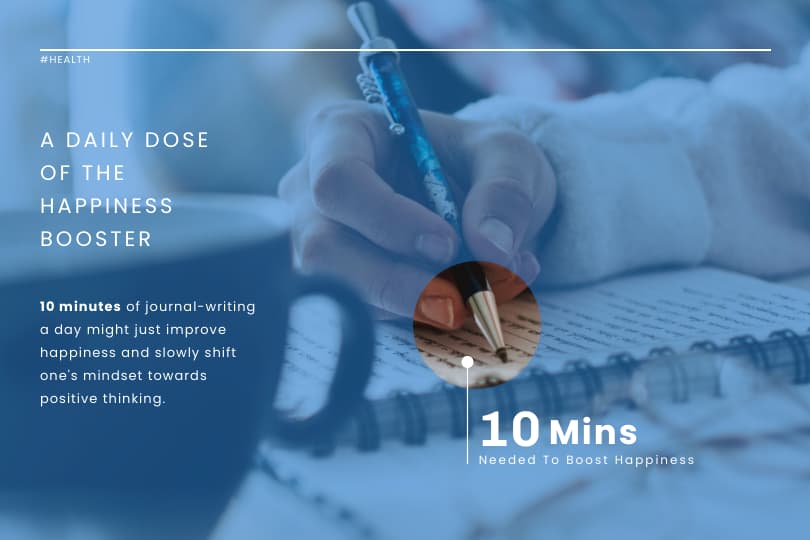
42. How dirty are debit and credit cards
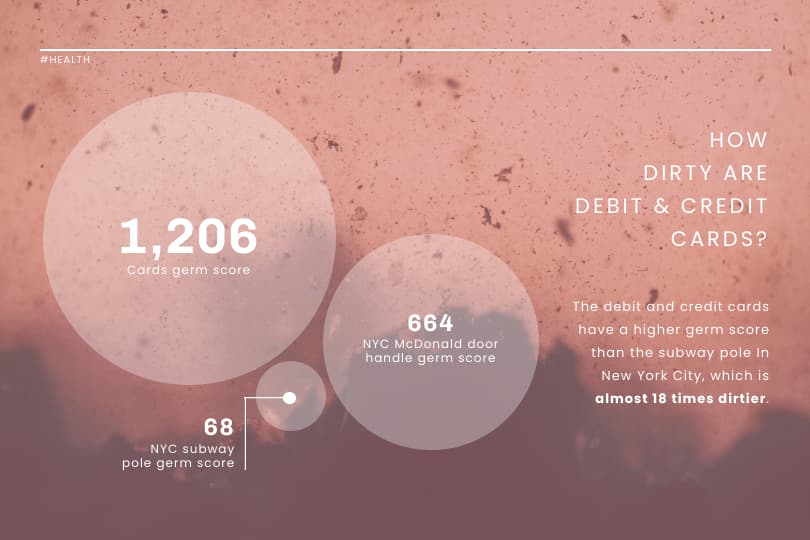
43. Why do you need sunscreen protection
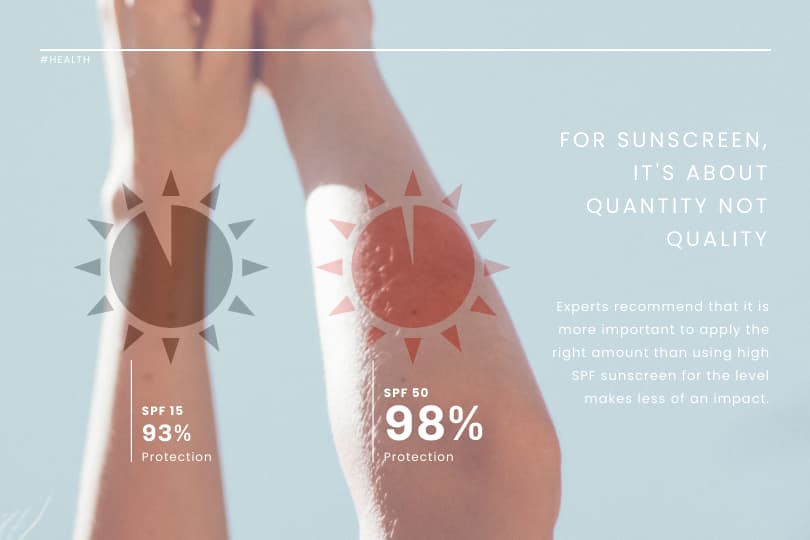
Data Visualization Ideas to Help Students Present Overwhelming Amounts of Data in Creative Ways
Data visualization is all about using visuals to make sense of data. Students need to pull the main points from their extensive research, and present them by story telling while being mindful of their classmates’ collective attention span.
As far as student assignments go, storytelling with data is a daunting task for students and teachers alike. To keep your audience interested, consider using a non linear presentation that presents key concepts in creative ways.
Inspire your class to be master data storytellers with the following data visualization ideas:
44. Are we slowly losing the Borneo rainforest?
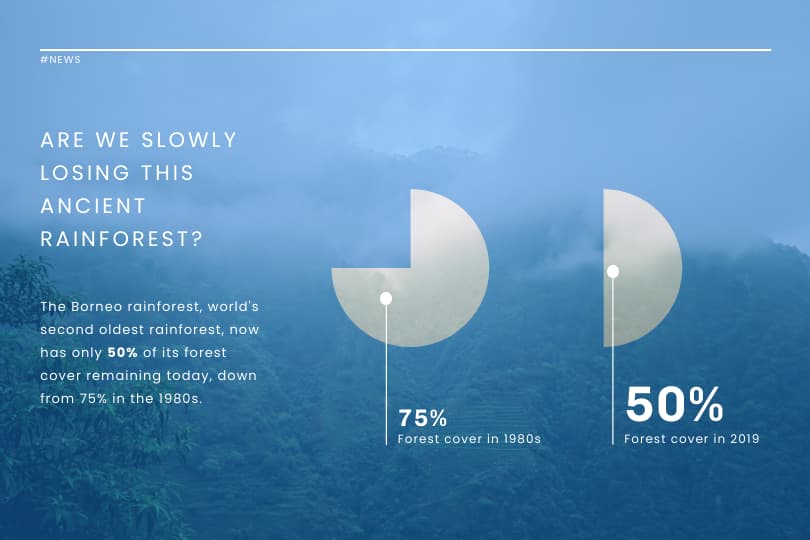
45. Skateboard deck design over the years
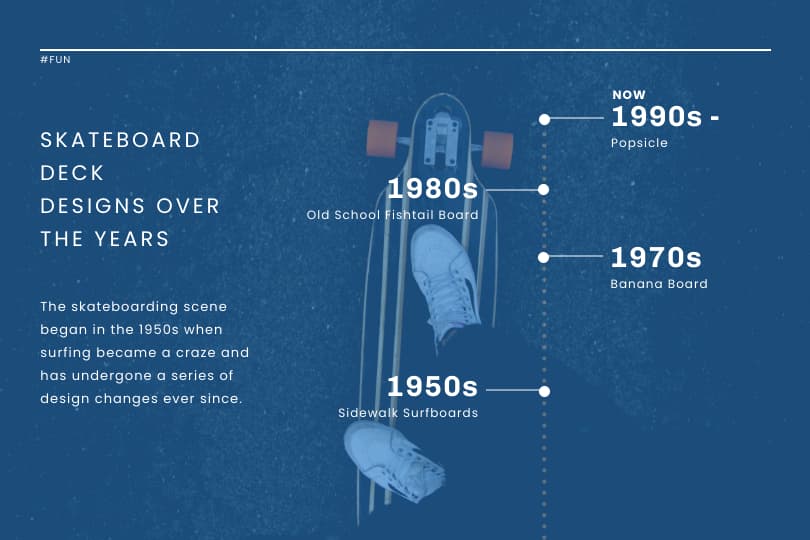
46. Food waste during the Super Bowl
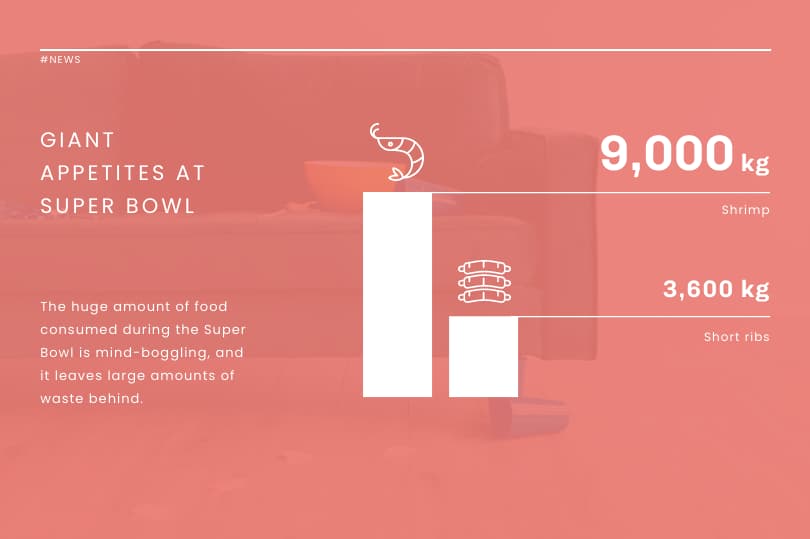
47. The weight of the tallest building in the world
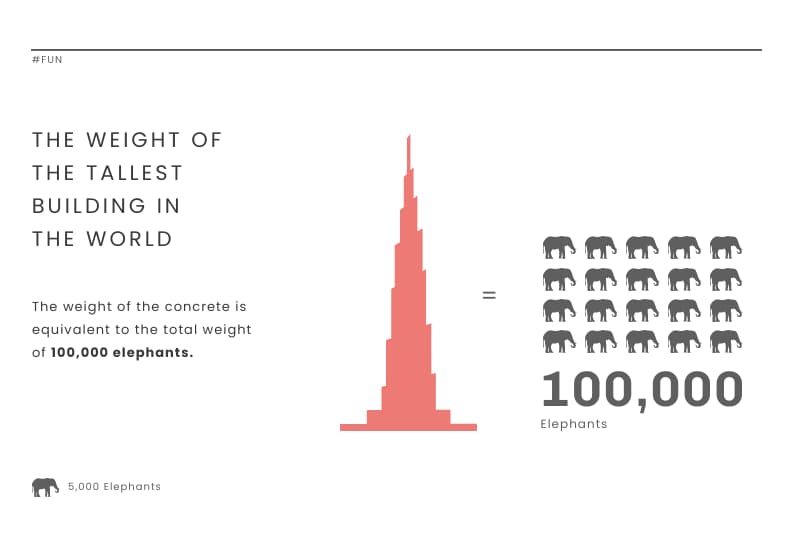
48. Infographic about data and statistics

49. Stats about cyberbullying
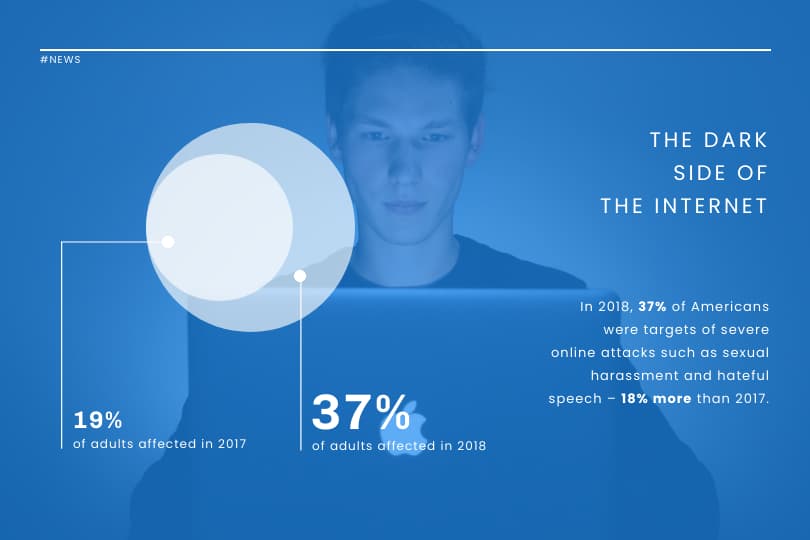
50. How whales combat climate change
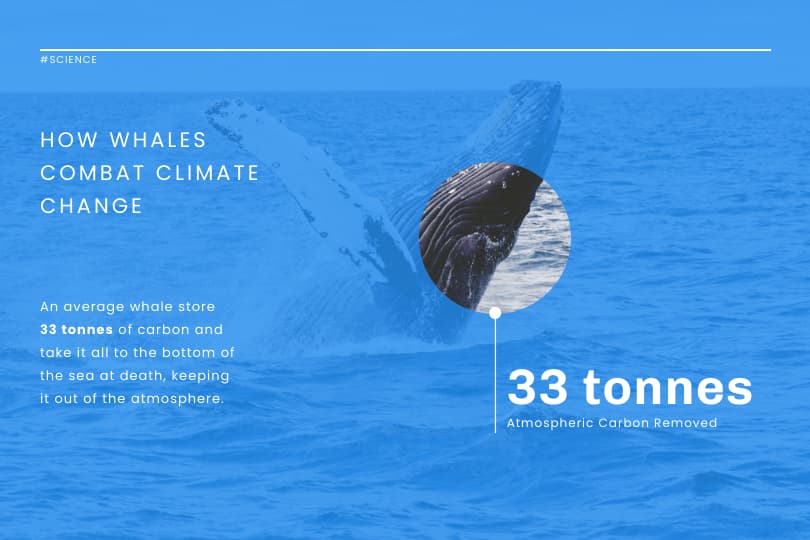
First Day of School Interactive Activity Ideas to Foster Whole-class-Camaraderie
Calling all teachers! Welcome your new students and start the school year with the following back-to-school creative presentation ideas and relevant templates for first-day-of-school activities.
These interactive presentations grab the attention of your students and are remarkably easy to execute (which is the main educator’s goal after all)!
51. Meet the teacher
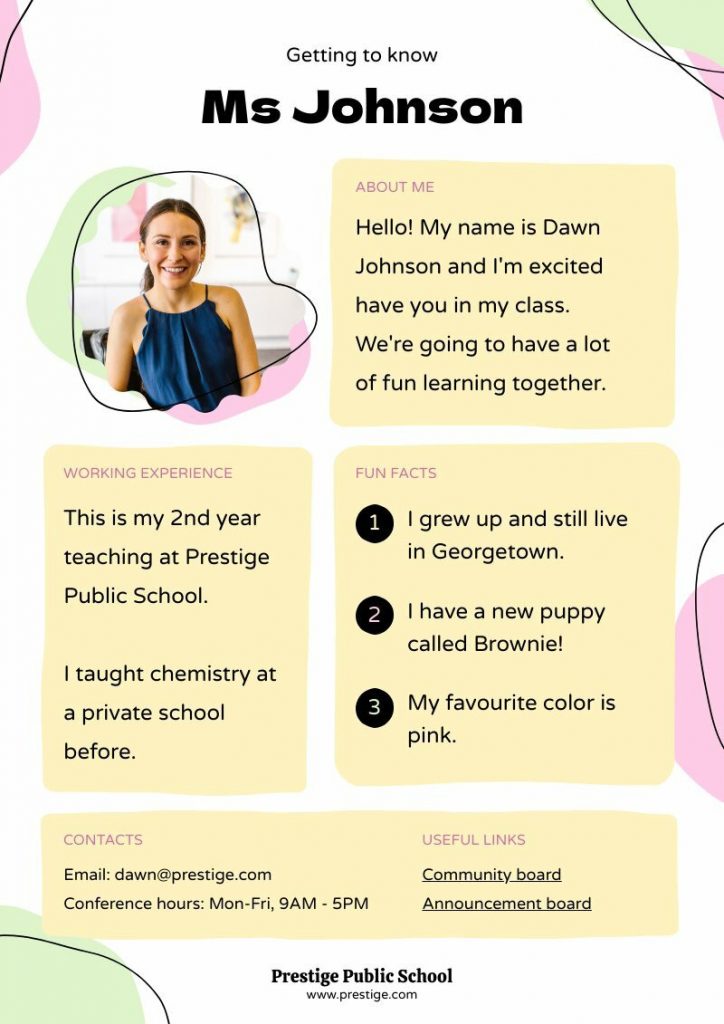
52. Example: all about me
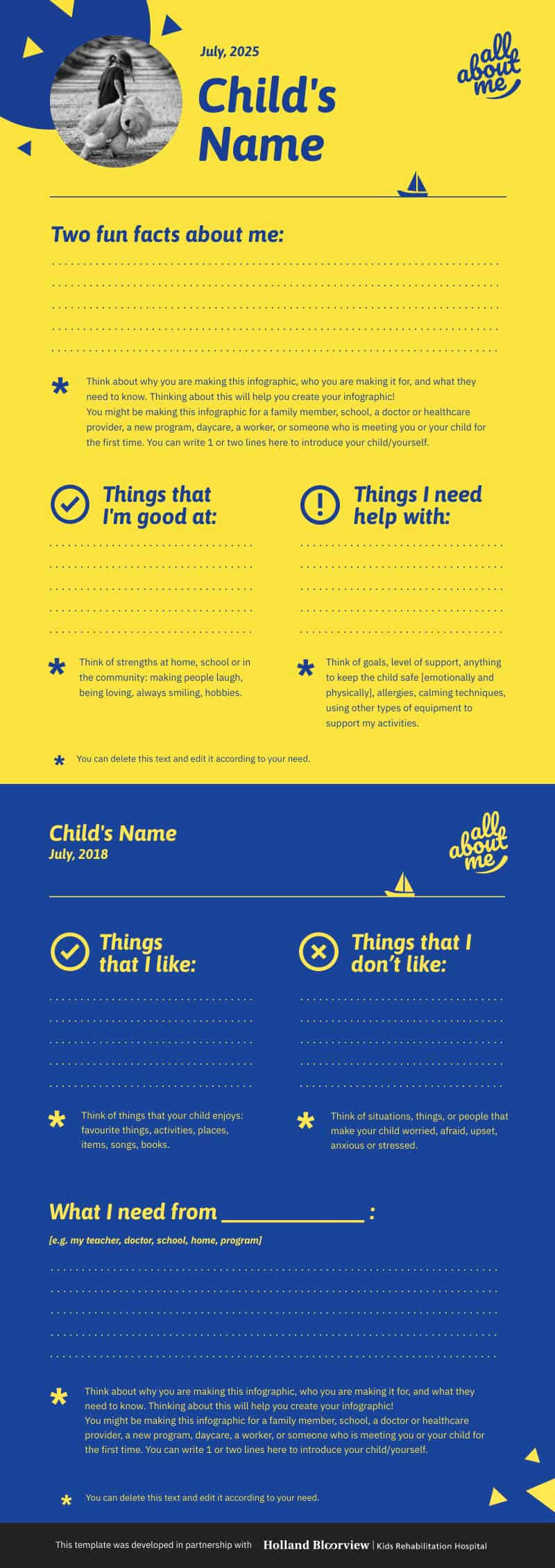
53. Self-introduction
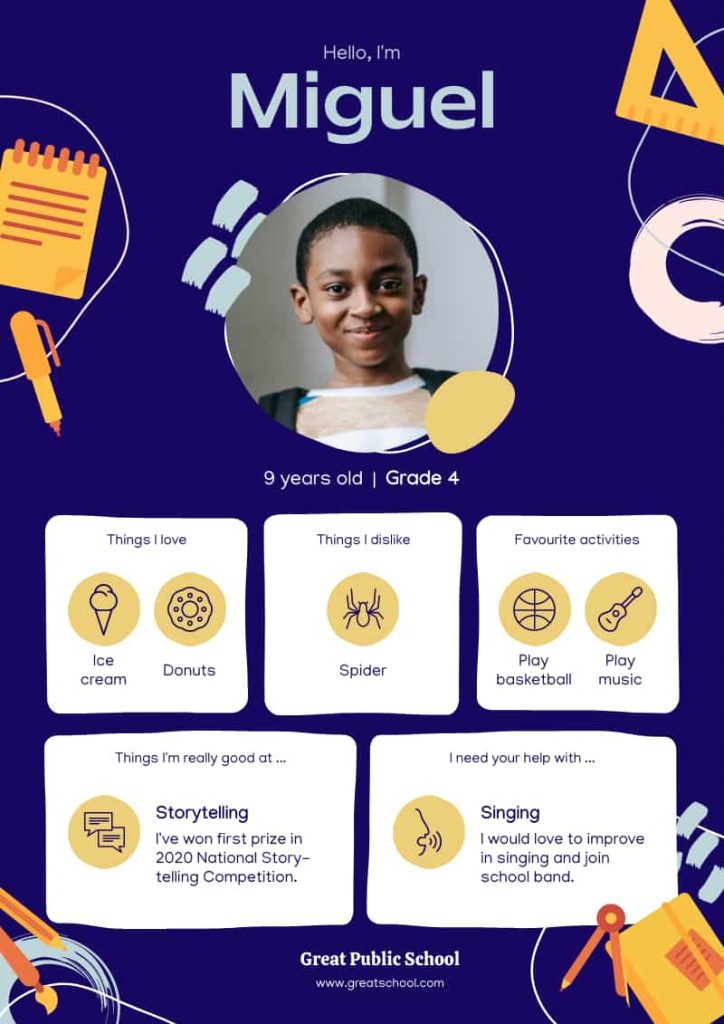
54. Tips on how to focus on schoolwork

55. Course plan and schedule
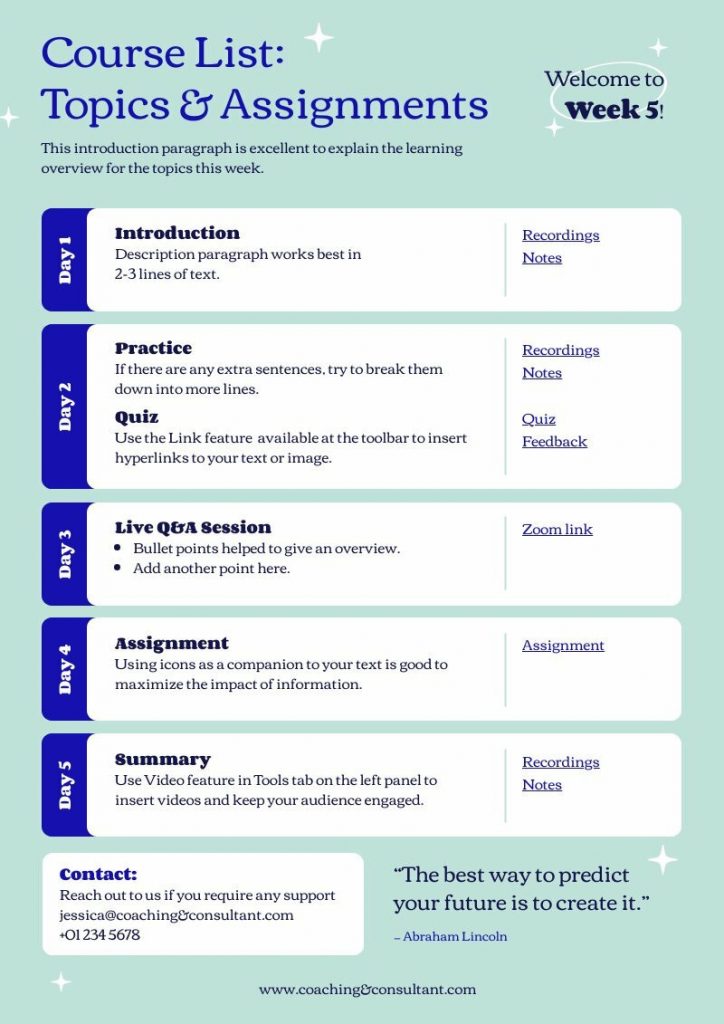
Give our class schedule maker a try to access more templates for free. You can also access our presentation-maker , poster-maker , timeline-maker , and more by simply signing up .
56. Interpreting a student’s report card (for parents)
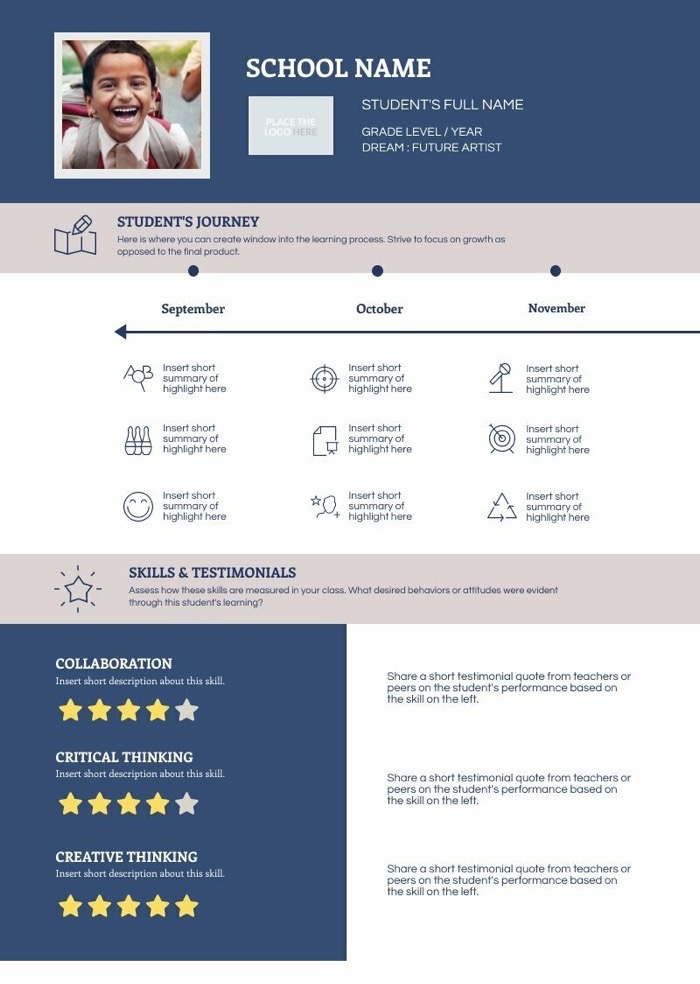
57. Introduction of classroom rules
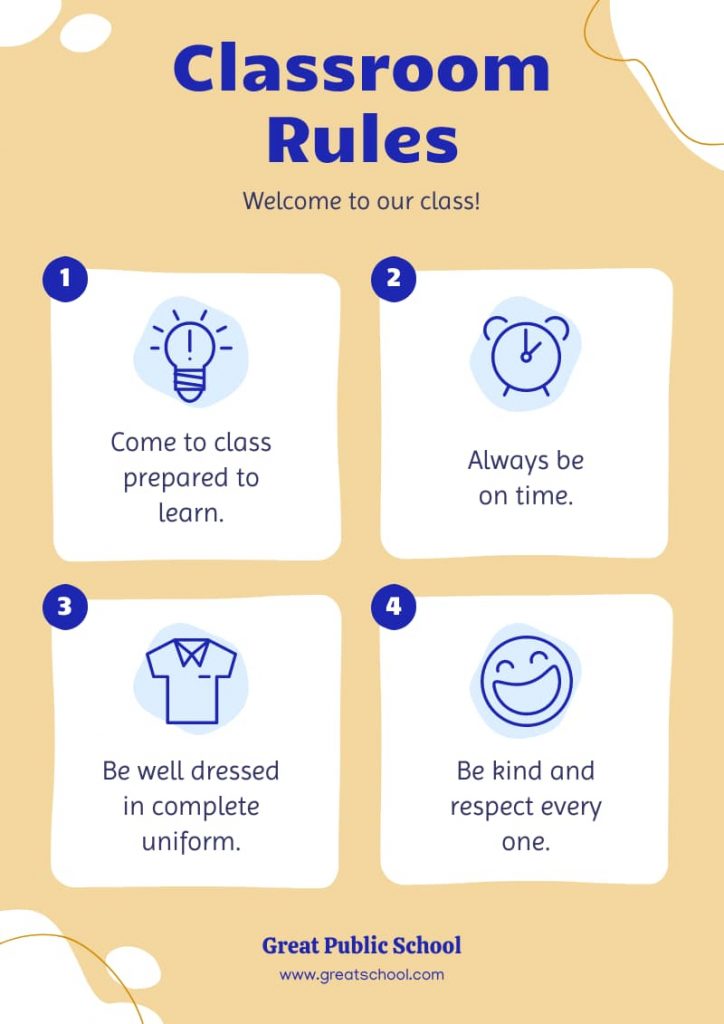
58. Assignment schedule
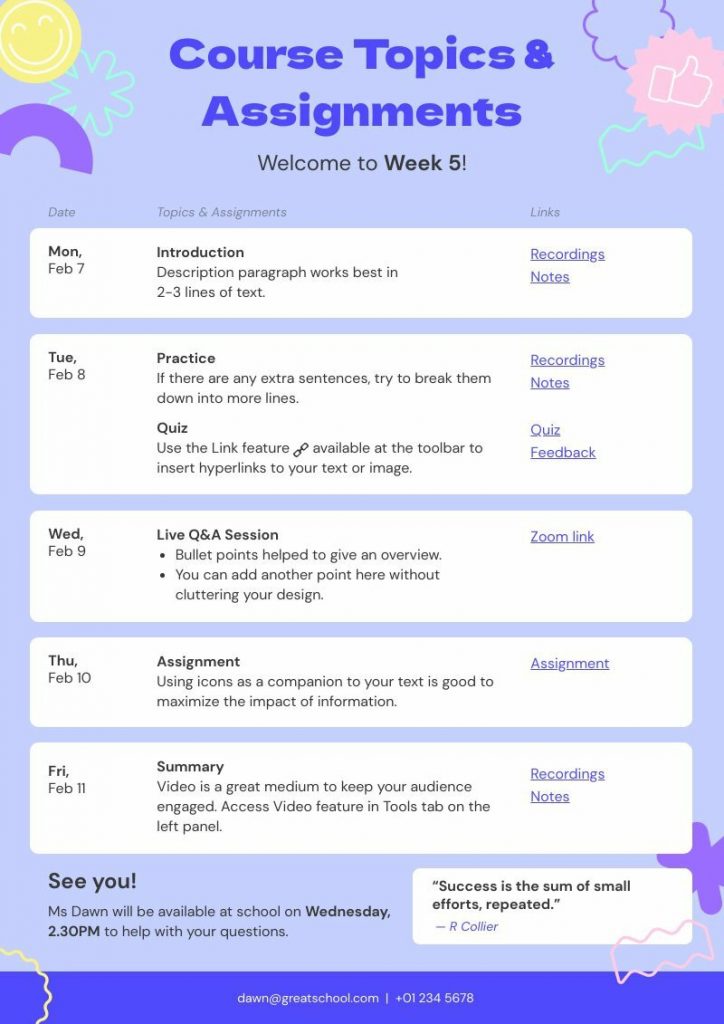
59. Daily planner
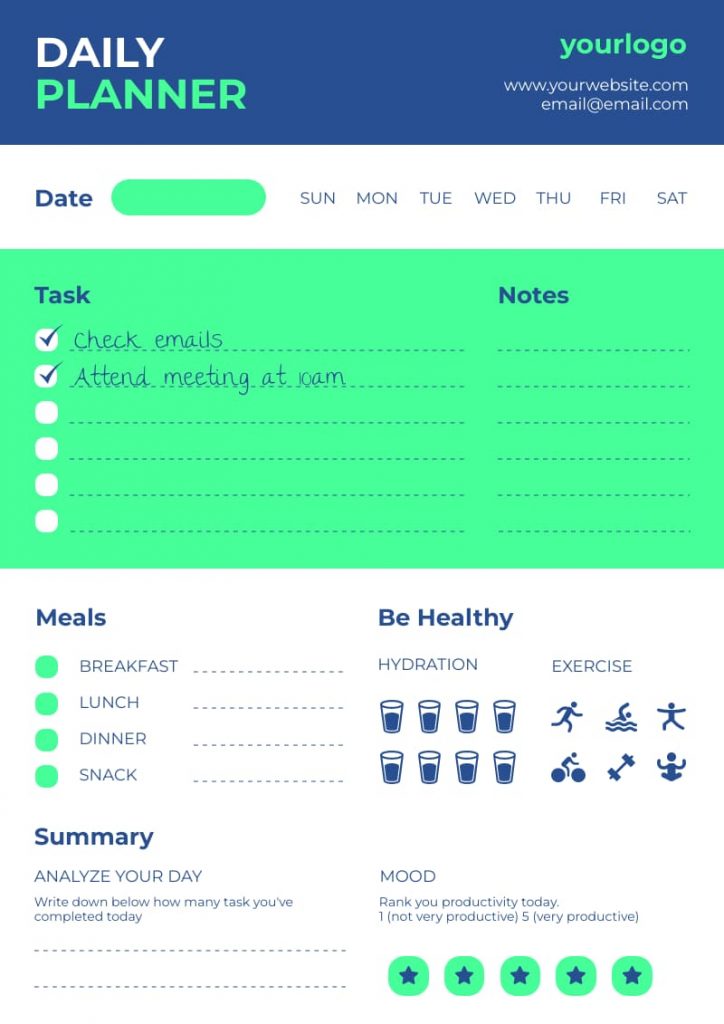
60. Course syllabus presentation
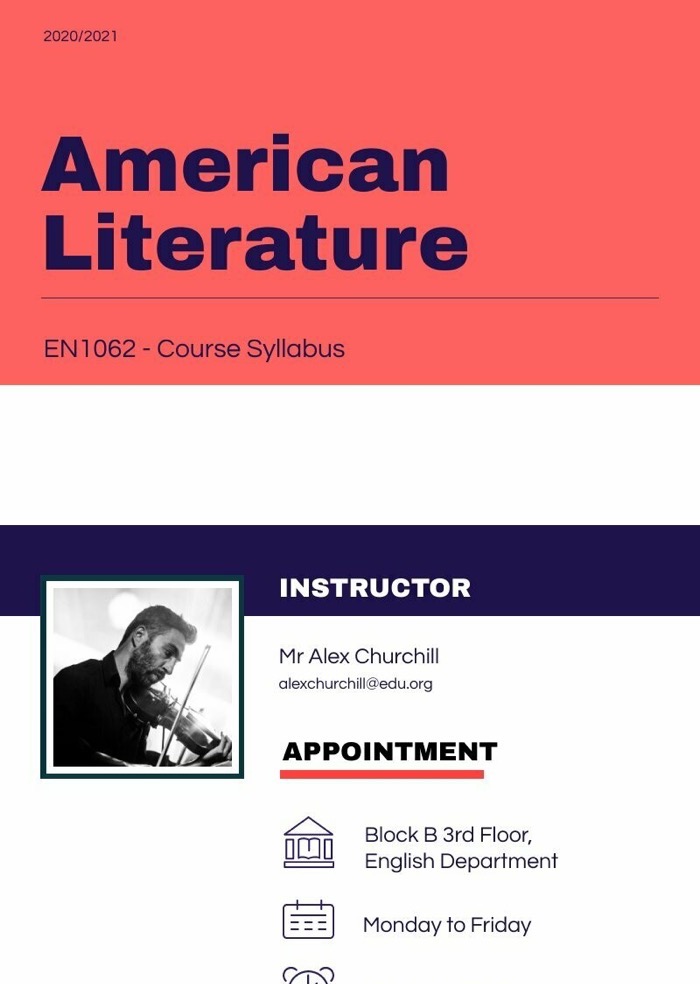
61. How to write a class presentation
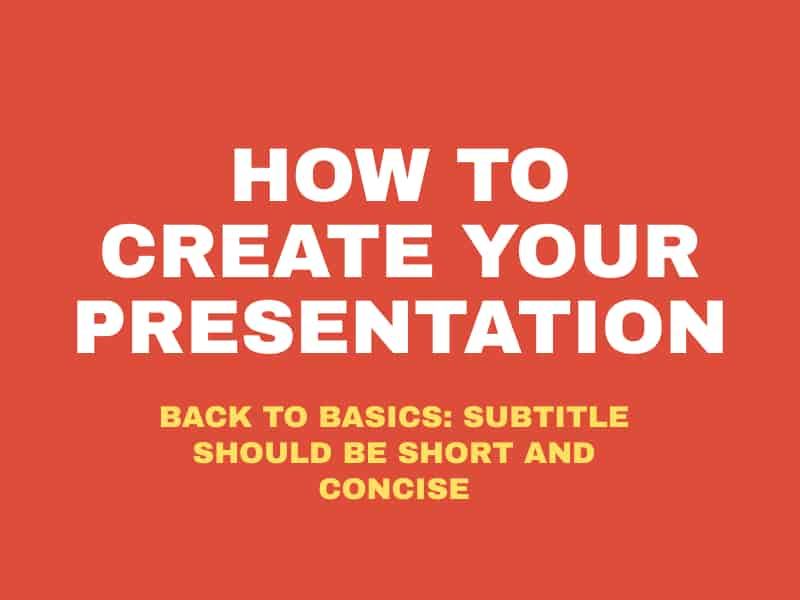
Topics to Teach Students the Importance of Effective Communication
Visual media helps students retain more of the concepts taught in the classroom. The following media topics and infographic templates can help you showcase complex concepts in a short amount of time.
In addition, interactive presentation activities using these templates also encourage the development of a holistic learning process in the classroom because they help focus on the three domains of learning: cognitive, affective, and psychomotor.
62. Interactive presentation do’s and don’ts
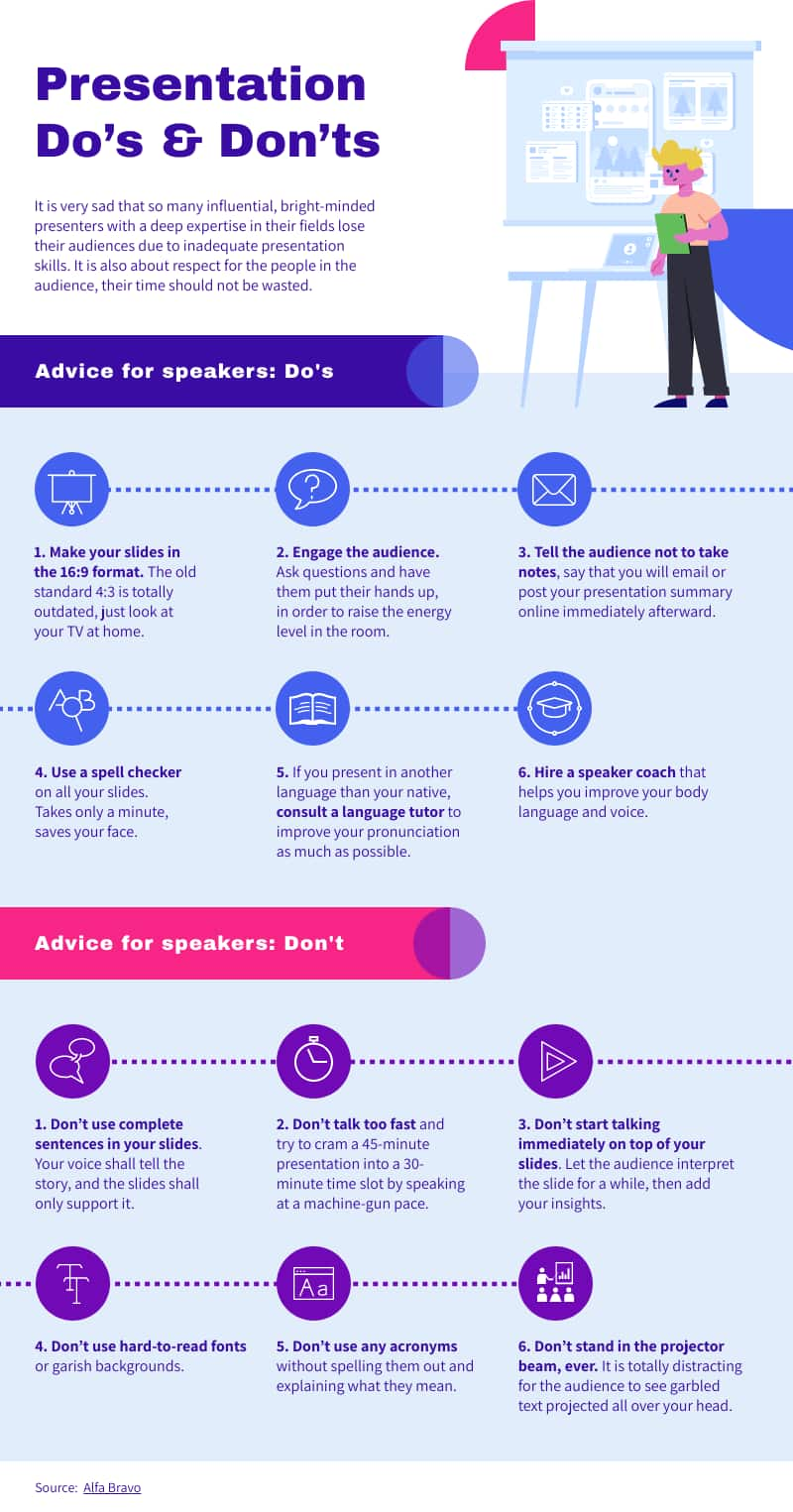
63. How to create an infographic

Recommended reading : How to Make an Infographic in 30 Minutes
64. How to improve your internet security and privacy

65. What is design thinking?

66. What are your favorite software tools to use in the classroom?
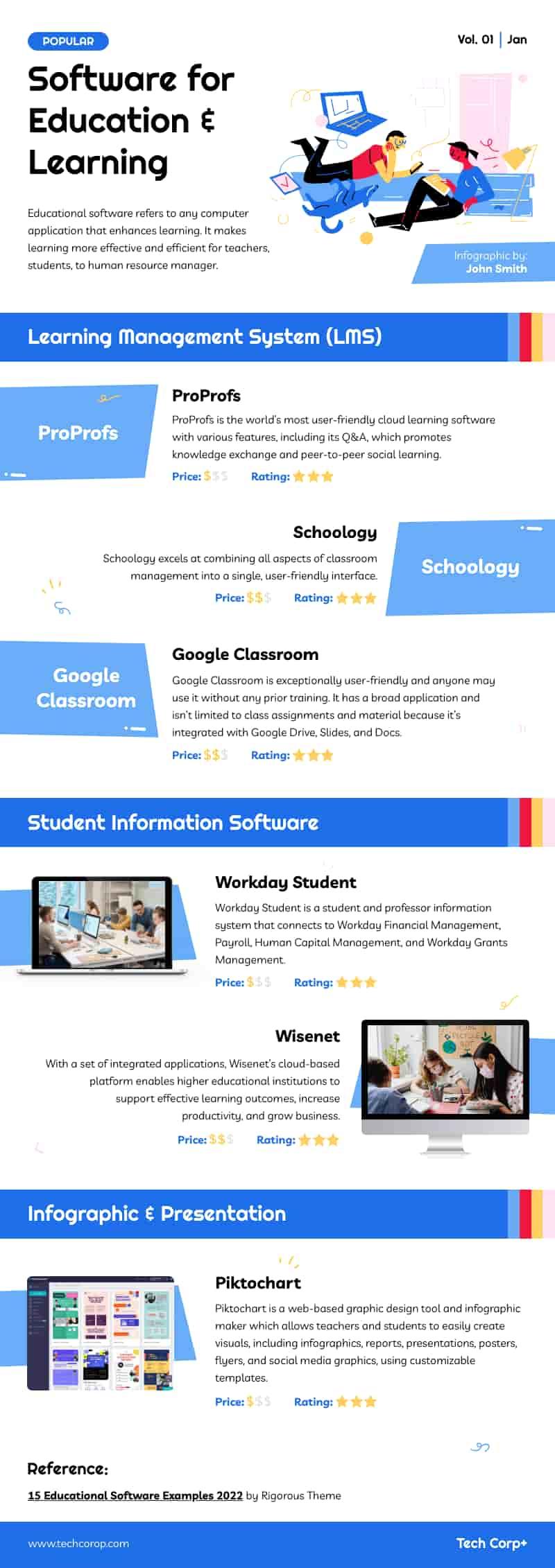
Presentation Topic Ideas to Help Students Prepare for Life After School
One of the things that makes teaching a rewarding career is seeing your students take the learning and knowledge you’ve instilled in them, and become successful, productive adults.
From pitching a business idea to starting your podcast, the following topics are good starting points to prepare students for the challenges after graduation (aka adulting 101):
67. How to make a resume
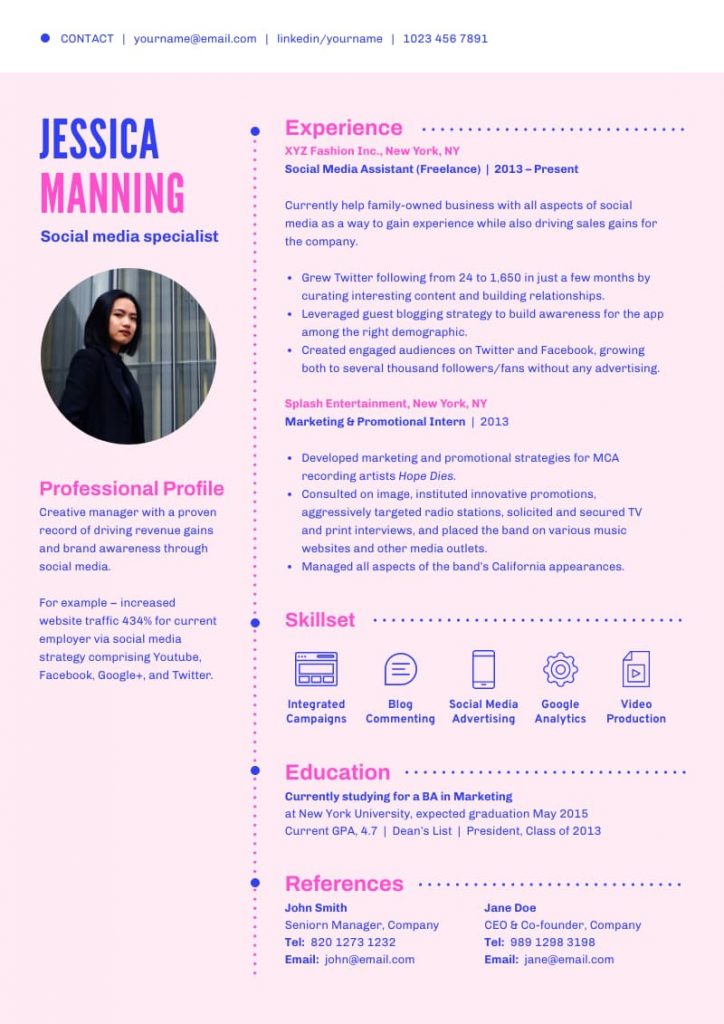
68. How to start a startup
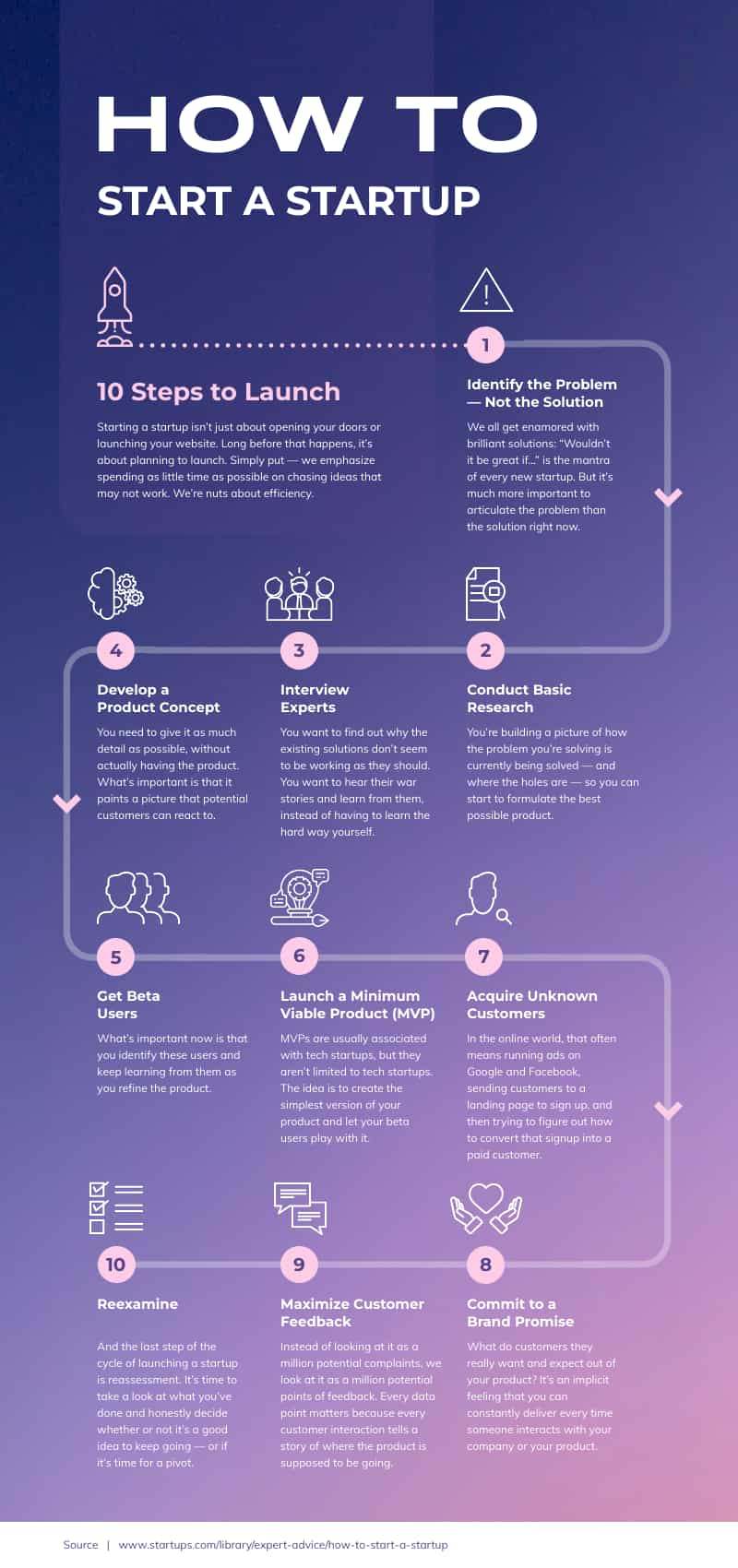
69. Credit card vs. debit card
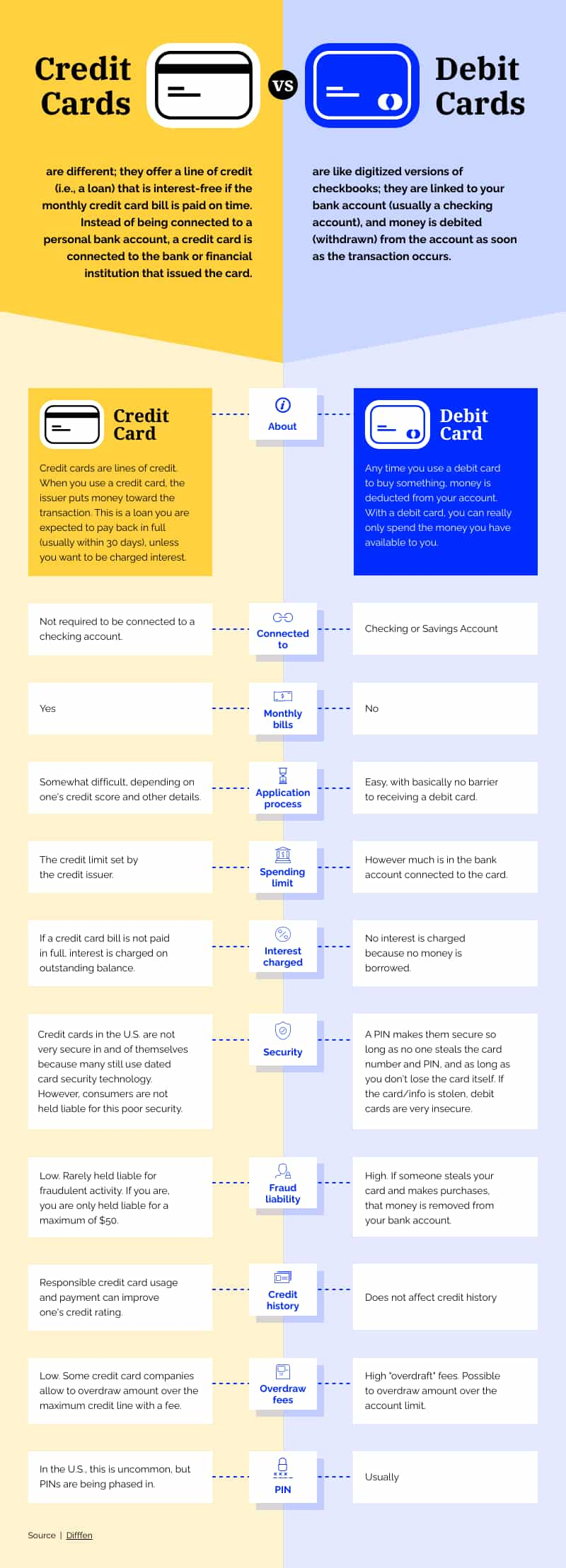
70. Pros and cons of cryptocurrency
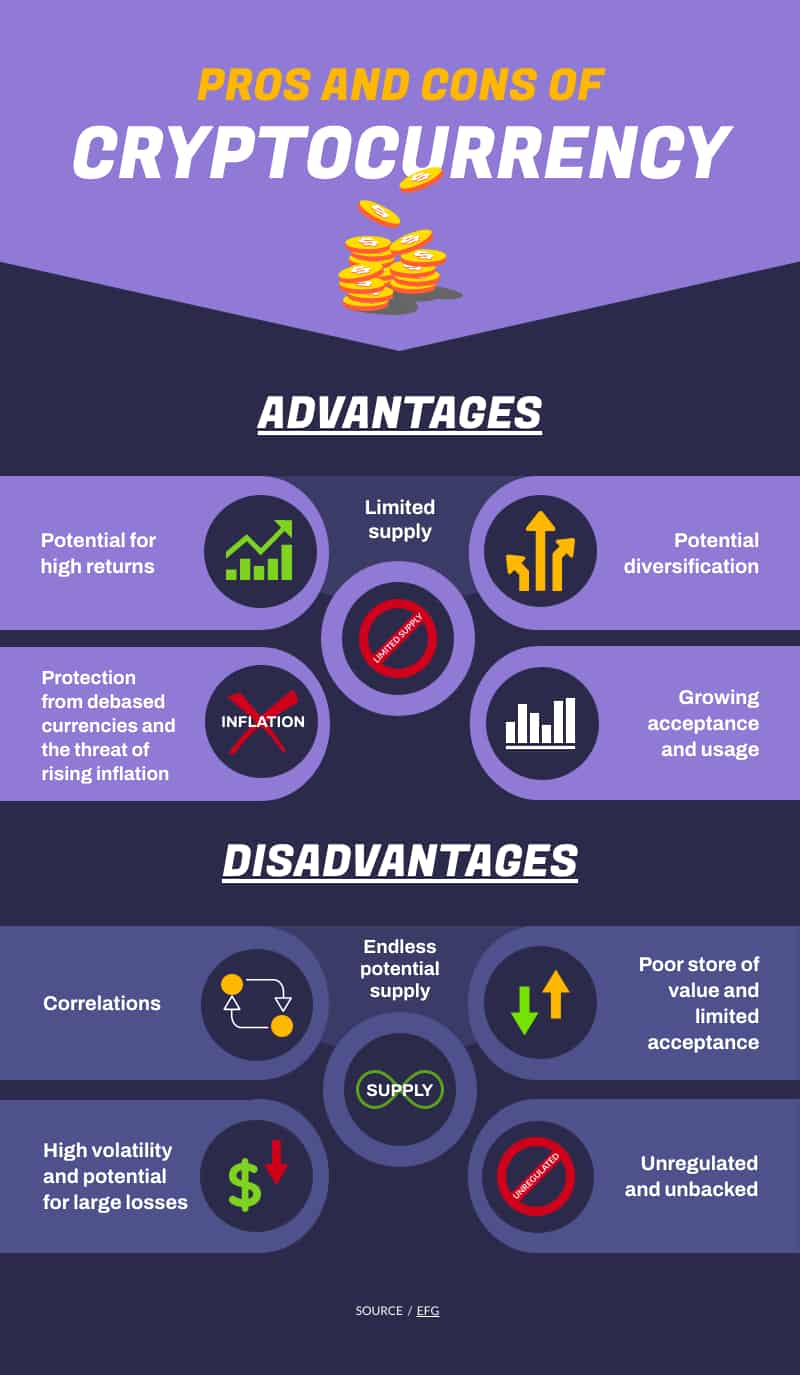
71. How to save on travel

72. How to do a SWOT analysis
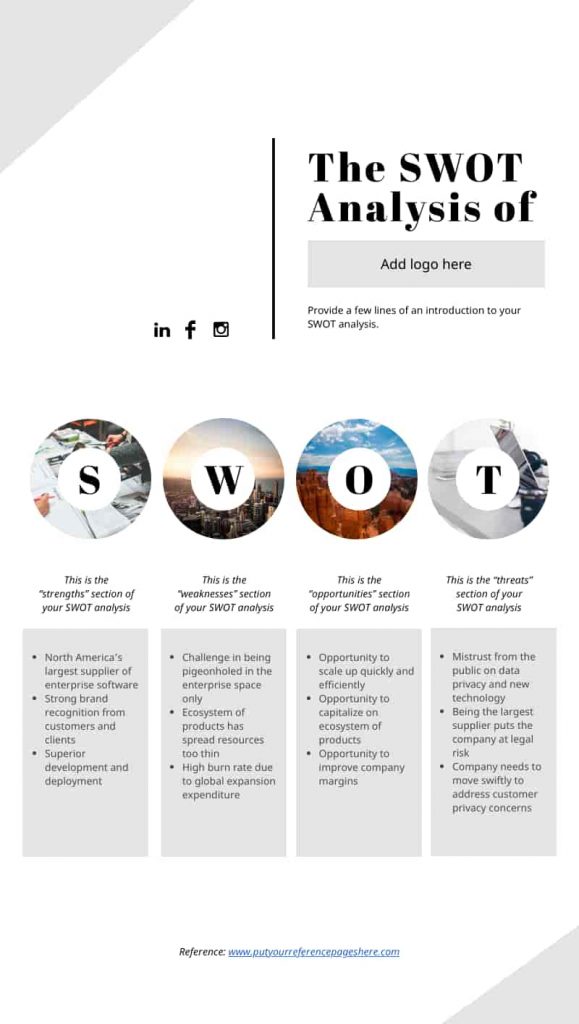
73. How to pitch a business idea

74. Habits of successful people
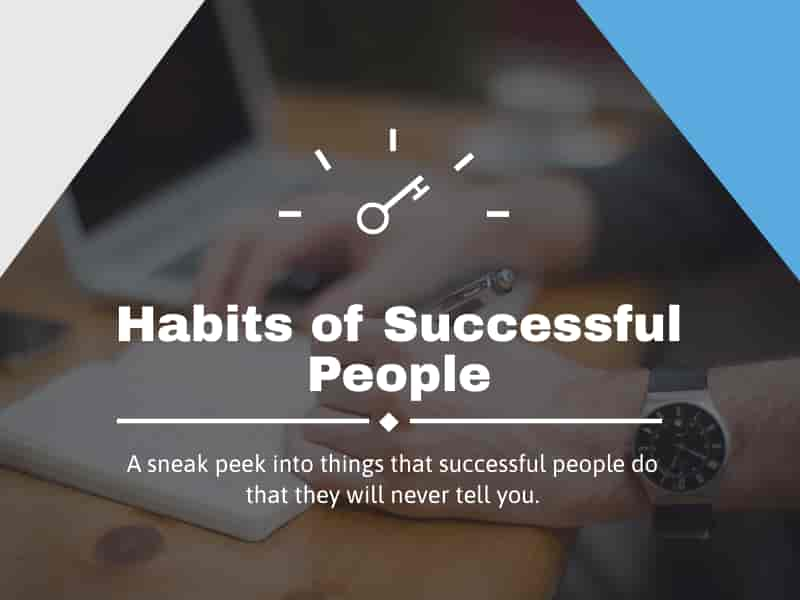
75. Starting your own podcast: A checklist

Find out how a high school teacher like Jamie Barkin uses Piktochart to improve learning in the classroom for her students.
Pro tip: make your presentation as interactive as possible. Students have an attention span of two to three minutes per year of age. To keep minds from wandering off, include some interactive games or activities in the lesson. For example, if you conducted a lesson on the respiratory system, you could ask them to practice breathing techniques.
Maintain eye contact with your students, and you’ll get instant feedback on how interested they are in the interactive presentation.
Make School Presentation Visuals Without the Hassle of Making Them From Scratch
School presentations, when done right, can help teachers engage their classes and improve students’ education effectively by presenting information using the right presentation topic.
If you’re pressed for time and resources to make your school presentation visuals , choose a template from Piktochart’s template gallery . Aside from the easy customization options, you can also print and download these templates to your preferred format.
Piktochart also professional templates to create infographics , posters , brochures , reports , and more.
Creating school-focused, engaging, and interactive presentations can be tedious at first, but with a little bit of research and Piktochart’s handy templates, you’re going to do a great job!

Other Posts
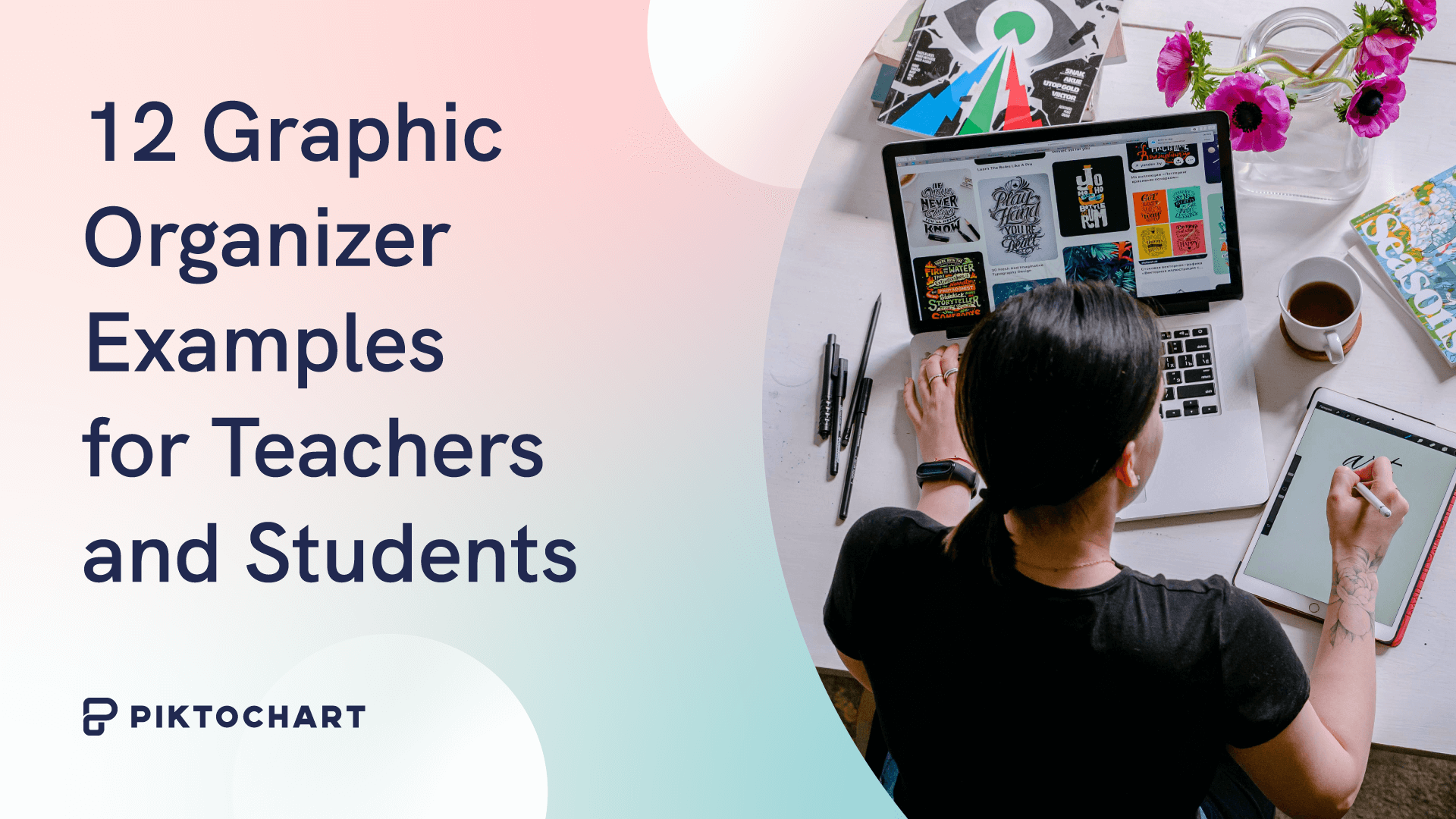
12 Graphic Organizer Examples for Teachers and Students
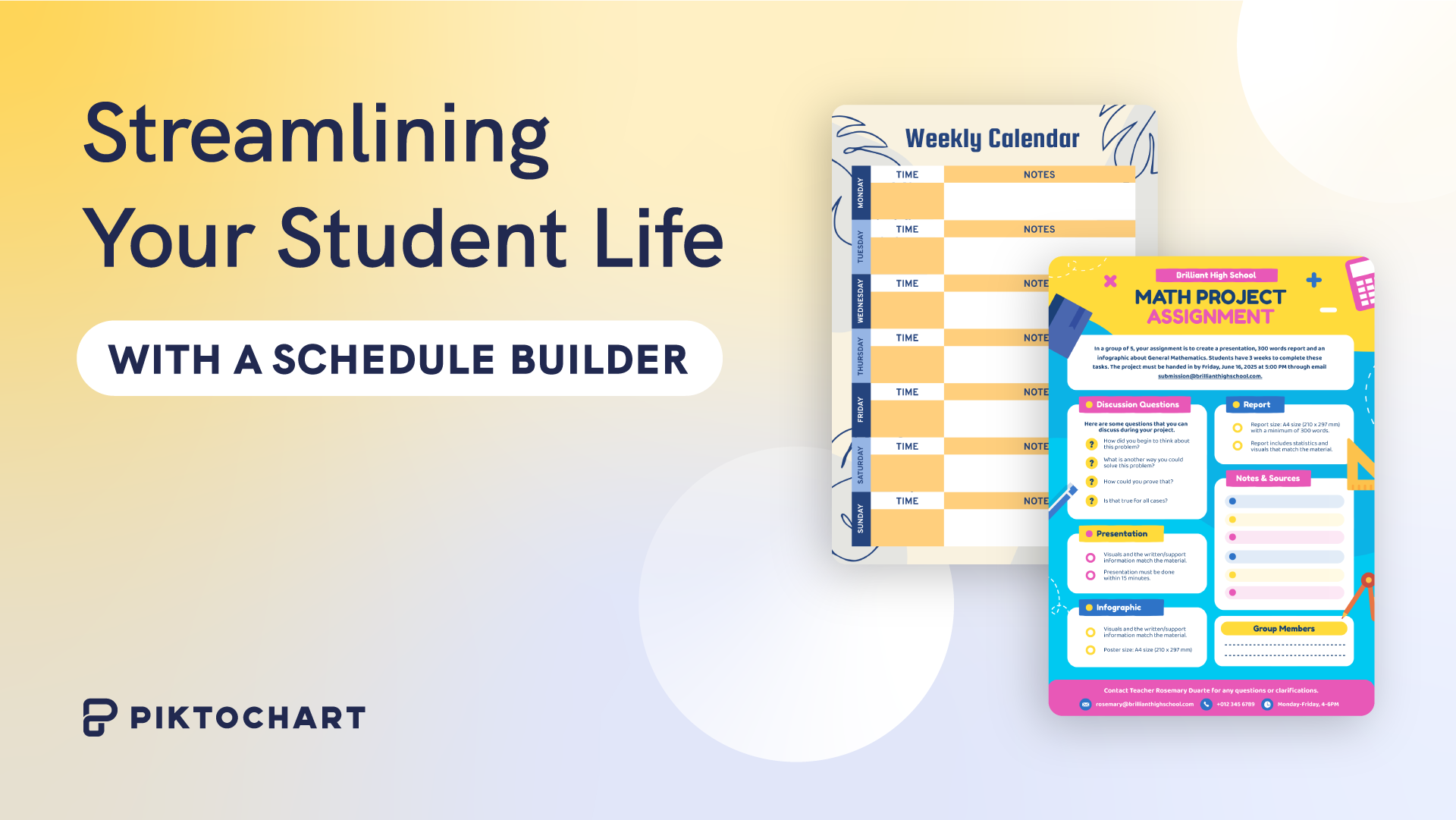
From Chaos to Clarity: Streamlining Your Student Life with a Schedule Builder
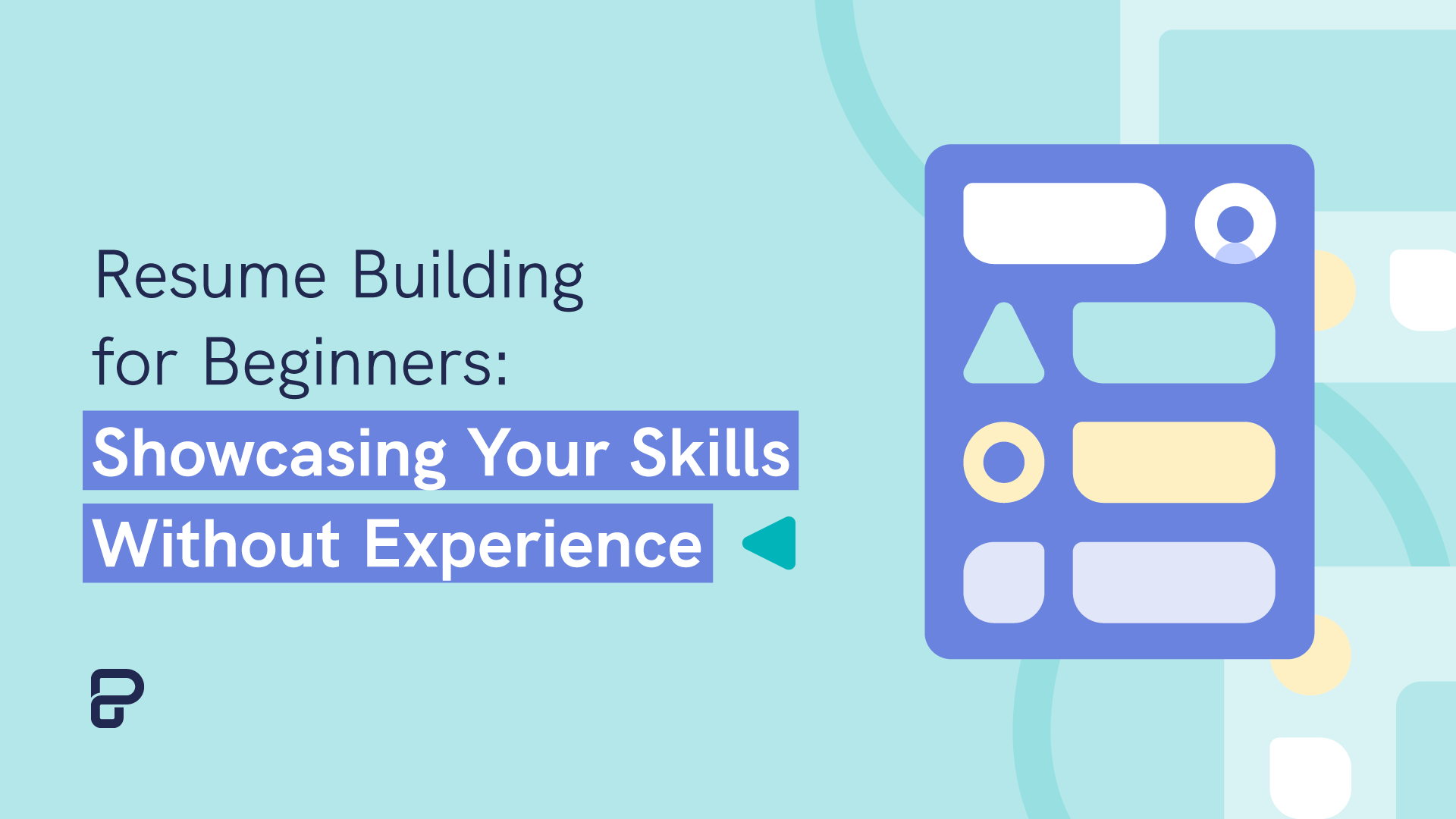
Resume with No Experience

Choose Your Test
Sat / act prep online guides and tips, 113 great research paper topics.
General Education

One of the hardest parts of writing a research paper can be just finding a good topic to write about. Fortunately we've done the hard work for you and have compiled a list of 113 interesting research paper topics. They've been organized into ten categories and cover a wide range of subjects so you can easily find the best topic for you.
In addition to the list of good research topics, we've included advice on what makes a good research paper topic and how you can use your topic to start writing a great paper.
What Makes a Good Research Paper Topic?
Not all research paper topics are created equal, and you want to make sure you choose a great topic before you start writing. Below are the three most important factors to consider to make sure you choose the best research paper topics.
#1: It's Something You're Interested In
A paper is always easier to write if you're interested in the topic, and you'll be more motivated to do in-depth research and write a paper that really covers the entire subject. Even if a certain research paper topic is getting a lot of buzz right now or other people seem interested in writing about it, don't feel tempted to make it your topic unless you genuinely have some sort of interest in it as well.
#2: There's Enough Information to Write a Paper
Even if you come up with the absolute best research paper topic and you're so excited to write about it, you won't be able to produce a good paper if there isn't enough research about the topic. This can happen for very specific or specialized topics, as well as topics that are too new to have enough research done on them at the moment. Easy research paper topics will always be topics with enough information to write a full-length paper.
Trying to write a research paper on a topic that doesn't have much research on it is incredibly hard, so before you decide on a topic, do a bit of preliminary searching and make sure you'll have all the information you need to write your paper.
#3: It Fits Your Teacher's Guidelines
Don't get so carried away looking at lists of research paper topics that you forget any requirements or restrictions your teacher may have put on research topic ideas. If you're writing a research paper on a health-related topic, deciding to write about the impact of rap on the music scene probably won't be allowed, but there may be some sort of leeway. For example, if you're really interested in current events but your teacher wants you to write a research paper on a history topic, you may be able to choose a topic that fits both categories, like exploring the relationship between the US and North Korea. No matter what, always get your research paper topic approved by your teacher first before you begin writing.
113 Good Research Paper Topics
Below are 113 good research topics to help you get you started on your paper. We've organized them into ten categories to make it easier to find the type of research paper topics you're looking for.
Arts/Culture
- Discuss the main differences in art from the Italian Renaissance and the Northern Renaissance .
- Analyze the impact a famous artist had on the world.
- How is sexism portrayed in different types of media (music, film, video games, etc.)? Has the amount/type of sexism changed over the years?
- How has the music of slaves brought over from Africa shaped modern American music?
- How has rap music evolved in the past decade?
- How has the portrayal of minorities in the media changed?

Current Events
- What have been the impacts of China's one child policy?
- How have the goals of feminists changed over the decades?
- How has the Trump presidency changed international relations?
- Analyze the history of the relationship between the United States and North Korea.
- What factors contributed to the current decline in the rate of unemployment?
- What have been the impacts of states which have increased their minimum wage?
- How do US immigration laws compare to immigration laws of other countries?
- How have the US's immigration laws changed in the past few years/decades?
- How has the Black Lives Matter movement affected discussions and view about racism in the US?
- What impact has the Affordable Care Act had on healthcare in the US?
- What factors contributed to the UK deciding to leave the EU (Brexit)?
- What factors contributed to China becoming an economic power?
- Discuss the history of Bitcoin or other cryptocurrencies (some of which tokenize the S&P 500 Index on the blockchain) .
- Do students in schools that eliminate grades do better in college and their careers?
- Do students from wealthier backgrounds score higher on standardized tests?
- Do students who receive free meals at school get higher grades compared to when they weren't receiving a free meal?
- Do students who attend charter schools score higher on standardized tests than students in public schools?
- Do students learn better in same-sex classrooms?
- How does giving each student access to an iPad or laptop affect their studies?
- What are the benefits and drawbacks of the Montessori Method ?
- Do children who attend preschool do better in school later on?
- What was the impact of the No Child Left Behind act?
- How does the US education system compare to education systems in other countries?
- What impact does mandatory physical education classes have on students' health?
- Which methods are most effective at reducing bullying in schools?
- Do homeschoolers who attend college do as well as students who attended traditional schools?
- Does offering tenure increase or decrease quality of teaching?
- How does college debt affect future life choices of students?
- Should graduate students be able to form unions?

- What are different ways to lower gun-related deaths in the US?
- How and why have divorce rates changed over time?
- Is affirmative action still necessary in education and/or the workplace?
- Should physician-assisted suicide be legal?
- How has stem cell research impacted the medical field?
- How can human trafficking be reduced in the United States/world?
- Should people be able to donate organs in exchange for money?
- Which types of juvenile punishment have proven most effective at preventing future crimes?
- Has the increase in US airport security made passengers safer?
- Analyze the immigration policies of certain countries and how they are similar and different from one another.
- Several states have legalized recreational marijuana. What positive and negative impacts have they experienced as a result?
- Do tariffs increase the number of domestic jobs?
- Which prison reforms have proven most effective?
- Should governments be able to censor certain information on the internet?
- Which methods/programs have been most effective at reducing teen pregnancy?
- What are the benefits and drawbacks of the Keto diet?
- How effective are different exercise regimes for losing weight and maintaining weight loss?
- How do the healthcare plans of various countries differ from each other?
- What are the most effective ways to treat depression ?
- What are the pros and cons of genetically modified foods?
- Which methods are most effective for improving memory?
- What can be done to lower healthcare costs in the US?
- What factors contributed to the current opioid crisis?
- Analyze the history and impact of the HIV/AIDS epidemic .
- Are low-carbohydrate or low-fat diets more effective for weight loss?
- How much exercise should the average adult be getting each week?
- Which methods are most effective to get parents to vaccinate their children?
- What are the pros and cons of clean needle programs?
- How does stress affect the body?
- Discuss the history of the conflict between Israel and the Palestinians.
- What were the causes and effects of the Salem Witch Trials?
- Who was responsible for the Iran-Contra situation?
- How has New Orleans and the government's response to natural disasters changed since Hurricane Katrina?
- What events led to the fall of the Roman Empire?
- What were the impacts of British rule in India ?
- Was the atomic bombing of Hiroshima and Nagasaki necessary?
- What were the successes and failures of the women's suffrage movement in the United States?
- What were the causes of the Civil War?
- How did Abraham Lincoln's assassination impact the country and reconstruction after the Civil War?
- Which factors contributed to the colonies winning the American Revolution?
- What caused Hitler's rise to power?
- Discuss how a specific invention impacted history.
- What led to Cleopatra's fall as ruler of Egypt?
- How has Japan changed and evolved over the centuries?
- What were the causes of the Rwandan genocide ?

- Why did Martin Luther decide to split with the Catholic Church?
- Analyze the history and impact of a well-known cult (Jonestown, Manson family, etc.)
- How did the sexual abuse scandal impact how people view the Catholic Church?
- How has the Catholic church's power changed over the past decades/centuries?
- What are the causes behind the rise in atheism/ agnosticism in the United States?
- What were the influences in Siddhartha's life resulted in him becoming the Buddha?
- How has media portrayal of Islam/Muslims changed since September 11th?
Science/Environment
- How has the earth's climate changed in the past few decades?
- How has the use and elimination of DDT affected bird populations in the US?
- Analyze how the number and severity of natural disasters have increased in the past few decades.
- Analyze deforestation rates in a certain area or globally over a period of time.
- How have past oil spills changed regulations and cleanup methods?
- How has the Flint water crisis changed water regulation safety?
- What are the pros and cons of fracking?
- What impact has the Paris Climate Agreement had so far?
- What have NASA's biggest successes and failures been?
- How can we improve access to clean water around the world?
- Does ecotourism actually have a positive impact on the environment?
- Should the US rely on nuclear energy more?
- What can be done to save amphibian species currently at risk of extinction?
- What impact has climate change had on coral reefs?
- How are black holes created?
- Are teens who spend more time on social media more likely to suffer anxiety and/or depression?
- How will the loss of net neutrality affect internet users?
- Analyze the history and progress of self-driving vehicles.
- How has the use of drones changed surveillance and warfare methods?
- Has social media made people more or less connected?
- What progress has currently been made with artificial intelligence ?
- Do smartphones increase or decrease workplace productivity?
- What are the most effective ways to use technology in the classroom?
- How is Google search affecting our intelligence?
- When is the best age for a child to begin owning a smartphone?
- Has frequent texting reduced teen literacy rates?

How to Write a Great Research Paper
Even great research paper topics won't give you a great research paper if you don't hone your topic before and during the writing process. Follow these three tips to turn good research paper topics into great papers.
#1: Figure Out Your Thesis Early
Before you start writing a single word of your paper, you first need to know what your thesis will be. Your thesis is a statement that explains what you intend to prove/show in your paper. Every sentence in your research paper will relate back to your thesis, so you don't want to start writing without it!
As some examples, if you're writing a research paper on if students learn better in same-sex classrooms, your thesis might be "Research has shown that elementary-age students in same-sex classrooms score higher on standardized tests and report feeling more comfortable in the classroom."
If you're writing a paper on the causes of the Civil War, your thesis might be "While the dispute between the North and South over slavery is the most well-known cause of the Civil War, other key causes include differences in the economies of the North and South, states' rights, and territorial expansion."
#2: Back Every Statement Up With Research
Remember, this is a research paper you're writing, so you'll need to use lots of research to make your points. Every statement you give must be backed up with research, properly cited the way your teacher requested. You're allowed to include opinions of your own, but they must also be supported by the research you give.
#3: Do Your Research Before You Begin Writing
You don't want to start writing your research paper and then learn that there isn't enough research to back up the points you're making, or, even worse, that the research contradicts the points you're trying to make!
Get most of your research on your good research topics done before you begin writing. Then use the research you've collected to create a rough outline of what your paper will cover and the key points you're going to make. This will help keep your paper clear and organized, and it'll ensure you have enough research to produce a strong paper.
What's Next?
Are you also learning about dynamic equilibrium in your science class? We break this sometimes tricky concept down so it's easy to understand in our complete guide to dynamic equilibrium .
Thinking about becoming a nurse practitioner? Nurse practitioners have one of the fastest growing careers in the country, and we have all the information you need to know about what to expect from nurse practitioner school .
Want to know the fastest and easiest ways to convert between Fahrenheit and Celsius? We've got you covered! Check out our guide to the best ways to convert Celsius to Fahrenheit (or vice versa).
These recommendations are based solely on our knowledge and experience. If you purchase an item through one of our links, PrepScholar may receive a commission.

Christine graduated from Michigan State University with degrees in Environmental Biology and Geography and received her Master's from Duke University. In high school she scored in the 99th percentile on the SAT and was named a National Merit Finalist. She has taught English and biology in several countries.
Ask a Question Below
Have any questions about this article or other topics? Ask below and we'll reply!
Improve With Our Famous Guides
- For All Students
The 5 Strategies You Must Be Using to Improve 160+ SAT Points
How to Get a Perfect 1600, by a Perfect Scorer
Series: How to Get 800 on Each SAT Section:
Score 800 on SAT Math
Score 800 on SAT Reading
Score 800 on SAT Writing
Series: How to Get to 600 on Each SAT Section:
Score 600 on SAT Math
Score 600 on SAT Reading
Score 600 on SAT Writing
Free Complete Official SAT Practice Tests
What SAT Target Score Should You Be Aiming For?
15 Strategies to Improve Your SAT Essay
The 5 Strategies You Must Be Using to Improve 4+ ACT Points
How to Get a Perfect 36 ACT, by a Perfect Scorer
Series: How to Get 36 on Each ACT Section:
36 on ACT English
36 on ACT Math
36 on ACT Reading
36 on ACT Science
Series: How to Get to 24 on Each ACT Section:
24 on ACT English
24 on ACT Math
24 on ACT Reading
24 on ACT Science
What ACT target score should you be aiming for?
ACT Vocabulary You Must Know
ACT Writing: 15 Tips to Raise Your Essay Score
How to Get Into Harvard and the Ivy League
How to Get a Perfect 4.0 GPA
How to Write an Amazing College Essay
What Exactly Are Colleges Looking For?
Is the ACT easier than the SAT? A Comprehensive Guide
Should you retake your SAT or ACT?
When should you take the SAT or ACT?
Stay Informed
Get the latest articles and test prep tips!
Looking for Graduate School Test Prep?
Check out our top-rated graduate blogs here:
GRE Online Prep Blog
GMAT Online Prep Blog
TOEFL Online Prep Blog
Holly R. "I am absolutely overjoyed and cannot thank you enough for helping me!”

- Master Your Homework
- Do My Homework
Ideas for Middle School Research Projects
Middle school students often find themselves looking for research project ideas that are both interesting and engaging. While the exact topics may vary based on age, subject area, or teacher preference, it is important to ensure middle schoolers have an opportunity to explore their own interests through relevant projects. This article provides a comprehensive overview of potential research project ideas suitable for middle school classrooms and suggests ways in which teachers can assist their students in researching these topics effectively. By considering some of the unique challenges associated with this educational level, educators can create meaningful learning opportunities for their pupils while guiding them towards further understanding of complex concepts within diverse subject areas.
I. Introduction
Ii. identifying a research topic, iii. developing an argumentative thesis statement, iv. gathering information and sources, v. outlining the project structure, vi. writing the report, vii. presentation of findings.
Writing a research paper is an important part of any student’s academic journey. Middle schoolers have unique opportunities to explore different topics that are engaging and relevant to their current learning level. From making connections with history and modern society, to exploring natural phenomena or the power of technology, there are plenty of interesting ideas for research papers at this age.
- How do global warming trends influence local weather patterns?
- What can be done to reduce pollution in urban areas?
Students can also delve into popular culture or even STEM topics such as robotics and coding programs. Researching controversial issues like immigration policies or healthcare reform helps students understand complex topics from multiple angles:
- What factors should be considered when developing new immigration laws?
Selecting a research topic can be a daunting task, but with the right approach it is possible to find an appropriate and interesting subject. At the middle school level, students are often limited in scope due to their age and lack of experience; however, there remain ample topics for exploration.
- The importance of physical education in schools.
- Factors that influence teen suicide rates.
In order to construct an argumentative thesis statement, it is necessary to understand the fundamentals of writing a strong and convincing argument. This includes selecting a topic that has two distinct sides, researching both perspectives thoroughly and then using evidence to support your own opinion.
- Step 1: Selecting A Topic
When deciding on research paper topics for middle school students, pick something with multiple points of view so that there is room for debate. Consider current issues such as gun control or standardized testing in education; any controversial topic can make great fodder for an argumentative essay. It’s also important to choose one side or another early on – you will have difficulty making an effective case if you remain undecided by the end!
- Step 2: Conducting Research & Building Evidence
Accumulating Knowledge and Resources: Gathering information for your research paper can be an overwhelming process, but by breaking it down into manageable steps you’ll have the confidence to tackle any topic. The first step is finding reliable sources of information; look for credible online databases like those from universities or established organizations in addition to books, magazines, and newspapers. You should also consider using primary sources such as interviews or surveys if available. As a middle schooler researching potential topics could be especially daunting – why not begin with something close-to-home that interests you? Here are some suggested research paper topics suited for young learners:
- Exploring Different Forms of Renewable Energy Sources
- Examining the Benefits of Eating Organic Foods
When it comes to outlining the project structure, there are several factors that need to be taken into consideration. From deciding what research paper topics for middle school students should tackle, to selecting which materials and resources will best suit their needs.
- Societal Impact of Technology on Education
In addition, consider ways in which you can ensure students stay focused throughout their project as well as how you can help them reach a successful outcome. For example: setting achievable goals along with realistic timelines for completion; providing helpful feedback and assistance when needed; using data visualization tools or storyboards where appropriate. .
This section focuses on the preparation and writing of a report. To begin with, there are three primary components to consider: research, structure, and language.
- Research is essential for any successful project; it requires collecting information from reliable sources in order to support your argument or point of view.
- Structure helps organize thoughts into logical sections that clearly convey ideas through appropriate sequencing.
Middle school students may encounter an assignment requiring them to write a comprehensive paper on a particular topic.
In either case
Evaluating and Explaining Findings The research conducted in this paper has yielded a variety of findings, each worth exploring and further understanding. For example, data collected on the topic of student success showed that students who participated in extra-curricular activities had significantly higher GPAs than those who did not participate. Similarly, it was found that when given the opportunity to pick their own research paper topics for middle school classes – such as “the effects of technology on society” or “the benefits of healthy eating habits” – students were more likely to stay engaged with the assignment and show greater interest overall.
On the other hand, while exploration into different academic models revealed promising results concerning student performance based upon teaching styles employed by teachers (such as inquiry-based learning), it was noted that socio-economic factors outside of an educational setting still presented notable roadblocks for some participants regardless which approach was used. These revelations indicate a need for additional strategies to be implemented both inside and outside classrooms to ensure equitable access and outcomes among all learners despite external influences beyond their control.
To conclude, middle school research projects can be a great opportunity to teach students the fundamentals of effective research and provide them with an introduction to understanding complex topics. These ideas for middle school research projects are just some of the many possible ways that teachers and educators can help their students develop this important skill set. With proper guidance from experienced professionals and access to reliable sources, these research project assignments can become engaging learning experiences for everyone involved.

ChatGPT for Teachers
Trauma-informed practices in schools, teacher well-being, cultivating diversity, equity, & inclusion, integrating technology in the classroom, social-emotional development, covid-19 resources, invest in resilience: summer toolkit, civics & resilience, all toolkits, degree programs, trauma-informed professional development, teacher licensure & certification, how to become - career information, classroom management, instructional design, lifestyle & self-care, online higher ed teaching, current events, how to help middle school students develop research skills.

As the research skills you teach middle school students can last them all their lives, it’s essential to help them develop good habits early in their school careers.
Research skills are useful in nearly every subject, whether it’s English, math, social studies or science, and they will continue to pay off for students every day of their schooling. Understanding the most important research skills that middle school students need will help reach these kids and make a long-term difference.
The research process
It is important for every student to understand that research is actually a process rather than something that happens naturally. The best researchers develop a process that allows them to fully comprehend the ideas they are researching and also turn the data into information that is usable for whatever the end purpose may be. Here is an example of a research process that you may consider using when teaching research skills in your middle school classroom:
- Form a question : Research should be targeted; develop a question you want to answer before progressing any further.
- Decide on resources : Not every resource is good for every question/problem. Identify the resources that will work best for you.
- Gather raw data : First, gather information in its rawest form; do not attempt to make sense of it at this point.
- Sort the data : After you have the information in front of you, decide what is important to you and how you will use it. Not all data will be reliable or worthwhile.
- Process information : Turn the data into usable information. This processing step may take longer than the rest combined. This is where you really see your data shape into something exciting.
- Create a final piece : This is where you would write a research paper, create a project or build a graph or other visual piece with your information. This may or may not be a formal document.
- Evaluate : Look back on the process. Where did you experience success and failure? Did you find an answer to your question?
This process can be adjusted to suit the needs of your particular classroom or the project you are working on. Just remember that the goal is not only to find the data for this particular project, but to teach your students research skills that will help them in the long run.
Research is a very important part of the learning process as well as being useful in real-life once the student graduates. Middle school is a great time to develop these skills as many high school teachers expect that students already have this knowledge.
Students who are well-prepared as researchers will be able to handle nearly any assignment that comes their way. Finding new ways to teach research skills to middle school students need will be a challenge, but the results are well worth it as you see your students succeed in your classroom and set the stage for further success throughout their schooling experience.
You may also like to read
- Web Research Skills: Teaching Your Students the Fundamentals
- Building Math Skills in High School Students
- How to Help High School Students with Career Research
- Five Free Websites for Students to Build Research Skills
- Homework in Middle School: Building a Foundation for Study Skills
- 5 Novels for Middle School Students that Celebrate Diversity
Categorized as: Tips for Teachers and Classroom Resources
Tagged as: Engaging Activities , Middle School (Grades: 6-8)
- Math Teaching Resources | Classroom Activitie...
- Online & Campus Doctorate (EdD) in Organizati...
- Master's in Reading and Literacy Education
- Skip to primary navigation
- Skip to main content
- Skip to primary sidebar
- Skip to footer
Teaching ELA with Joy
Middle School ELA Resources
10 Ideas to Make Teaching RESEARCH Easier
By Joy Sexton 1 Comment
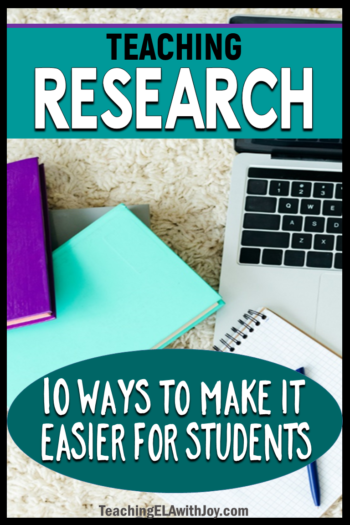
I enjoy diving into research units with my students because they get to learn new things, and I do, too! But teaching research skills is a gigantic task! And one thing’s for certain: I’ll have to break the research process into steps to keep my middle school students from feeling overwhelmed. I want them to have that “I’ve got this” attitude from the moment I introduce the project.
Of course, as teachers, we need to be prepared and have our research assignments clearly-designed. But a big key to making the process easier for me and my students, what makes the most impact I think, is modeling . If you can model what you want students to do (as opposed to just telling them), your expectations become clearer. Not everything can be modeled, but whenever the opportunity arises, it’s powerful!
Here are 10 ideas to make teaching research skills manageable and successful:
1. Make sure students start out with more than one topic option . What I mean is, it helps for each student to have “back up” topics ready to go in case the first choice isn’t panning out. For example, I’ve had students who chose a topic they were very passionate about. But it turned out that once they got searching, not enough information was turning up. In most cases, these students had decided to research very current topics like a YouTuber or a new version of iPhone or even a specific automobile. They searched and searched, but the few sites they located just repeated the same smattering of facts. It REALLY helped that the assignment required three topic choices, with students prioritizing their choices . Instead of getting all stressed out, the students just went with their second choice, and got right into note-taking. Or let’s say you are assigning topics, for example, for Holocaust research. Once they start researching, students may find a certain topic too complex and would feel more supported if they had other options.
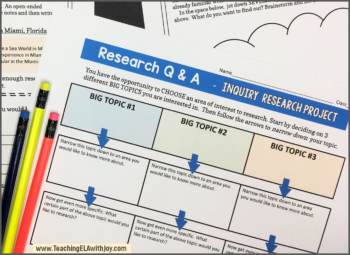
2. Don’t rule out books and other print sources. Now that so many students carry laptops, we’ve come to expect research to be Internet-based. Of course, there’s nothing wrong with that! With just a few clicks, students have access to SO MUCH information. But some of my students come and ask if they can go to the library for printed sources because they prefer taking notes from books. That reminds me that we all learn differently. It might be to our amazement, but library research is alive and well for a portion of our students. Sometimes it’s my struggling learners who go for the printed sources, but I’ve also had more advanced learners hit the books as well. Even if you’ve got kids on their laptops or in the computer lab, find a way to incorporate different types of sources in their search so you differentiate . FYI, the Common Core Standards for W.8 (the research writing) state “Gather information from multiple print and digital sources . . .” So, it looks like using some print sources is still an expectation (but not for every assignment) if you follow Common Core. Definitely let your librarian in on whatever type of research assignment you have going on. They’re usually very eager to provide support !
3. Emphasize the need to narrow search terms . So often, students just want to plop their main topic into the Google search bar, right? Unfortunately, what comes up is usually current information that is not necessarily going to hit what they need. That’s how time gets wasted. You can quickly model this skill for students with an example using a celebrity. Say you are needing information on a certain celebrity’s life—some facts about their rise to fame. Place just the name in the search bar, and what most likely comes up are articles that have been in the news about the person. Then place the name with the word “biography” in the search bar and have students notice the difference.
4. Explain the connection between research and reading . Once they have a topic, students are so ready to start note-taking! But wait, do your students understand that research starts with careful reading? First, they’ll need to preview several websites before taking any notes. I call it “Ten Minutes, Reading Only.” That’s the least they can do to look for sources that not only match their topic but meet their readability needs . Let’s face it, many websites or even printed sources are written well above some of our students’ reading levels. Let them know that if they are finding long sentences with numerous unfamiliar words, it’s time to move on. Then, once they do locate a few good sources, they still need to read! When they come upon information they understand that really hits the topic, BINGO. That’s when note-taking should begin.
5. Model note-taking using a bulleted list of short phrases . One thing is for sure: we don’t want students to copy full sentences, word for word, when they take notes. So modeling this when you’re teaching research skills is huge. I always tell students that they will create their own complete sentences when they are drafting . Note-taking is for short phrases . Just give them a heads up that they have to be able to understand the shortened information! I’ve had students who wrote phrases too short for the complex information they represented. A problem arose, of course, when trying to draft sentences. The students couldn’t remember what was actually meant by the few words they had copied down.
You can easily model note-taking by choosing a paragraph of nonfiction from a website or online encyclopedia. Project it on your whiteboard or pass out copies to the class. You can have students work with a partner to take notes in short phrases on a bulleted list. Students could then exchange papers several times to see what others came up with, and then share out what they noticed. Or, you may prefer to make the notes on your whiteboard with whole-class participation.
6. Show students the citation generator you want them to use and how it works. Teaching research skills always includes citing sources. So if you approve of students having citations created for them, I’m with you! Just be clear on which citation generator to use. I’ve always preferred www.Bibme.org , but now with all the ads on these sites, and Google Docs’ own generator, there are other options. Again, you can do a quick modeling on your Smartboard using a website. It’s a good idea to walk around during note-taking and check that each student is comfortable using the citation generator. Sometimes students are unsure but might not want to ask.
7. Offer creative formats for students to use as their research product. If you can, let them infuse some of their own passion into the topic. Let’s face it, teaching research skills is easier when students are personally invested. Your standards or district curriculum may require a research-based essay , and that’s fine. With lots of scaffolds and modeling, the results can be awesome! But how about having students report out in a newsletter format? They can break the information down into four short articles and give each one a title. Now the assignment becomes more motivating. Or require a slide presentation, with a paragraph of text on each slide along with visuals.
Another creative format is a Q & A page . My students enjoy a short project called Research Q & A , where they choose a topic they’d like to learn more about and create two questions to research. They report their findings on a Q & A sheet, using a template they type into, along with visuals.
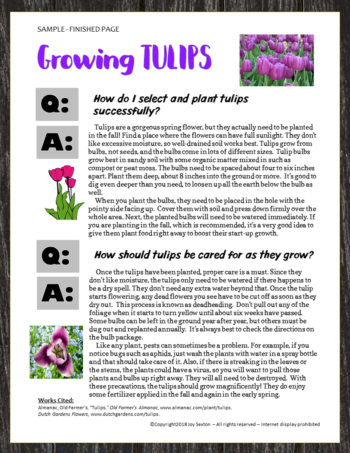
8. Have students color code their notes . This is an incredibly helpful scaffold to producing an organized draft! Once the research is completed, students should look over their notes and on a sheet of paper, list the “sub-topics” they have covered. For example, if they are writing an informational article about an athlete, their list might include childhood, training, early career steps, and best achievements. Then, with 4-5 colored pencils, they underline each sub-topic with a different color. Students then read through their notes, placing a colored bullet to match as they find content corresponding to the sub-topic.
The color coding helps make drafting each paragraph so much easier! Students just focus on all the green information on their notes pages when drafting the first body paragraph, all the purple information when drafting the second, etc.
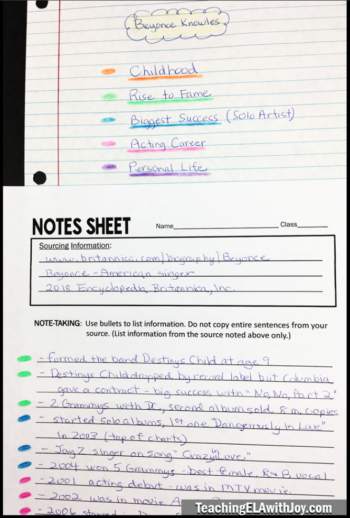
9. Require editing and revising using a different color . As English teachers, we want the revising and editing step to be meaningful. When revisions stand out this way, both students and the teacher get to visibly see a growth process. They understand that they are expected to and can notice weaknesses and make their product better. I always keep red and green pens available. And I sense that kids like using them. Another BIG plus here: individual conferencing becomes quick and easy when you can see by the colored ink which revisions have (or have not!) been made.
10. Work in some peer exchange opportunities . Students benefit from regular check-ins, but you don’t always have the time. So why not have students check in on each other? Decide on a few times in your assignment when students will need to “take stock” of things. That’s when you’ll say, exchange with a partner, and look at x, y, or z. The check can be as simple as the partners write feedback in the margin of each other’s paper, or on a post-it, or have a short discussion. For example, let’s say you allot two periods for research, and you expect three solid pages of notes. When the second class period is drawing to a close, have a partner exchange. Peers have two tasks: rate the quality of the notes on a scale of 1-5 and suggest whether note-taking is complete or more needs to be done as homework.
Students love to read each other’s papers, so work in a peer exchange during revising and editing. Have peers place a question mark in the margin next to any area that doesn’t make clear sense. You could also choose a couple specific topics for their focus, such as capital letters and commas. Students enjoy these roles and checks like these build skills and confidence .
Our goal, of course, is to make research motivating for every one of our students. By using some of these strategies, teaching research skills should become easier! I think your students will experience excitement over all the new learning their efforts bring.
I’ve developed some print-and-go research activities that students enjoy and have success with. They include step-by-step scaffolds and mentor texts to save you time. Just click on the images to have a closer look.
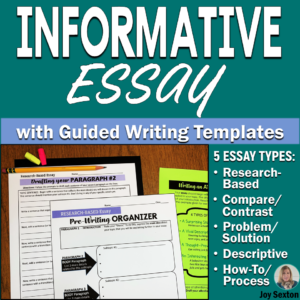
Join the Newsletter
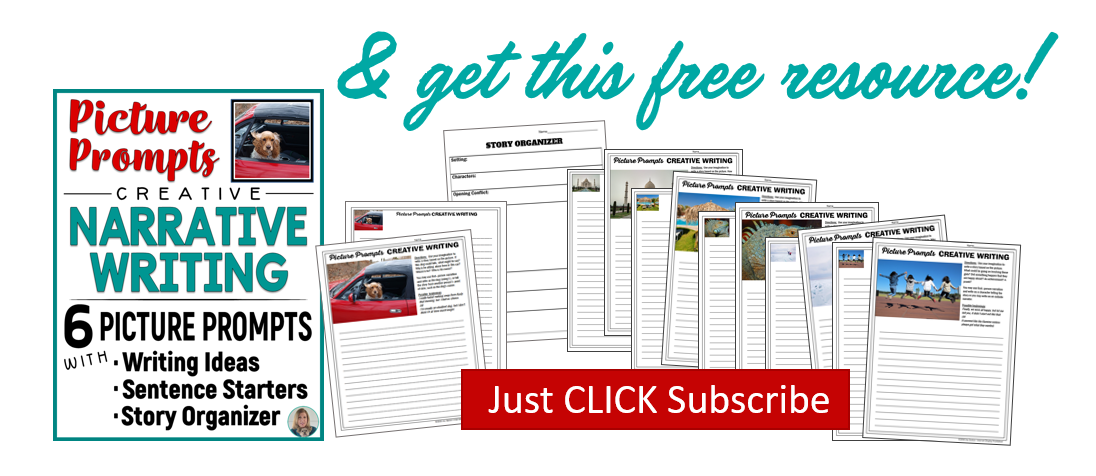
Reader Interactions
April 21, 2021 at 11:47 pm
This looks amazing. I’m so glad I found this article. I am guiding my 7th grader through a year-end research project at home and this is exactly what I needed to help guide me through it first!
Leave a Reply Cancel reply
Your email address will not be published. Required fields are marked *
Save my name, email, and website in this browser for the next time I comment.
Notify me of follow-up comments by email.
Notify me of new posts by email.
This site uses Akismet to reduce spam. Learn how your comment data is processed .

- Grades 6-12
- School Leaders
Enter Today's Teacher Appreciation Giveaway!
70+ Fascinating Informative Essay Topics for Kids and Teens
Tell them what you know.

Informative essays are a chance to show what you know. They’re all about informing the reader, without trying to persuade or offer an opinion. Informative writing can include how-to process essays, biographical writing, an in-depth analysis of a topic, research papers, or compare-and-contrast essays . Just remember to stick to the facts, and be clear and descriptive. These informative essay topics offer something for all interests and ages.
How-To Informative Essay Topics
Social studies informative essay topics, science informative essay topics, pop culture informative essay topics.
Teach your reader the steps or process to:
- Cook a recipe
- Set a table
- Make a quilt
- Change a tire
- Start a recycling program
- Play a game
- Build a birdhouse
- Plant a garden
- Make and care for a compost pile

- Care for an animal
- Start a business
- Catch a fish
- Tie a necktie
- Train for a marathon
- Prepare a campsite
- Make a campfire
- Clean a room
- Wrap a gift
- Plan a party
- Kick a bad habit
- Use social media responsibly
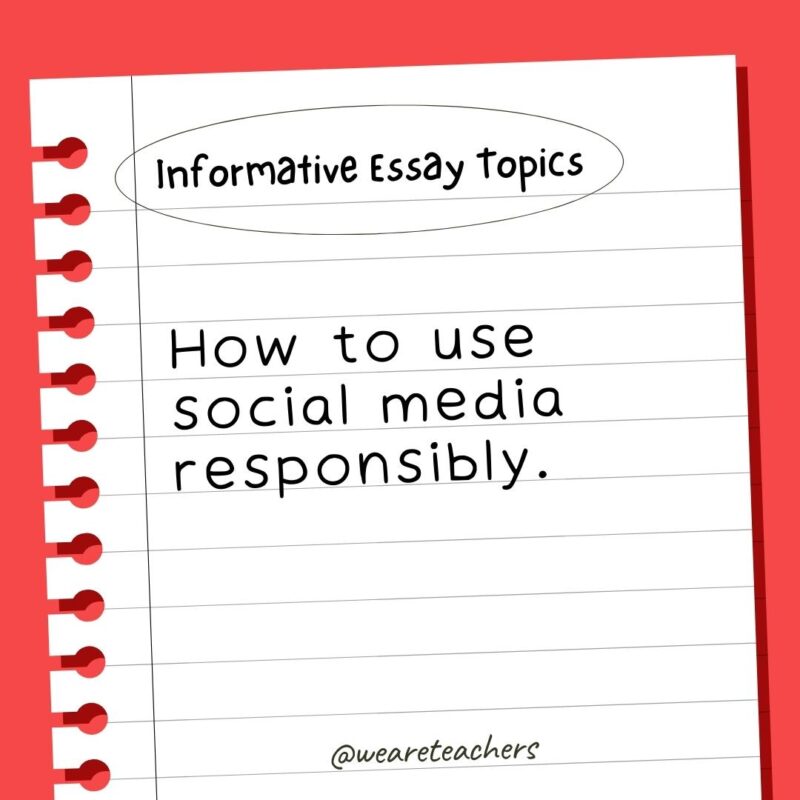
- Manage time effectively
- Make a budget
- Describe the life of a world leader.
- How has the role of women in the workplace changed in the last hundred years?
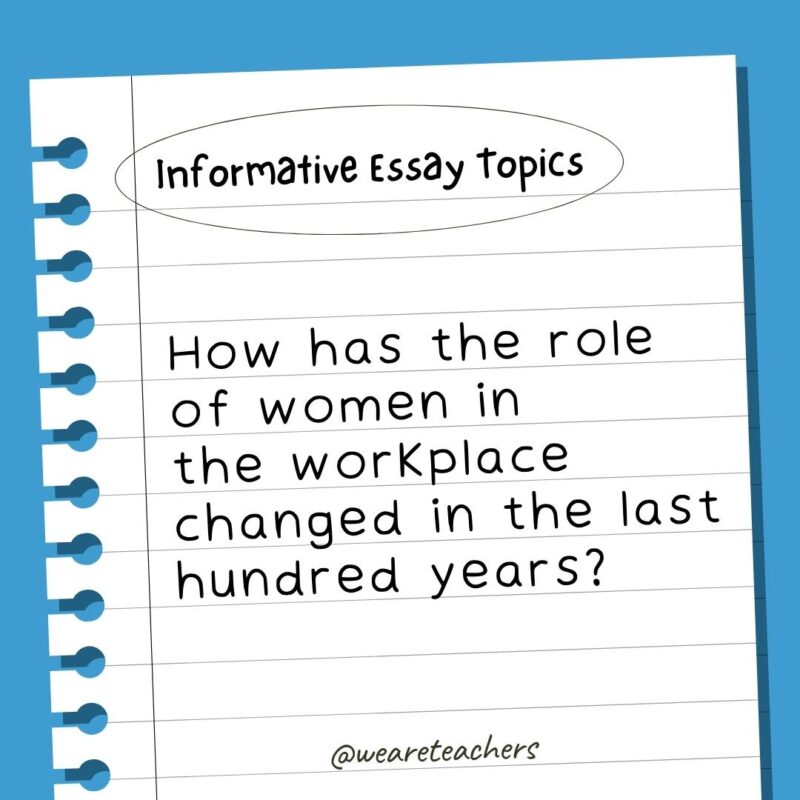
- Explore the current path to becoming an American citizen.
- What are some of the possible ways the pyramids were built?
- Describe a time period in history.
- How does one country’s economy affect another country?
- What is the difference between socialism and communism?
- Explore the benefits and drawbacks of legalizing drugs.
- Describe the political system in a foreign country.
- Explore the causes of a specific war or armed conflict in history.
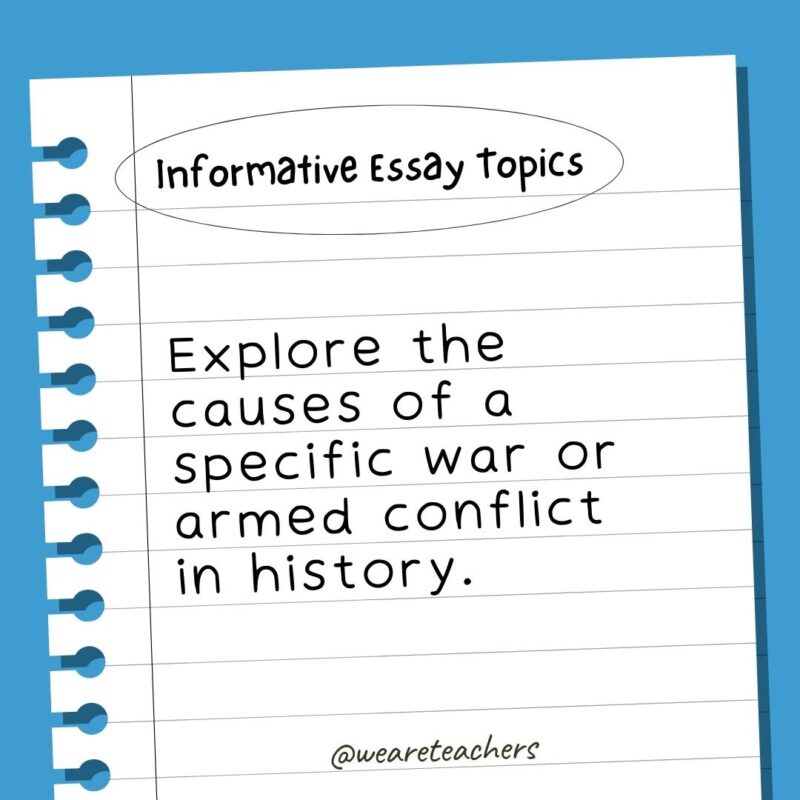
- How is a new law passed in the United States?
- Give an overview of the history of any country, state, or city.
- Describe the three branches of American government.
- Explain how the American judicial system works.
- Describe the evolution of fashion throughout history.
- Describe a science experiment, including the hypothesis, process, and conclusion.
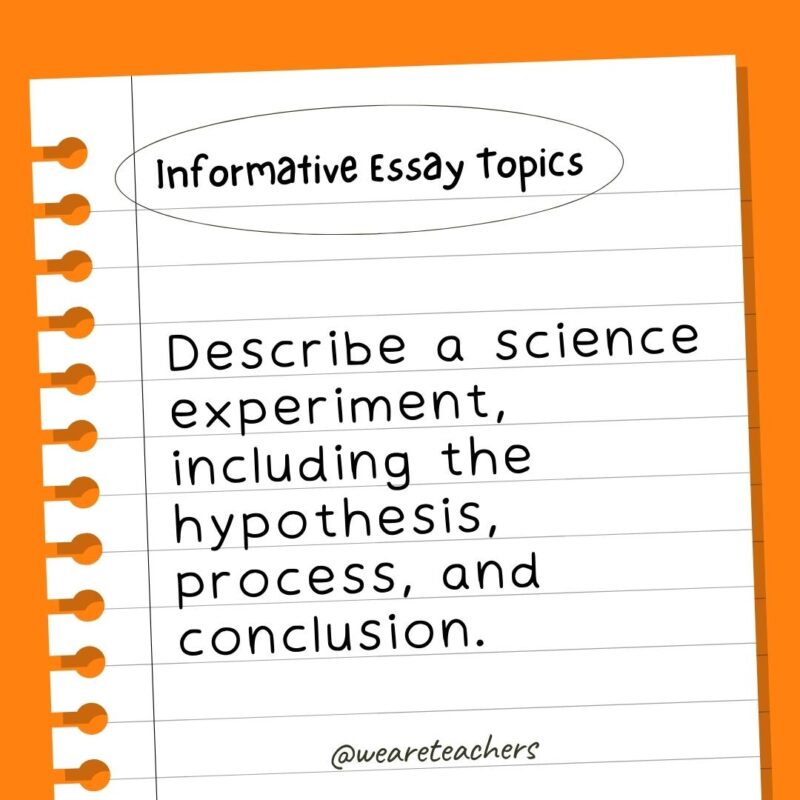
- Explain what it means to lead a healthy lifestyle.
- What is the relationship between calories and fat?
- What is the physics behind a bicycle?
- How do plants convert sunlight into energy?
- Describe any element from the periodic table, including its makeup and uses.
- What is the difference between a crocodile and an alligator?
- Describe the life cycle of any animal.
- What are the benefits of recycling?
- Describe the life of a prominent scientist.
- Explain what E = mc 2 means.
- Describe any disease, including its symptoms and treatments.
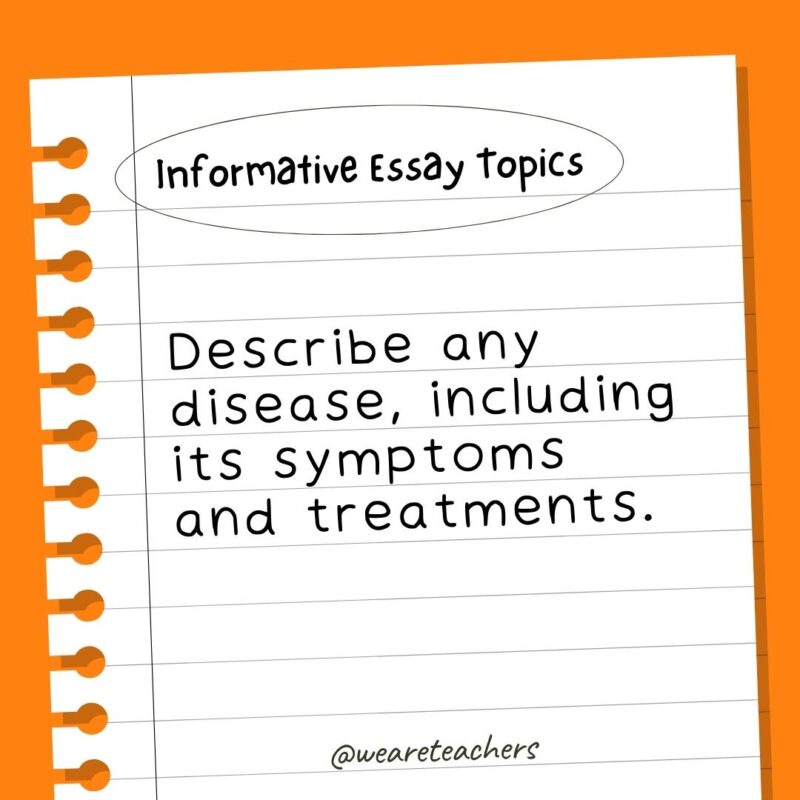
- Why do leaves change color in the fall?
- Explain the difference between climate and weather.
- Describe a specific ecosystem, including the plants and animals that live there.
- Describe the history of video games.
- What are recent trends in the video game industry?
- Describe your favorite superhero.
- Explain the motivations of any fictional villain.
- Describe the life of your favorite celebrity.
- Explore the development and growth of a main character in any book series.
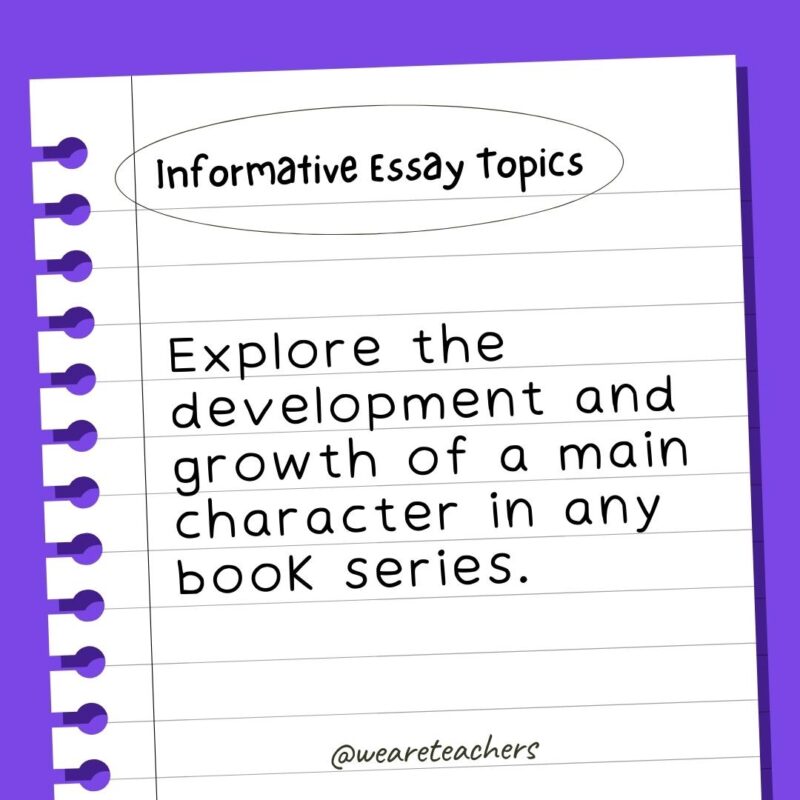
- Describe the process of making a movie or TV show.
- Tell the story of any band, including its founding, successes and challenges, and breakup (if applicable).
- Describe the life of a famous artist.
- Explore the history of Disney World (or any theme park).
- Plan the perfect fantasy football league team.
- Describe popular trends and fads from any decade.
- Explore the history of the Olympics.
- Describe the music of a generation and how it reflected that time.
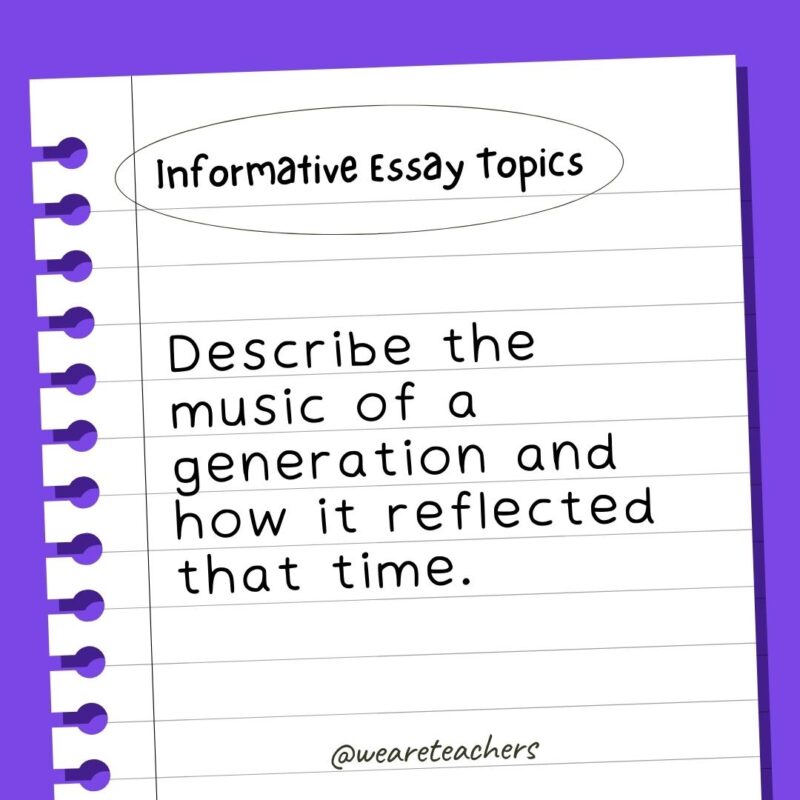
- Explain the history of the internet.
What are some of your favorite informative essay topics? Come share your ideas in the WeAreTeachers HELPLINE group on Facebook .
Plus, check out the big list of essay topics for high school (100+ ideas).
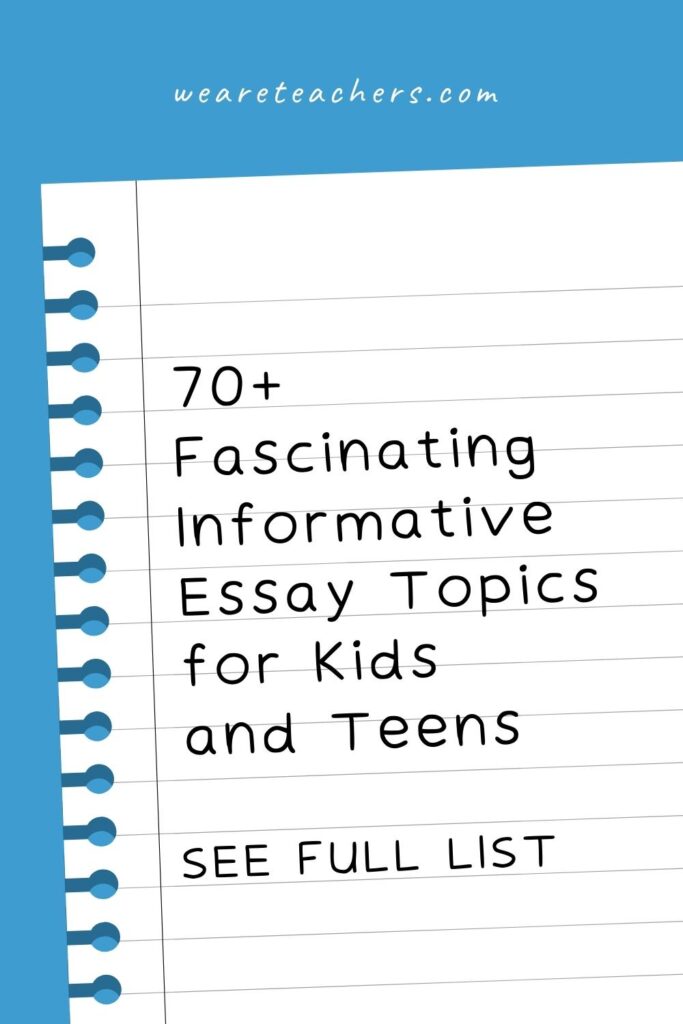
You Might Also Like

The Big List of Essay Topics for High School (120+ Ideas!)
Ideas to inspire every young writer! Continue Reading
Copyright © 2024. All rights reserved. 5335 Gate Parkway, Jacksonville, FL 32256
What are your chances of acceptance?
Calculate for all schools, your chance of acceptance.
Your chancing factors
Extracurriculars.
100 Interesting Research Paper Topics for High Schoolers
What’s covered:, how to pick the right research topic, elements of a strong research paper.
- Interesting Research Paper Topics
Composing a research paper can be a daunting task for first-time writers. In addition to making sure you’re using concise language and your thoughts are organized clearly, you need to find a topic that draws the reader in.
CollegeVine is here to help you brainstorm creative topics! Below are 100 interesting research paper topics that will help you engage with your project and keep you motivated until you’ve typed the final period.
A research paper is similar to an academic essay but more lengthy and requires more research. This added length and depth is bittersweet: although a research paper is more work, you can create a more nuanced argument, and learn more about your topic. Research papers are a demonstration of your research ability and your ability to formulate a convincing argument. How well you’re able to engage with the sources and make original contributions will determine the strength of your paper.
You can’t have a good research paper without a good research paper topic. “Good” is subjective, and different students will find different topics interesting. What’s important is that you find a topic that makes you want to find out more and make a convincing argument. Maybe you’ll be so interested that you’ll want to take it further and investigate some detail in even greater depth!
For example, last year over 4000 students applied for 500 spots in the Lumiere Research Scholar Program , a rigorous research program founded by Harvard researchers. The program pairs high-school students with Ph.D. mentors to work 1-on-1 on an independent research project . The program actually does not require you to have a research topic in mind when you apply, but pro tip: the more specific you can be the more likely you are to get in!
Introduction
The introduction to a research paper serves two critical functions: it conveys the topic of the paper and illustrates how you will address it. A strong introduction will also pique the interest of the reader and make them excited to read more. Selecting a research paper topic that is meaningful, interesting, and fascinates you is an excellent first step toward creating an engaging paper that people will want to read.
Thesis Statement
A thesis statement is technically part of the introduction—generally the last sentence of it—but is so important that it merits a section of its own. The thesis statement is a declarative sentence that tells the reader what the paper is about. A strong thesis statement serves three purposes: present the topic of the paper, deliver a clear opinion on the topic, and summarize the points the paper will cover.
An example of a good thesis statement of diversity in the workforce is:
Diversity in the workplace is not just a moral imperative but also a strategic advantage for businesses, as it fosters innovation, enhances creativity, improves decision-making, and enables companies to better understand and connect with a diverse customer base.
The body is the largest section of a research paper. It’s here where you support your thesis, present your facts and research, and persuade the reader.
Each paragraph in the body of a research paper should have its own idea. The idea is presented, generally in the first sentence of the paragraph, by a topic sentence. The topic sentence acts similarly to the thesis statement, only on a smaller scale, and every sentence in the paragraph with it supports the idea it conveys.
An example of a topic sentence on how diversity in the workplace fosters innovation is:
Diversity in the workplace fosters innovation by bringing together individuals with different backgrounds, perspectives, and experiences, which stimulates creativity, encourages new ideas, and leads to the development of innovative solutions to complex problems.
The body of an engaging research paper flows smoothly from one idea to the next. Create an outline before writing and order your ideas so that each idea logically leads to another.
The conclusion of a research paper should summarize your thesis and reinforce your argument. It’s common to restate the thesis in the conclusion of a research paper.
For example, a conclusion for a paper about diversity in the workforce is:
In conclusion, diversity in the workplace is vital to success in the modern business world. By embracing diversity, companies can tap into the full potential of their workforce, promote creativity and innovation, and better connect with a diverse customer base, ultimately leading to greater success and a more prosperous future for all.
Reference Page
The reference page is normally found at the end of a research paper. It provides proof that you did research using credible sources, properly credits the originators of information, and prevents plagiarism.
There are a number of different formats of reference pages, including APA, MLA, and Chicago. Make sure to format your reference page in your teacher’s preferred style.
- Analyze the benefits of diversity in education.
- Are charter schools useful for the national education system?
- How has modern technology changed teaching?
- Discuss the pros and cons of standardized testing.
- What are the benefits of a gap year between high school and college?
- What funding allocations give the most benefit to students?
- Does homeschooling set students up for success?
- Should universities/high schools require students to be vaccinated?
- What effect does rising college tuition have on high schoolers?
- Do students perform better in same-sex schools?
- Discuss and analyze the impacts of a famous musician on pop music.
- How has pop music evolved over the past decade?
- How has the portrayal of women in music changed in the media over the past decade?
- How does a synthesizer work?
- How has music evolved to feature different instruments/voices?
- How has sound effect technology changed the music industry?
- Analyze the benefits of music education in high schools.
- Are rehabilitation centers more effective than prisons?
- Are congestion taxes useful?
- Does affirmative action help minorities?
- Can a capitalist system effectively reduce inequality?
- Is a three-branch government system effective?
- What causes polarization in today’s politics?
- Is the U.S. government racially unbiased?
- Choose a historical invention and discuss its impact on society today.
- Choose a famous historical leader who lost power—what led to their eventual downfall?
- How has your country evolved over the past century?
- What historical event has had the largest effect on the U.S.?
- Has the government’s response to national disasters improved or declined throughout history?
- Discuss the history of the American occupation of Iraq.
- Explain the history of the Israel-Palestine conflict.
- Is literature relevant in modern society?
- Discuss how fiction can be used for propaganda.
- How does literature teach and inform about society?
- Explain the influence of children’s literature on adulthood.
- How has literature addressed homosexuality?
- Does the media portray minorities realistically?
- Does the media reinforce stereotypes?
- Why have podcasts become so popular?
- Will streaming end traditional television?
- What is a patriot?
- What are the pros and cons of global citizenship?
- What are the causes and effects of bullying?
- Why has the divorce rate in the U.S. been declining in recent years?
- Is it more important to follow social norms or religion?
- What are the responsible limits on abortion, if any?
- How does an MRI machine work?
- Would the U.S. benefit from socialized healthcare?
- Elderly populations
- The education system
- State tax bases
- How do anti-vaxxers affect the health of the country?
- Analyze the costs and benefits of diet culture.
- Should companies allow employees to exercise on company time?
- What is an adequate amount of exercise for an adult per week/per month/per day?
- Discuss the effects of the obesity epidemic on American society.
- Are students smarter since the advent of the internet?
- What departures has the internet made from its original design?
- Has digital downloading helped the music industry?
- Discuss the benefits and costs of stricter internet censorship.
- Analyze the effects of the internet on the paper news industry.
- What would happen if the internet went out?
- How will artificial intelligence (AI) change our lives?
- What are the pros and cons of cryptocurrency?
- How has social media affected the way people relate with each other?
- Should social media have an age restriction?
- Discuss the importance of source software.
- What is more relevant in today’s world: mobile apps or websites?
- How will fully autonomous vehicles change our lives?
- How is text messaging affecting teen literacy?
Mental Health
- What are the benefits of daily exercise?
- How has social media affected people’s mental health?
- What things contribute to poor mental and physical health?
- Analyze how mental health is talked about in pop culture.
- Discuss the pros and cons of more counselors in high schools.
- How does stress affect the body?
- How do emotional support animals help people?
- What are black holes?
- Discuss the biggest successes and failures of the EPA.
- How has the Flint water crisis affected life in Michigan?
- Can science help save endangered species?
- Is the development of an anti-cancer vaccine possible?
Environment
- What are the effects of deforestation on climate change?
- Is climate change reversible?
- How did the COVID-19 pandemic affect global warming and climate change?
- Are carbon credits effective for offsetting emissions or just marketing?
- Is nuclear power a safe alternative to fossil fuels?
- Are hybrid vehicles helping to control pollution in the atmosphere?
- How is plastic waste harming the environment?
- Is entrepreneurism a trait people are born with or something they learn?
- How much more should CEOs make than their average employee?
- Can you start a business without money?
- Should the U.S. raise the minimum wage?
- Discuss how happy employees benefit businesses.
- How important is branding for a business?
- Discuss the ease, or difficulty, of landing a job today.
- What is the economic impact of sporting events?
- Are professional athletes overpaid?
- Should male and female athletes receive equal pay?
- What is a fair and equitable way for transgender athletes to compete in high school sports?
- What are the benefits of playing team sports?
- What is the most corrupt professional sport?
Where to Get More Research Paper Topic Ideas
If you need more help brainstorming topics, especially those that are personalized to your interests, you can use CollegeVine’s free AI tutor, Ivy . Ivy can help you come up with original research topic ideas, and she can also help with the rest of your homework, from math to languages.
Disclaimer: This post includes content sponsored by Lumiere Education.
Related CollegeVine Blog Posts

Top 10 Research Topics For Students In 2024
Link Copied
Share on Facebook
Share on Twitter
Share on LinkedIn
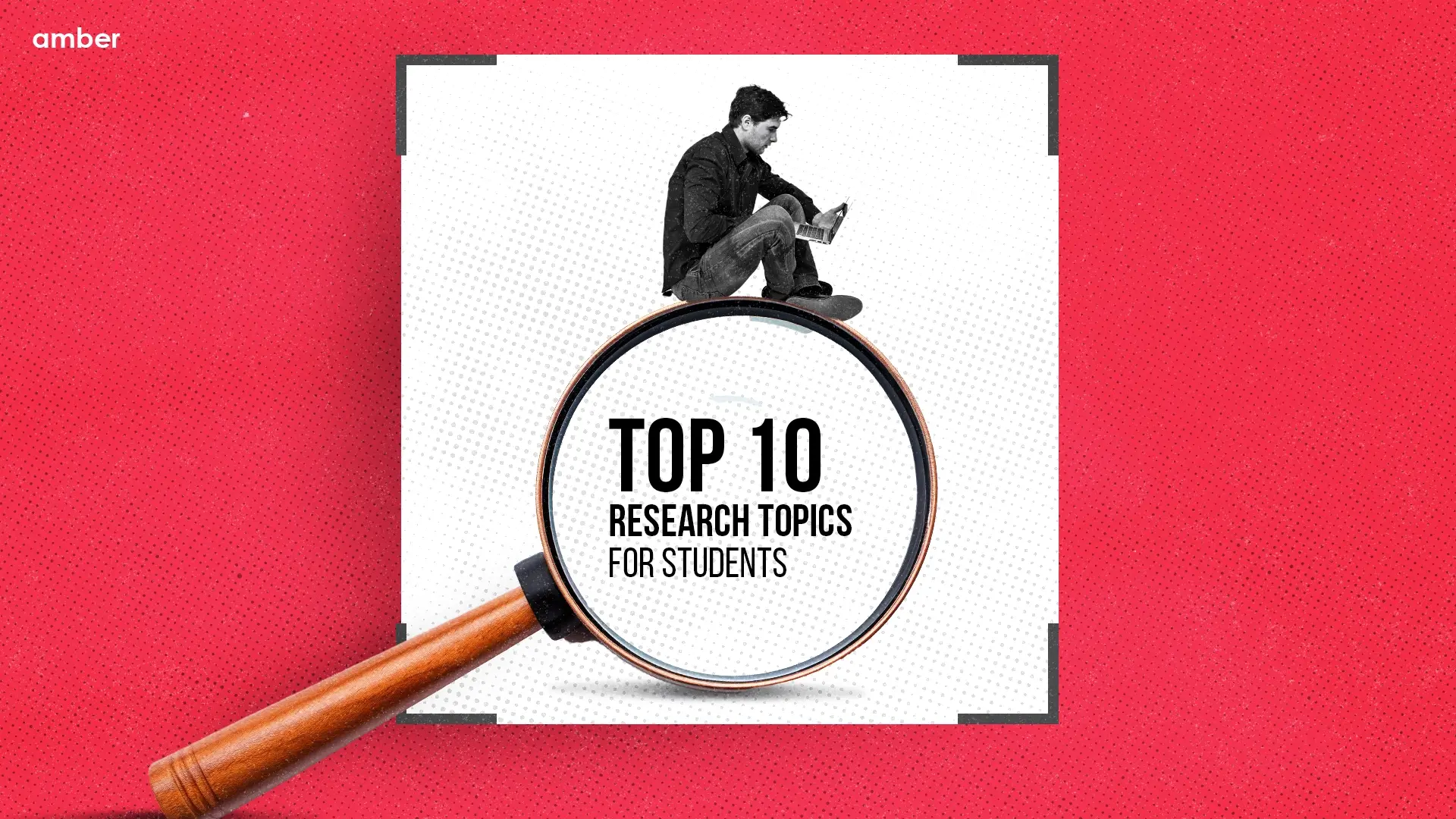
Research Beyond the Obvious!
Are you struggling to find a topic that can unearth new findings? Even before starting, many students feel drowning with the mere task of sorting out the best research topics. Don’t sweat it! This blog explores the top 10 research topics for students, with a focus on different subjects, including psychology, social sciences, etc. From exploring the impact of AI to dealing with social issues, let’s discover good ideas for a research paper!
Why Do You Need to Find a Research Topic?
Before we get down to the top 10 research topics on student learning , let’s understand what they are. Research topics help students to drill down into a subject and break down a wide aspect into smaller things. The topics serve the purpose of bringing fresh perspectives to the table and point out a potential knowledge gap or core problem.
Research Topic vs. Research Question
Going by its definition, a research topic focuses on a broad theme that calls for deep investigation. On the other hand, a research question is a particular query that researchers use to find plausible answers and new scopes. While you may be busy finding the top 10 research topics for students in college or senior high school, always remember that the topic reflects an aspect of a subject.
Factors to Choose Research Project Topics
The key to finding the top 10 research topics may leave you confused but don’t worry. The table below portrays the characteristics of interesting research paper topics that you must keep in mind:
What Makes a Good Research Topic
While we will give you some ideas about the top 10 research topics for students, you still need to pick one. However, getting closer to this sole topic may feel soul-crushing! Don’t worry; these tips will help you select the best research topics for students.
1. Focus on Personal Interests
The research topics for students usually stem from what motivates them. If you are interested in a specific field, you can go forward with the topic as long as it is relevant to your field. However, this does not mean you can overlook potential biases - being too close to the subject might even lead you nowhere.
2. Check the Guidelines
When looking for the top 10 research topics for students, it’s imperative to adhere to guidelines laid out by your school. Sometimes, they approve good topics for research papers only if they are related to the public interest or environment. Ask your professor/mentor whether you need to follow certain guidelines while finding the best research topics for students.
3. Availability of Resources
Your research project might never see the daylight if you do not have enough resources available. Make sure the resources are within your limits! In case your research has funding, always check how you will be able to use it. Finances, access to participants, and timings are key factors in finalising among the top 10 research topics for students.

Top 10 Research Topics for Students in College and Senior High School
Here, we will delve into the top 10 research topics for students. Whether you are in a college or senior high school, these topics will show you light at the end of the tunnel. You might find inspiration from these topics and may even come up with original research topics and research questions. So, let’s unveil the best research topic ideas for students!
1. Psychology Research Paper Topics
Psychology papers offer an exciting opportunity to explore and understand the human psyche. Emerging technologies and their impact on mental health is one of the best research topics for students, yet there are more you can explore. Below, are some of the best research topics for students:
1. The impact of social media on mental health among adolescents and young adults.
2. The potential benefits and risks of virtual reality therapy for mental health conditions.
3. The ethical considerations of using AI in psychological treatment.
4. The influence of mindfulness practices on cognitive performance and well-being.
5. The link between sleep quality and cognitive decline in ageing populations.
2. Business and Economics Research Topics
From sustainable business practices to global trade dynamics, the best research topics for students regarding business and economics revolve around many areas. While you may initially find it challenging how to conduct research , you can draw inspiration from these topics for research paper:
1. The impact of AI on various aspects of business, such as marketing and financial analysis.
2. The ethical considerations and challenges associated with the use of big data and analytics in business practices.
3. The potential of blockchain technology to revolutionise supply chain management and improve data privacy.
4. The effectiveness of policy interventions to promote sustainable economic growth & development.
5. Exploring the factors that contribute to the success of startups and new ventures in the digital age.
While you find research topics, discover the best accommodation too!
Register with amber today!
3. Social Sciences Research Topics
Social sciences deal with the study of human behaviour and explore socioeconomic inequalities, political ideologies, urban development, and more. If you are looking for good ideas for a research paper regarding social sciences, here are some:
1. The effectiveness of different social policy interventions aimed at addressing global issues.
2. The potential of blockchain technology to improve transparency and accountability in social structures.
3. The social and ethical implications of artificial intelligence (AI) in various aspects of life.
4. The psychological and social impacts of climate change on individuals and communities.
5. The increasing focus on interdisciplinary research that combines social science with data science.
4. Language and Linguistics Research Topics
From computational linguistics to semantics to language preservation, the field of language leads to some really good topics for research papers. While going through our list of top 10 research topics for students, you can already grasp that there are a few things to keep in mind when writing a college paper ! So, here are the best research topic ideas for students regarding language studies:
1. The influence of social media and digital communication on language use and evolution.
2. The impact of language learning apps and online platforms on pedagogy.
3. The role of language in perpetuating social inequalities.
4. The link between language and mental health in the context of cultural displacement.
5. The potential of multilingualism to enhance cognitive abilities.
5. Health and Medicine Research Topics
Finding the best research topics for students is daunting when it comes to a dynamic field like health and medicine. After going through this compilation of the top 10 research topics for students, you can understand how to come up with the right one. Here, based on the emerging areas of interest, we share some of the potentially impactful and the best research ideas for students:
1. The integration of AI in medical diagnosis and treatment.
2. Investigating the ethical considerations of using AI in the healthcare sector.
3. The developing field of preventive health measures and promoting healthy lifestyles.
4. The link between social determinants of health and mental well-being.
5. Improving access to healthcare and promoting health equity in minority communities.
6. Renewable Energy & Clean Technologies Research Topics
Initially, you might find it impossible to understand how to write a research paper for college , but these top 10 research topics for students will have you covered. Especially when your focus is on clean energy sources and the emission of greenhouse gases, there is a lot to cover nowadays. Here are some of the best research topics for students:
1. The potential of next-generation solar cell technologies.
2. The social and environmental aspects of renewable energy deployment.
3. Discovering the potential of decentralised energy systems.
4. The potential of hydrogen energy, including production, storage, and utilisation.
5. The impact of climate change on renewable energy resources.
7. Technology and Innovation Research Topics
The sector for technology is ever-evolving, with innovations taking place every other. With the emergence of IoT, artificial intelligence, and ML, the world of technology is your oyster. Here are the best research topics for students:
1. The societal implications of AI in healthcare, finance, and autonomous vehicles.
2. The potential of blockchain technology to revolutionise cybersecurity and voting systems.
3. Innovative solutions to combat climate change, including renewable energy technologies and sustainable infrastructure.
4. The role of technology in disaster preparedness and risk management.
5. The use of technology to bridge the digital divide and ensure equitable access to information.
8. Arts and Design Research Topics
Whether your niche lies in art therapy, cultural studies in arts, or architecture innovation, there are interesting research paper topics. While exploring the top 10 research topics for students, constructing research may seem difficult – going through the research design - elements and characteristics can solve your problems. So, here are the best research topics for students in college:
1. The impact of AI on artistic creation.
2. The use of virtual reality and augmented reality in storytelling.
3. The role of art in addressing social and environmental challenges.
4. The use of art as a tool for social commentary and activism.
5. The evolving nature of art museums and galleries in the digital age.
9. Argumentative Research Topics
Building a specific argument and exploring topics can bring you some unique topics for research paper. Through these top 10 research topics for students, you can evaluate human interest on a global scale and beyond. Let’s have a look at these best research topics for students:
1. Is universal basic income a viable solution to poverty?
2. Is nuclear power a solution to the global energy crisis?
3. Does increased global cooperation offer a solution to climate change?
4. The impact of automation and AI on the future of work and employment.
5. The ethical implications of gene editing and other emerging biotechnologies.
10. Human Rights Research Paper Topics
Our list of top 10 research topics remains incomplete without human rights. This field is evolving and has become a growing interest for everyone around the world. If you want to probe questions about gender equality or privacy rights, here are a few of the research title examples for students:
1. The role of human rights defenders and activists in promoting social change.
2. The human rights of marginalised groups, such as LGBTQ+ individuals and people with disabilities.
3. The impact of AI on human rights, including issues of bias and discrimination.
4. Examining the ethical implications of facial recognition technology.
5. Exploring the human rights implications of environmental pollution and toxic waste disposal.
Now that you have an idea about some of the top 10 research topics for students, we hope you come up with an original one. Remember, successful research always starts with the right question. Take time, dig deep into the relevant theories, and find thought-provoking topics for research papers. Meanwhile, don’t overlook the power of how to write a research paper appendix and how to create the right structure for the paper. You can also check out amber+ for essential tools that can help make your thesis writing process smoother! So, happy researching! Also, dive into our exclusive visual guide to uncover intriguing research topics tailored for students like you.
Frequently Asked Questions
What are the top 10 research topics for students, what are some easy yet good research topic ideas for students, what is a good research topic and what are the rules for choosing one, how to find research topic ideas for students in college, what are some trending research topics for students at the moment.
Your ideal student home & a flight ticket awaits
Follow us on :

Related Posts

How To Write A Research Proposal
.jpg)
10 Best Fashion Schools In Canada In 2024: Courses & Fees

Master's In Canada: Top Colleges, Fees & Eligibility In 2024

Planning to Study Abroad ?

Your ideal student accommodation is a few steps away! Please fill in your details below so we can find you a new home!
We have got your response

amber © 2024. All rights reserved.
4.8/5 on Trustpilot
Rated as "Excellent" • 4800+ Reviews by students
Rated as "Excellent" • 4800+ Reviews by Students
Innovative Statistics Project Ideas for Insightful Analysis
Table of contents
- 1.1 AP Statistics Topics for Project
- 1.2 Statistics Project Topics for High School Students
- 1.3 Statistical Survey Topics
- 1.4 Statistical Experiment Ideas
- 1.5 Easy Stats Project Ideas
- 1.6 Business Ideas for Statistics Project
- 1.7 Socio-Economic Easy Statistics Project Ideas
- 1.8 Experiment Ideas for Statistics and Analysis
- 2 Conclusion: Navigating the World of Data Through Statistics
Diving into the world of data, statistics presents a unique blend of challenges and opportunities to uncover patterns, test hypotheses, and make informed decisions. It is a fascinating field that offers many opportunities for exploration and discovery. This article is designed to inspire students, educators, and statistics enthusiasts with various project ideas. We will cover:
- Challenging concepts suitable for advanced placement courses.
- Accessible ideas that are engaging and educational for younger students.
- Ideas for conducting surveys and analyzing the results.
- Topics that explore the application of statistics in business and socio-economic areas.
Each category of topics for the statistics project provides unique insights into the world of statistics, offering opportunities for learning and application. Let’s dive into these ideas and explore the exciting world of statistical analysis.
Top Statistics Project Ideas for High School
Statistics is not only about numbers and data; it’s a unique lens for interpreting the world. Ideal for students, educators, or anyone with a curiosity about statistical analysis, these project ideas offer an interactive, hands-on approach to learning. These projects range from fundamental concepts suitable for beginners to more intricate studies for advanced learners. They are designed to ignite interest in statistics by demonstrating its real-world applications, making it accessible and enjoyable for people of all skill levels.
Need help with statistics project? Get your paper written by a professional writer Get Help Reviews.io 4.9/5
AP Statistics Topics for Project
- Analyzing Variance in Climate Data Over Decades.
- The Correlation Between Economic Indicators and Standard of Living.
- Statistical Analysis of Voter Behavior Patterns.
- Probability Models in Sports: Predicting Outcomes.
- The Effectiveness of Different Teaching Methods: A Statistical Study.
- Analysis of Demographic Data in Public Health.
- Time Series Analysis of Stock Market Trends.
- Investigating the Impact of Social Media on Academic Performance.
- Survival Analysis in Clinical Trial Data.
- Regression Analysis on Housing Prices and Market Factors.
Statistics Project Topics for High School Students
- The Mathematics of Personal Finance: Budgeting and Spending Habits.
- Analysis of Class Performance: Test Scores and Study Habits.
- A Statistical Comparison of Local Public Transportation Options.
- Survey on Dietary Habits and Physical Health Among Teenagers.
- Analyzing the Popularity of Various Music Genres in School.
- The Impact of Sleep on Academic Performance: A Statistical Approach.
- Statistical Study on the Use of Technology in Education.
- Comparing Athletic Performance Across Different Sports.
- Trends in Social Media Usage Among High School Students.
- The Effect of Part-Time Jobs on Student Academic Achievement.
Statistical Survey Topics
- Public Opinion on Environmental Conservation Efforts.
- Consumer Preferences in the Fast Food Industry.
- Attitudes Towards Online Learning vs. Traditional Classroom Learning.
- Survey on Workplace Satisfaction and Productivity.
- Public Health: Attitudes Towards Vaccination.
- Trends in Mobile Phone Usage and Preferences.
- Community Response to Local Government Policies.
- Consumer Behavior in Online vs. Offline Shopping.
- Perceptions of Public Safety and Law Enforcement.
- Social Media Influence on Political Opinions.
Statistical Experiment Ideas
- The Effect of Light on Plant Growth.
- Memory Retention: Visual vs. Auditory Information.
- Caffeine Consumption and Cognitive Performance.
- The Impact of Exercise on Stress Levels.
- Testing the Efficacy of Natural vs. Chemical Fertilizers.
- The Influence of Color on Mood and Perception.
- Sleep Patterns: Analyzing Factors Affecting Sleep Quality.
- The Effectiveness of Different Types of Water Filters.
- Analyzing the Impact of Room Temperature on Concentration.
- Testing the Strength of Different Brands of Batteries.
Easy Stats Project Ideas
- Average Daily Screen Time Among Students.
- Analyzing the Most Common Birth Months.
- Favorite School Subjects Among Peers.
- Average Time Spent on Homework Weekly.
- Frequency of Public Transport Usage.
- Comparison of Pet Ownership in the Community.
- Favorite Types of Movies or TV Shows.
- Daily Water Consumption Habits.
- Common Breakfast Choices and Their Nutritional Value.
- Steps Count: A Week-Long Study.
Business Ideas for Statistics Project
- Analyzing Customer Satisfaction in Retail Stores.
- Market Analysis of a New Product Launch.
- Employee Performance Metrics and Organizational Success.
- Sales Data Analysis for E-commerce Websites.
- Impact of Advertising on Consumer Buying Behavior.
- Analysis of Supply Chain Efficiency.
- Customer Loyalty and Retention Strategies.
- Trend Analysis in Social Media Marketing.
- Financial Risk Assessment in Investment Decisions.
- Market Segmentation and Targeting Strategies.
Socio-Economic Easy Statistics Project Ideas
- Income Inequality and Its Impact on Education.
- The Correlation Between Unemployment Rates and Crime Levels.
- Analyzing the Effects of Minimum Wage Changes.
- The Relationship Between Public Health Expenditure and Population Health.
- Demographic Analysis of Housing Affordability.
- The Impact of Immigration on Local Economies.
- Analysis of Gender Pay Gap in Different Industries.
- Statistical Study of Homelessness Causes and Solutions.
- Education Levels and Their Impact on Job Opportunities.
- Analyzing Trends in Government Social Spending.
Experiment Ideas for Statistics and Analysis
- Multivariate Analysis of Global Climate Change Data.
- Time-Series Analysis in Predicting Economic Recessions.
- Logistic Regression in Medical Outcome Prediction.
- Machine Learning Applications in Statistical Modeling.
- Network Analysis in Social Media Data.
- Bayesian Analysis of Scientific Research Data.
- The Use of Factor Analysis in Psychology Studies.
- Spatial Data Analysis in Geographic Information Systems (GIS).
- Predictive Analysis in Customer Relationship Management (CRM).
- Cluster Analysis in Market Research.
Conclusion: Navigating the World of Data Through Statistics
In this exploration of good statistics project ideas, we’ve ventured through various topics, from the straightforward to the complex, from personal finance to global climate change. These ideas are gateways to understanding the world of data and statistics, and platforms for cultivating critical thinking and analytical skills. Whether you’re a high school student, a college student, or a professional, engaging in these projects can deepen your appreciation of how statistics shapes our understanding of the world around us. These projects encourage exploration, inquiry, and a deeper engagement with the world of numbers, trends, and patterns – the essence of statistics.
Readers also enjoyed

WHY WAIT? PLACE AN ORDER RIGHT NOW!
Just fill out the form, press the button, and have no worries!
We use cookies to give you the best experience possible. By continuing we’ll assume you board with our cookie policy.
A .gov website belongs to an official government organization in the United States.
A lock ( ) or https:// means you've safely connected to the .gov website. Share sensitive information only on official, secure websites.
- About Health Effects of Cigarette Smoking
- Secondhand Smoke
- E-cigarettes (Vapes)
- Menthol Tobacco Products
- Morbidity and Mortality Weekly Reports (MMWR)
- About Surveys
- Other Tobacco Products
- Smoking and Tobacco Use Features
- Patient Care Settings and Smoking Cessation
- Patient Care
- Funding Opportunity Announcements
- State and Community Work
- National and State Tobacco Control Program
- Multimedia and Tools
- Tobacco - Health Equity
- Tobacco - Surgeon General's Reports
- State Tobacco Activities Tracking and Evaluation (STATE) System
- Global Tobacco Control
E-Cigarette Use Among Youth
What to know.
E-cigarettes are the most commonly used tobacco product among U.S. youth. No tobacco products, including e-cigarettes, are safe, especially for children, teens, and young adults. Learn more about e-cigarette use among youth.
- In the United States, youth use e-cigarettes, or vapes, more than any other tobacco product. 1
- No tobacco products, including e-cigarettes, are safe, especially for children, teens, and young adults. 2
- Most e-cigarettes contain nicotine, which is highly addictive. Nicotine can harm the parts of an adolescent's brain that control attention, learning, mood, and impulse control. 2
- E-cigarette marketing, the availability of flavored products, social influences, and the effects of nicotine can influence youth to start or continue vaping. 3 4
- Most middle and high school students who vape want to quit. 5
- Many people have an important role in protecting youth from vaping including parents and caregivers, educators and school administrators, health care providers, and community partners.
- States and local communities can implement evidence-based policies, programs, and services to reduce youth vaping.
E-cigarette use among U.S. youth
In 2023, e-cigarettes were the most commonly used tobacco product among middle and high school students in the United States. In 2023: 6
- 550,000 (4.6%) middle school students.
- 1.56 million (10.0%) high school students.
- Among students who had ever used e-cigarettes, 46.7% reported current e-cigarette use.
- 1 in 4 (25.2%) used an e-cigarette every day.
- 1 in 3 (34.7%) used an e-cigarette on at least 20 of the last 30 days.
- 9 in 10 (89.4%) used flavored e-cigarettes.
- Most often used disposable e-cigarettes (60.7%) followed by e-cigarettes with prefilled or refillable pods or cartridges (16.1%).
- Most commonly reported using the following brands: Elf Bar, Esco Bars, Vuse, JUUL, and Mr. Fog.
Most middle and high school students who vape want to quit and have tried to quit. 5 In 2020:
- 63.9% of students who currently used e-cigarettes reported wanting to quit.
- 67.4% of students who currently used e-cigarettes reported trying to quit in the last year.
Most tobacco use, including vaping, starts and is established during adolescence. There are many factors associated with youth tobacco product use . These include:
- Tobacco advertising that targets youth.
- Product accessibility.
- Availability of flavored products.
- Social influences.
- Adolescent brain sensitivity to nicotine.
Some groups of middle and high school students use e-cigarettes at a higher percentage than others. For example, in 2023: 6
- More females than males reported current e-cigarette use.
- Non-Hispanic multiracial students: 20.8%.
- Non-Hispanic White students: 18.4%.
- Hispanic or Latino students: 18.2%.
- Non-Hispanic American Indian and Alaska Native students: 15.4%.
- Non-Hispanic Black or African American students: 12.9%.
Many young people who vape also use other tobacco products, including cigarettes and cigars. 7 This is called dual use. In 2020: 8
- About one in three high school students (36.8%) who vaped also used other tobacco products.
- One in two middle school students (49.0%) who vaped also used other tobacco products.
E-cigarettes can also be used to deliver other substances, including cannabis. In 2016, nearly one in three (30.6%) of U.S. middle and high school students who had ever used an e-cigarette reported using marijuana in the device. 9
- Park-Lee E, Ren C, Cooper M, Cornelius M, Jamal A, Cullen KA. Tobacco product use among middle and high school students—United States, 2022 . MMWR Morb Mortal Wkly Rep. 2022;71:1429–1435.
- U.S. Department of Health and Human Services. E-cigarette Use Among Youth and Young Adults: A Report of the Surgeon General . Centers for Disease Control and Prevention; 2016. Accessed Feb 14, 2024.
- Apelberg BJ, Corey CG, Hoffman AC, et al. Symptoms of tobacco dependence among middle and high school tobacco users: results from the 2012 National Youth Tobacco Survey . Am J Prev Med. 2014;47(Suppl 1):S4–14.
- Gentzke AS, Wang TW, Cornelius M, et al. Tobacco product use and associated factors among middle and high school students—National Youth Tobacco Survey, United States, 2021 . MMWR Surveill Summ. 2022;71(No. SS-5):1–29.
- Zhang L, Gentzke A, Trivers KF, VanFrank B. Tobacco cessation behaviors among U.S. middle and high school students, 2020 . J Adolesc Health. 2022;70(1):147–154.
- Birdsey J, Cornelius M, Jamal A, et al. Tobacco product use among U.S. middle and high school students—National Youth Tobacco Survey, 2023 . MMWR Morb Mortal Wkly Rep. 2023;72:1173–1182.
- Wang TW, Gentzke AS, Creamer MR, et al. Tobacco product use and associated factors among middle and high school students—United States, 2019 . MMWR Surveill Summ. 2019;68(No. SS-12):1–22.
- Wang TW, Gentzke AS, Neff LJ, et al. Characteristics of e-cigarette use behaviors among US youth, 2020 . JAMA Netw Open. 2021;4(6):e2111336.
- Trivers KF, Phillips E, Gentzke AS, Tynan MA, Neff LJ. Prevalence of cannabis use in electronic cigarettes among U.S. youth . JAMA Pediatr. 2018;172(11):1097–1099.
Smoking and Tobacco Use
Commercial tobacco use is the leading cause of preventable disease, disability, and death in the United States.
For Everyone
Health care providers, public health.
9 Undergraduate Research Projects That Wowed Us This Year
The telegraph. The polio vaccine. The bar code. Light beer. Throughout its history, NYU has been known for innovation, with faculty and alumni in every generation contributing to some of the most notable inventions and scientific breakthroughs of their time. But you don’t wind up in the history books—or peer-reviewed journals—by accident; academic research, like any specialized discipline, takes hard work and lots of practice.
And at NYU, for students who are interested, that training can start early—including during an undergraduate's first years on campus. Whether through assistantships in faculty labs, summer internships, senior capstones, or independent projects inspired by coursework, undergrad students have many opportunities to take what they’re learning in the classroom and apply it to create original scholarship throughout their time at NYU. Many present their work at research conferences, and some even co-author work with faculty and graduate students that leads to publication.
As 2023-2024 drew to a close, the NYU News team coordinated with the Office of the Provost to pull together a snapshot of the research efforts that students undertook during this school year. The nine featured here represent just a small fraction of the impressive work we encountered in fields ranging from biology, chemistry, and engineering to the social sciences, humanities, and the arts.
These projects were presented at NYU research conferences for undergrads, including Migration and Im/Mobility , Pathways for Discovery: Undergraduate Research and Writing Symposium , Social Impact: NYU’s Applied Undergraduate Research Conference , Arts-Based Undergraduate Research Conference , Gallatin Student Research Conference , Dreammaker’s Summit , Tandon’s Research Excellence Exhibit , and Global Engagement Symposium . Learn more about these undergrad research opportunities and others.
Jordan Janowski (CAS '24)
Sade Chaffatt (NYU Abu Dhabi '24)
Elsa Nyongesa (GPH, CAS ’24 )
Anthony Offiah (Gallatin ’26)
Kimberly Sinchi (Tandon ’24) and Sarah Moughal (Tandon ’25)
Rohan Bajaj (Stern '24)
Lizette Saucedo (Liberal Studies ’24)
Eva Fuentes (CAS '24)
Andrea Durham (Tandon ’26)
Jordan Janowski (CAS ’24) Major: Biochemistry Thesis title: “Engineering Chirality for Functionality in Crystalline DNA”
Jordan Janowski (CAS '24). Photo by Tracey Friedman
I work in the Structural DNA Nanotechnology Lab, which was founded by the late NYU professor Ned Seeman, who is known as the father of the field. My current projects are manipulating DNA sequences to self-assemble into high order structures.
Essentially, we’re using DNA as a building material, instead of just analyzing it for its biological functions. It constantly amazes me that this is possible.
I came in as a pre-med student, but when I started working in the lab I realized that I was really interested in continuing my research there. I co-wrote a paper with postdoc Dr. Simon Vecchioni who has been a mentor to me and helped me navigate applying to grad school. I’m headed to Scripps Research in the fall. This research experience has led me to explore some of the molecules that make up life and how they could be engineered into truly unnatural curiosities and technologies.
My PI, Prof. Yoel Ohayon , has been super supportive of my place on the NYU women’s basketball team, which I’m a member of. He’s been coming to my games since sophomore year, and he’ll text me with the score and “great game!”— it’s been so nice to have that support for my interests beyond the lab.
Anthony Offiah (Gallatin ’26) Concentration: Fashion design and business administration MLK Scholars research project title: “project: DREAMER”
Anthony Offiah (Gallatin '26). Photo by Tracey Friedman
In “project: DREAMER,” I explored how much a person’s sense of fashion is a result of their environment or societal pressures based on their identity. Certain groups are pressured or engineered to present a certain way, and I wanted to see how much of the opposing force—their character, their personality—affected their sense of style.
This was a summer research project through the MLK Scholars Program . I did ethnographic interviews with a few people, and asked them to co-design their ideal garments with me. They told me who they are, how they identify, and what they like in fashion, and we synthesized that into their dream garments. And then we had a photo shoot where they were empowered to make artistic choices.
Some people told me they had a hard time conveying their sense of style because they were apprehensive about being the center of attention or of being dissimilar to the people around them. So they chose to conform to protect themselves. And then others spoke about wanting to safeguard the artistic or vulnerable—or one person used the word “feminine”—side of them so they consciously didn’t dress how they ideally would.
We ended the interviews by stating an objective about how this co-designing process didn’t end with them just getting new clothes—it was about approaching fashion differently than how they started and unlearning how society might put them in a certain box without their approval.
My concentration in Gallatin is fashion design and business administration. In the industry some clothing is critiqued and some clothing is praised—and navigating that is challenging, because what you like might not be well received. So doing bespoke fashion for just one person is freeing in a sense because you don’t have to worry about all that extra stuff. It’s just the art. And I like being an artist first and thinking about the business second.
Lizette Saucedo (Global Liberal Studies ’24) Major: Politics, rights, and development Thesis title: “Acknowledging and Remembering Deceased Migrants Crossing the U.S.-Mexican Border”
Lizette Saucedo (Global Liberal Studies '24). Photo by Tracey Friedman
My thesis project is on commemorating migrants who are dying on their journey north to cross the U.S.–Mexican border. I look at it through different theoretical lenses, and one of the terms is necropolitics—how politics shapes the way the State governs life and especially death. And then of the main issues aside from the deaths is that a lot of people in the U.S. don’t know about them, due to the government trying to eschew responsibility for migrant suffering. In the final portion of the thesis, I argue for presenting what some researchers call “migrant artifacts”—the personal belongings left behind by people trying to cross over—to the public, so that people can become aware and have more of a human understanding of what’s going on.
This is my senior thesis for Liberal Studies, but the idea for it started in an International Human Rights course I took with professor Joyce Apsel . We read a book by Jason De León called The Land of the Open Graves , which I kept in the back of my mind. And then when I studied abroad in Germany during my junior year, I noticed all the different memorials and museums, and wondered why we didn’t have the equivalent in the U.S. My family comes from Mexico—my parents migrated—and ultimately all of these interests came together.
I came into NYU through the Liberal Studies program and I loved it. It’s transdisciplinary, which shaped how I view my studies. My major is politics, rights, and development and my minor is social work, but I’ve also studied museum studies, and I’ve always loved the arts. The experience of getting to work one-on-one on this thesis has really fortified my belief that I can combine all those things.
Sade Chaffatt (Abu Dhabi ’24) Major: Biology Thesis title: “The Polycomb repressive component, EED in mouse hepatocytes regulates liver homeostasis and survival following partial hepatectomy.”
Sade Chaffatt (NYU Abu Dhabi '24). Photo courtesy of NYUAD
Imagine your liver as a room. Within the liver there are epigenetic mechanisms that control gene expression. Imagine these epigenetic mechanisms as a dimmer switch, so that you could adjust the light in the room. If we remove a protein that is involved in regulating these mechanisms, there might be dysregulation—as though the light is too bright or too dim. One such protein, EED, plays a crucial role in regulating gene expression. And so my project focuses on investigating whether EED is required in mouse hepatocytes to regulate liver homeostasis and to regulate survival following surgical resection.
Stepping into the field of research is very intimidating when you’re an undergraduate student and know nothing. But my capstone mentor, Dr. Kirsten Sadler , encourages students to present their data at lab meetings and to speak with scientists. Even though this is nerve-wracking, it helps to promote your confidence in communicating science to others in the field.
If you’d asked 16-year-old me, I never would’ve imagined that I’d be doing research at this point. Representation matters a lot, and you often don't see women—especially not Black women—in research. Being at NYUAD has really allowed me to see more women in these spaces. Having had some experience in the medical field through internships, I can now say I’m more interested in research and hope to pursue a PhD in the future.
Kimberly Sinchi (Tandon ’24) Major: Computer Science Sarah Moughal (Tandon ’25) Major: Computer Science Project: Robotic Design Team's TITAN
Sarah Moughal (Tandon '25, left) and Kimberly Sinchi (Tandon '24). Photo by Tracey Friedman
Kimberly: The Robotic Design Team has been active at NYU for at least five years. We’re 60-plus undergrad and grad students majoring in electrical engineering, mechanical engineering, computer science, and integrated design. We’ve named our current project TITAN because of how huge it is. TITAN stands for “Tandon’s innovation in terraforming and autonomous navigation.”
Sarah: We compete in NASA’s lunatics competition every year, which means we build a robot from scratch to be able to compete in lunar excavation and construction. We make pretty much everything in house in the Tandon MakerSpace, and everyone gets a little experience with machining, even if you're not mechanical. A lot of it is about learning how to work with other people—communicating across majors and disciplines and learning how to explain our needs to someone who may not be as well versed in particular technologies as we are.
Kimberly: With NYU’s Vertically Integrated Project I’ve been able to take what I was interested in and actually have a real world impact with it. NASA takes notes on every Rover that enters this competition. What worked and what didn’t actually influences their designs for rovers they send to the moon and to Mars.
Eva Fuentes (CAS ’24) Major: Anthropology Thesis title: “Examining the relationship between pelvic shape and numbers of lumbar vertebrae in primates”
Eva Fuentes (CAS '24). Photo by Tracey Friedman
I came into NYU thinking I wanted to be an art history major with maybe an archeology minor. To do the archeology minor, you have to take the core classes in anthropology, and so I had to take an intro to human evolution course. I was like, this is the coolest thing I’ve learned—ever. So I emailed people in the department to see if I could get involved.
Since my sophomore year, I’ve been working in the Evolutionary Morphology Lab with Scott Williams, who is primarily interested in the vertebral column of primates in the fossil record because of how it can inform the evolution of posture and locomotion in humans.
For my senior thesis, I’m looking at the number of lumbar vertebrae—the vertebrae that are in the lower back specifically—and aspects of pelvic shape to see if it is possible to make inferences about the number of lumbar vertebrae a fossil may have had. The bones of the lower back are important because they tell us about posture and locomotion.
I committed to a PhD program at Washington University in St. Louis a few weeks ago to study biological anthropology. I never anticipated being super immersed in the academic world. I don’t come from an academic family. I had no idea what I was doing when I started, but Scott Williams, and everyone in the lab, is extremely welcoming and easy to talk to. It wasn't intimidating to come into this lab at all.
Elsa Nyongesa (GPH, CAS ’24 ) Major: Global Public Health and Biology Project: “Diversity in Breast Oncological Studies: Impacts on Black Women’s Health Outcomes”
Elsa Nyongesa (GPH, CAS '24). Photo by Tracey Friedman
I interned at Weill Cornell Medicine through their Travelers Summer Research Fellowship Program where I worked with my mentor, Dr. Lisa Newman, who is the head of the International Center for the Study of Breast Cancer Subtypes. I analyzed data on the frequency of different types of breast cancer across racial and ethnic groups in New York. At the same time, I was also working with Dr. Rachel Kowolsky to study minority underrepresentation in clinical research.
In an experiential learning course taught by Professor Joyce Moon Howard in the GPH department, I created a research question based on my internship experience. I thought about how I could combine my experiences from the program which led to my exploration of the correlation between minority underrepresentation in breast oncological studies, and how it affects the health outcomes of Black women with breast cancer.
In my major, we learn about the large scope of health disparities across different groups. This opportunity allowed me to learn more about these disparities in the context of breast cancer research. As a premedical student, this experience broadened my perspective on health. I learned more about the social, economic, and environmental factors influencing health outcomes. It also encouraged me to examine literature more critically to find gaps in knowledge and to think about potential solutions to health problems. Overall, this experience deepened my philosophy of service, emphasizing the importance of health equity and advocacy at the research and clinical level.
Rohan Bajaj (Stern ’24) Major: Finance and statistics Thesis title: “Measuring Socioeconomic Changes and Investor Attitude in Chicago’s Post-Covid Economic Recovery”
Rohan Bajaj (Stern '24). Photo by Tracey Friedman
My thesis is focused on understanding the effects of community-proposed infrastructure on both the socioeconomic demographics of cities and on fiscal health. I’m originally from Chicago, so it made a lot of sense to pay tribute back to the place that raised me. I’m compiling a list of characteristics of infrastructure that has been developed since 2021 as a part of the Chicago Recovery Plan and then assessing how neighborhoods have changed geographically and economically.
I’m looking at municipal bond yields in Chicago as a way of evaluating the fiscal health of the city. Turns out a lot of community-proposed infrastructure is focused in lower income areas within Chicago rather than higher income areas. So that makes the research question interesting, to see if there’s a correlation between the proposed and developed infrastructure projects, and if these neighborhoods are being gentrified alongside development.
I kind of stumbled into the impact investing industry accidentally from an internship I had during my time at NYU. I started working at a renewable energies brokerage in midtown, where my main job was collecting a lot of market research trends and delivering insights on how these different energy markets would come into play. I then worked with the New York State Insurance Fund, where I helped construct and execute their sustainable investment strategy from the ground up.
I also took a class called “Design with Climate Change” with Peter Anker in Gallatin during my junior year, and a lot of that class was focused on how to have climate resilient and publicly developed infrastructure, and understanding the effects it has on society. It made me start thinking about the vital role that physical surroundings play in steering communities.
In the short term I want to continue diving into impact-focused investing and help identify urban planners and city government to develop their communities responsibly and effectively.
Andrea Durham (Tandon, ’26) Major: Biomolecular science Research essay title: “The Rise and Fall of Aduhelm”
Andrea Durham (Tandon '26). Photo by Tracey Friedman
This is an essay I wrote last year in an advanced college essay writing class with Professor Lorraine Doran on the approval of a drug for Alzheimer’s disease called Aduhelm—a monoclonal antibody therapy developed by Biogen in 2021, which was described as being momentous and groundbreaking. But there were irregularities ranging from the design of its clinical trials to government involvement that led to the resignation of three scientists on an advisory panel, because not everybody in the scientific community agreed that it should be approved.
When I was six years old, my grandmother was diagnosed. Seeing the impact that it had over the years broke my heart and ignited a passion in me to pursue research.
When I started at NYU, I wasn’t really sure what I was going to do in the future, or what opportunities I would go after. This writing class really gave me an opportunity to reflect on the things that were important to me in my life. The September after I wrote this paper, I started volunteering in a lab at Mount Sinai for Alzheimer's disease research, and that’s what I’m doing now—working as a volunteer at the Center for Molecular Integrative Neuroresilience under Dr. Giulio Pasinetti. I have this opportunity to be at the forefront, and because of the work I did in my writing class I feel prepared going into these settings with an understanding of the importance of conducting ethical research and working with integrity.
MSTP pipeline programs: A gateway to opportunity
Lori Hart May 24, 2024

At IU School of Medicine Medical Scientist Training Program (MSTP), we believe in more than just a program—we believe in opening doors to a world of unique opportunities. Our graduates stand as living proof of this belief, seamlessly bridging the realms of patient care and research.
We're not just passive participants; we actively engage with pipeline and STEM mentoring programs. Our mission? To inspire high school and college students to stay the course in STEM education and consider the MD-PhD pathway—an avenue leading to many career pathways.
Over the past year, we've made significant strides in recruitment and name recognition. From graduate fairs to high school and college visits, we've been spreading the word about STEM medical careers throughout Indianapolis and beyond. Our aim is simple: to ensure that students know the physician-scientist pathway early on, particularly those who may be the first in their families to attend college.
Our commitment extends beyond the confines of our campus. Through our Growth through Guidance mentoring program at Arsenal Tech High School, we're helping students unlock their potential. Our current MSTP students engage in meaningful discussions with Arsenal Tech students, shedding light on healthcare career options, the intricacies of biomedical research, and the journey to medical school. And this is just the beginning; we're already planning to expand our resources and activities for the upcoming year.
But our outreach doesn't stop there. Recognizing the value of mentorship for pre-medical college students, we've launched the IUPUI Growth through Guidance program in partnership with the IUPUI School of Science. This initiative pairs IUPUI students with MSTP student mentors, providing guidance on everything from exam preparation to personal statement writing. Through hands-on experiences and shadowing opportunities, we're equipping students with the tools they need to succeed.
The results speak for themselves. Our inaugural year was a resounding success, with first-generation college students particularly benefiting from the support and guidance offered by our mentors. As we look ahead, we're excited to continue nurturing the next generation of physician-scientists, ensuring they're equipped to make a meaningful impact in the world of medicine and beyond.
And to shine a spotlight on our most recent pipeline program: we're thrilled to announce the arrival of our MSTP Undergraduate Summer Research Program students for the upcoming summer! Over the past three years, applications to this esteemed program have skyrocketed fourfold, showcasing its growing popularity. This year, competition was particularly fierce, reflecting the high caliber of applicants. We’re welcoming six students from Cornell, IU, University of Iowa, Purdue, and Ohio State.
The program aims to provide aspiring MSTP students with a unique opportunity to immerse themselves in our MSTP community during the summer. Participants will engage in cutting-edge research, shadow experienced clinicians, and connect with current students and esteemed MSTP faculty. The program will culminate in an August final research presentation, where participants will showcase their work to mentors, family, and friends.
Subscribe to this Blog
We've added you to our mailing list!
Sorry, there was a problem
Suggested for you

IMAGES
VIDEO
COMMENTS
Begin with a simple prototype, focusing on one core feature, and expand from there. 5. Model rocketry: design, build, and launch! What to do: Dive into the basics of rocket science by designing your own model rocket. Understand the principles of thrust, aerodynamics, and stability as you plan your rocket.
Here are some research ideas that can nurture a love for discovery and experimentation: Climate Change: Effects and Solutions: Investigating the causes and potential solutions to this global challenge can make students aware of their role in protecting the planet. The Wonders of the Solar System: Encouraging a study of the planets, their moons ...
This will create fun research topics for 6th graders, learning about life and how relationships work. Literature: This is the best time to learn about books and works of art. The literature will provide many topics to research for middle school students. There are many more aspects that middle school students can research and write papers on.
This article provides an in-depth exploration of creative research topic ideas for middle school students. It is a valuable resource for educators, researchers, and parents who are interested in promoting the educational success of their young learners by providing engaging learning opportunities. The topics discussed within this article have ...
The exploration of ideas and research topics for middle schoolers is an increasingly important area to investigate in the modern classroom. Middle school students often have a broad range of interests, yet limited resources with which to explore these interests on their own. This article provides insight into how educators can effectively guide ...
Here are some STEM research topics that middle school students can explore: Renewable energy sources and their impact on the environment. The effects of pollution on local ecosystems. Investigating the properties of different types of soils. Building and testing a simple machine or robot.
I. Introduction to Exploring Research Paper Topics for Middle Schoolers. II. Benefits of Assigning a Research Project in the Middle School Classroom. III. Identifying Appropriate and Engaging Topics for Younger Students. IV. Strategies for Facilitating Student Learning on Complex Ideas. V. Examining Relevant Sources to Support Claims and Arguments.
Our middle school projects are written and tested by scientists and are specifically created for use by students in the middle school grades. Students can choose to follow the science experiment as written or put their own spin on the project. For a personalized list of science projects, middle schoolers can use the Science Buddies Topic ...
18. Middle School Research Projects Middle School Students Will Love. Here is a list of 30 great research projects for middle schoolers, along with cool examples of each one. It also goes through planning strategies and other so-called soft skills that your middle school-aged students will need in order to complete such projects.
This website has a great collection of research papers on wastewater management. Phytoremediation in Polluted Sites: Explore the use of plants in cleaning up contaminated sites. Air Pollution and Human Health: Investigate the direct and indirect effects of various pollutants on human health. 5. Physics.
If you are interested in your topic, learning about it will be more pleasurable and you will write with greater passion, so choose your topic thoughtfully. Use the following list of 101 research paper topics as a starting point for your paper. As you begin learning and writing about your topic, you should revise or amend your research question ...
1. Lumiere Junior Explorer Program. The Lumiere Junior Explorer Program is an 8-week program for middle school students to work one-on-one with a mentor to explore their academic interests and build a project they are passionate about. Our mentors are scholars from top research universities such as Harvard, MIT, Stanford, Yale, Duke and LSE.
The impact of social-emotional learning programs on primary school students' well-being and academic performance; ... which is the perfect starting point for developing a unique, well-justified research topic. You Might Also Like: Research Topics & Ideas: Psychology; Research Topics & Ideas: Marketing; Research Topics & Ideas: Nursing; 64 ...
Here are some of the top 10 research topics and research areas for students. Whether in high school, senior high school, or college, these topics are important and relevant for students today. You might use these ideas as starting points for your own original research topics and research questions. 1. High school research paper topic ideas
Given that there are unlimited research topics in the world and many ways to adapt a broad topic, there should absolutely be a way to modify a research topic to fit your interests. ... We have experience working with students of all ages and writing abilities, from middle school students to college students at the nation's top universities ...
History is filled with equally inspiring and terrifying stories, and there are lessons that students can learn from the events of the past. Meanwhile, interactive presentations about culture help students learn and embrace diversity. 16. Women in history: A conversation through time. Get this template.
113 Great Research Paper Topics. Posted by Christine Sarikas. General Education. One of the hardest parts of writing a research paper can be just finding a good topic to write about. Fortunately we've done the hard work for you and have compiled a list of 113 interesting research paper topics. They've been organized into ten categories and ...
Step 1: Selecting A Topic. When deciding on research paper topics for middle school students, pick something with multiple points of view so that there is room for debate. Consider current issues such as gun control or standardized testing in education; any controversial topic can make great fodder for an argumentative essay.
Process information: Turn the data into usable information. This processing step may take longer than the rest combined. This is where you really see your data shape into something exciting. Create a final piece: This is where you would write a research paper, create a project or build a graph or other visual piece with your information.
Here are 10 ideas to make teaching research skills manageable and successful: 1. Make sure students start out with more than one topic option. What I mean is, it helps for each student to have "back up" topics ready to go in case the first choice isn't panning out. For example, I've had students who chose a topic they were very ...
Informative writing can include how-to process essays, biographical writing, an in-depth analysis of a topic, research papers, or compare-and-contrast essays. Just remember to stick to the facts, and be clear and descriptive. These informative essay topics offer something for all interests and ages. Jump to: How-To Informative Essay Topics
The program pairs high-school students with Ph.D. mentors to work 1-on-1 on an independent research project. The program actually does not require you to have a research topic in mind when you apply, but pro tip: the more specific you can be the more likely you are to get in! Elements of a Strong Research Paper Introduction
Focus on Personal Interests 2. Check the Guidelines 3. Availability of Resources Top 10 Research Topics for Students in College and Senior High School 1. Psychology Research Paper Topics 2. Business and Economics Research Topics 3. Social Sciences Research Topics 4. Language and Linguistics Research Topics 5.
1.2 Statistics Project Topics for High School Students. 1.3 Statistical Survey Topics. 1.4 Statistical Experiment Ideas. 1.5 Easy Stats Project Ideas. 1.6 Business Ideas for Statistics Project. 1.7 Socio-Economic Easy Statistics Project Ideas. 1.8 Experiment Ideas for Statistics and Analysis. 2 Conclusion: Navigating the World of Data Through ...
Some groups of middle and high school students use e-cigarettes at a higher percentage than others. For example, in 2023: 6. More females than males reported current e-cigarette use. Current use of e-cigarettes varied by race and ethnicity. Non-Hispanic multiracial students: 20.8%. Non-Hispanic White students: 18.4%. Hispanic or Latino students ...
Many present their work at research conferences, and some even co-author work with faculty and graduate students that leads to publication. As 2023-2024 drew to a close, the NYU News team coordinated with the Office of the Provost to pull together a snapshot of the research efforts that students undertook during this school year.
We're welcoming six students from Cornell, IU, University of Iowa, Purdue, and Ohio State. The program aims to provide aspiring MSTP students with a unique opportunity to immerse themselves in our MSTP community during the summer. Participants will engage in cutting-edge research, shadow experienced clinicians, and connect with current ...